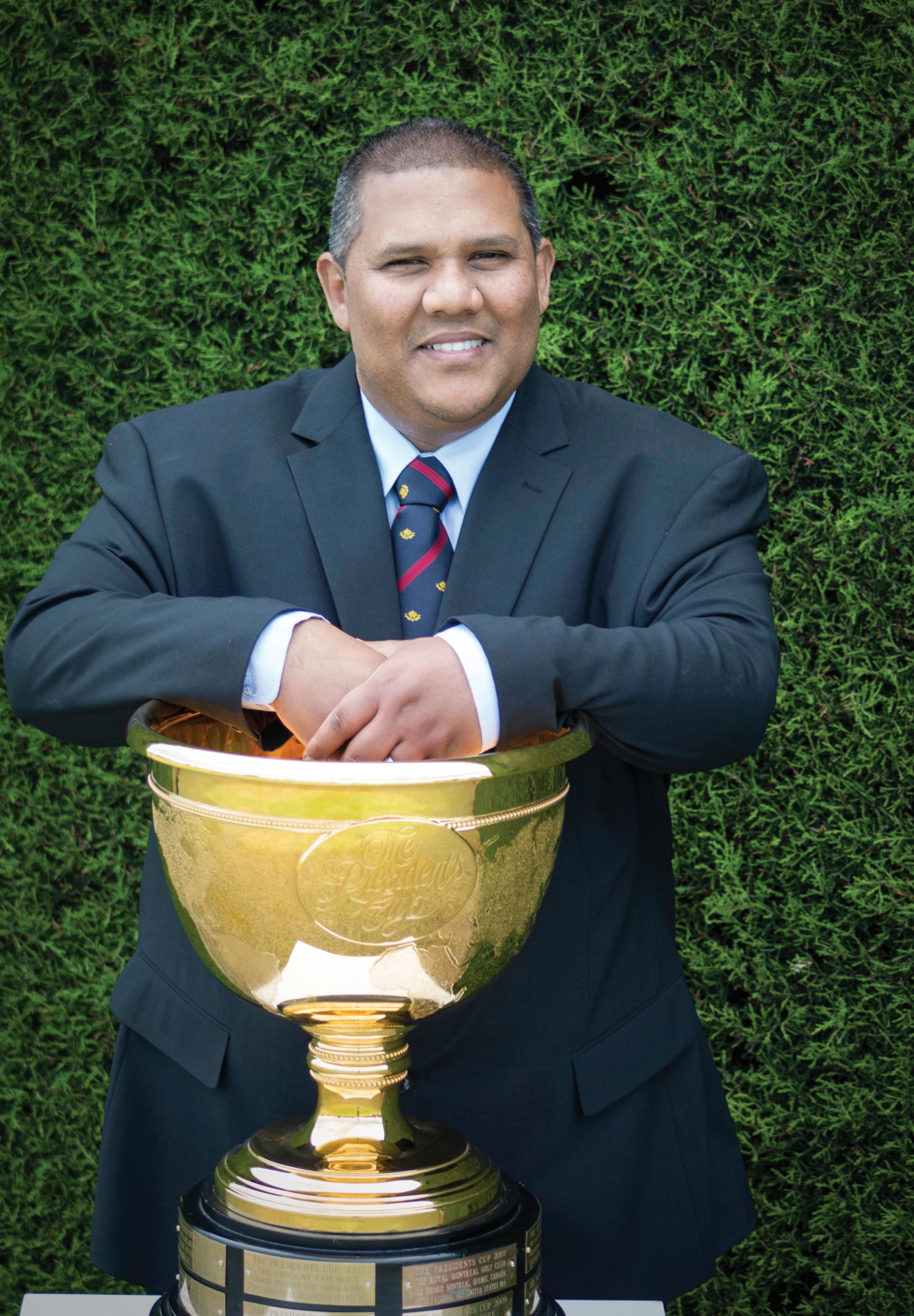


ANTHONY DOLE Executive Chef Royal Melbourne Golf Club MICHAEL RUGGIERO Executive Chef GlenArbor Golf Club JOHN CARSON Beekeeper Sebonack Golf Club NOW A BIANNUAL COLLECTABLE MAGAZINE SCOTT HAEGELE Director of Culinary Operations Royal Poinciana Golf Club GOLF KITCHEN PUNTA MITA 2019 WHAT’S COOKING At the Ann Liguori Charity Golf Classic? THE FIFTH ELEMENT OF TASTE SEPTEMBER 2019 - FEBRUARY 2020 CLUBHOUSE COCKTAILS subscribe | www.golfkitchen.com THE CULINARY MAGAZINE FOR THE PRIVATE GOLF CLUB, COUNTRY CLUB & GOLF RESORT ENTHUSIAST NEW RECIPES AND DESSERTS
Golf Kitchen Magazine is a biannual publication of Golf Kitchen LLC. Copyright 2019. Print subscriptions are available at www.golfkitchen.com for $59.99 per year.
All rights reserved in all countries. Contents may not be reproduced in any manner without written permission of Golf Kitchen LLC. Golf Kitchen LLC does not necessarily agree with the viewpoints expressed by our contributing writers of articles and advertising copy.
Golf Kitchen welcomes letters to the editor at info@golfkitchen.com
GOLF KITCHEN
Magazine
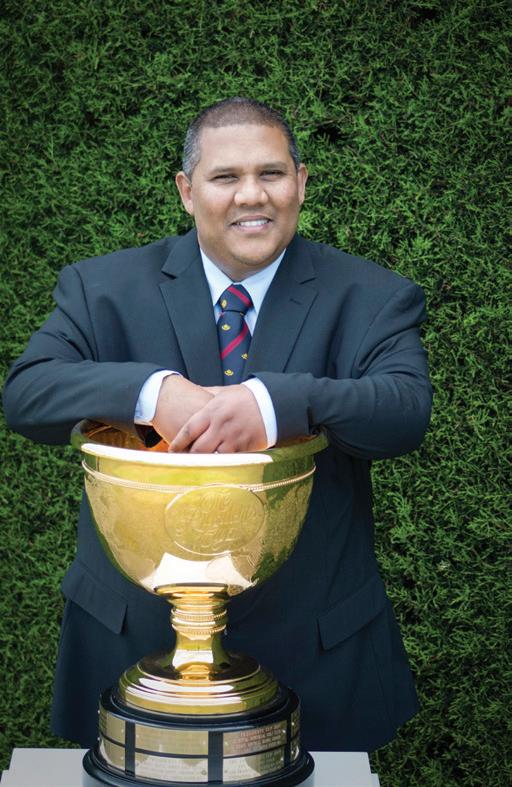

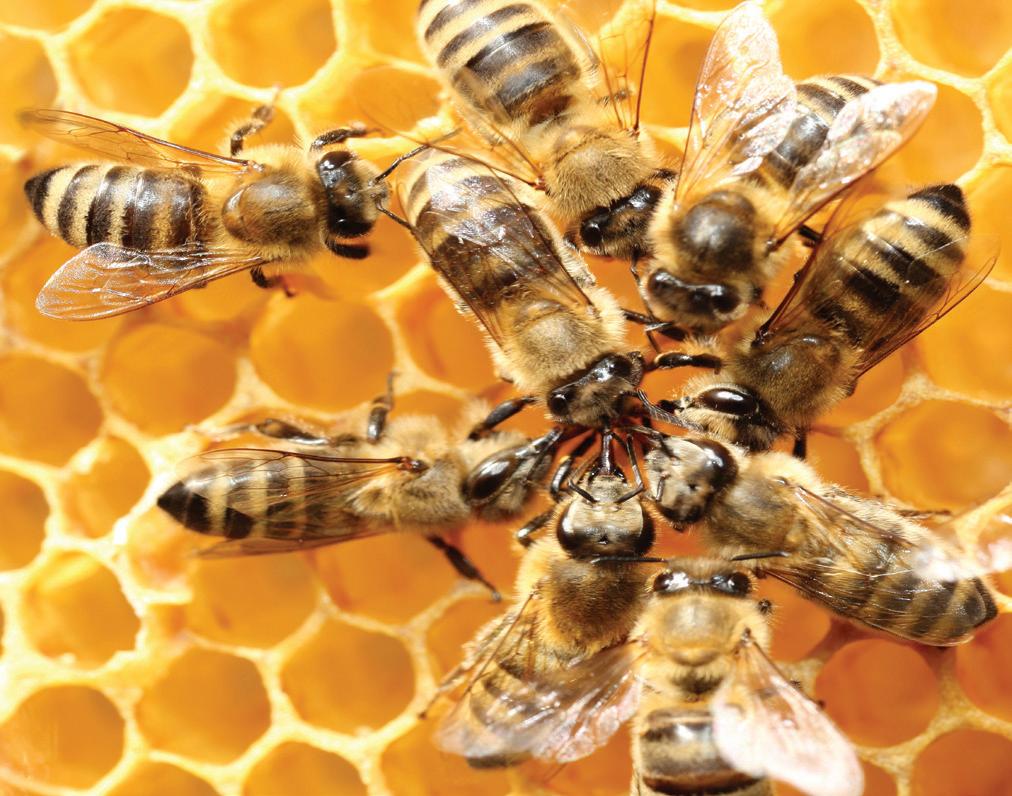

38 14 14 SCOTT HAEGELE DIRECTOR OF CULINARY OPERATIONS 38 JOHN CARSON BEEKEEPER 48 MICHAEL RUGGIERO EXECUTIVE CHEF CONTENTS AUTUMN | WINTER, 2019 86 COVER STORY: ANTHONY DOLE EXECUTIVE CHEF 48
GOLF KITCHEN PHOTOGRAPHY

INFO@GOLFKITCHEN.COM
70
GOLF KITCHEN
PUNTA MITA 2019

110
THE ANN LIGUORI FOUNDATION CHARITY GOLF CLASSIC 124
CLUBHOUSE COCKTAILS
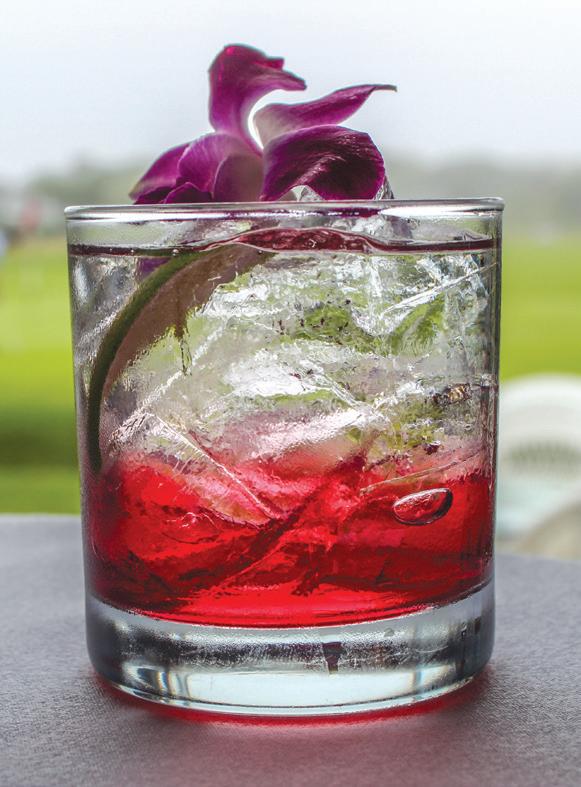
126
THE FIFTH ELEMENT OF TASTE

70 114 124
CONTENTS

CONTRIBUTORS
Bill Nestor brings a diverse background as a freelance contributor to Golf Kitchen.
An earlier career devoted to academia and experiential learning, teaching and leading travel studies initiated a life long pursuit of investigating environments and people worldwide. Communicating his observations and experiences has evolved to its present-day style as a freelance writer exploring the globe to create travel, food, nature, golf, and lifestyle stories.
Nestor’s narratives have appeared in a variety of print and online publications including: Golf Kitchen, Go Golf & Travel, Golf-Styles, Cigar Aficionado, Nature Travel Network, Mexico Report, Sustainable Land Development and bilingual Punta Mita Living, Sayulita, St. Regis Punta Mita, and Mayakoba magazines.
Bill is the former publisher and editorial director of Divot’s upscale regional golf lifestyle magazines. He previously worked with New York City publishers Gruner & Jhar, Miller Freeman, and the New York Times magazine divisions; and Golf Digest in CT.
Bill taught natural history ornithology, and environmental studies at Antioch University New England and New England College where he developed, led and instructed field studies and extended travel explorations: Natural History/Florida Everglades by canoe, Birds of Texas
& Mexico, American Southwest/ Nature & Culture, Ecological Sailing Study/Key West to Nature & Culture, Ecological Sailing Study/ Key West to Honduras, Birds of Gaspe & Canadian Maritimes.
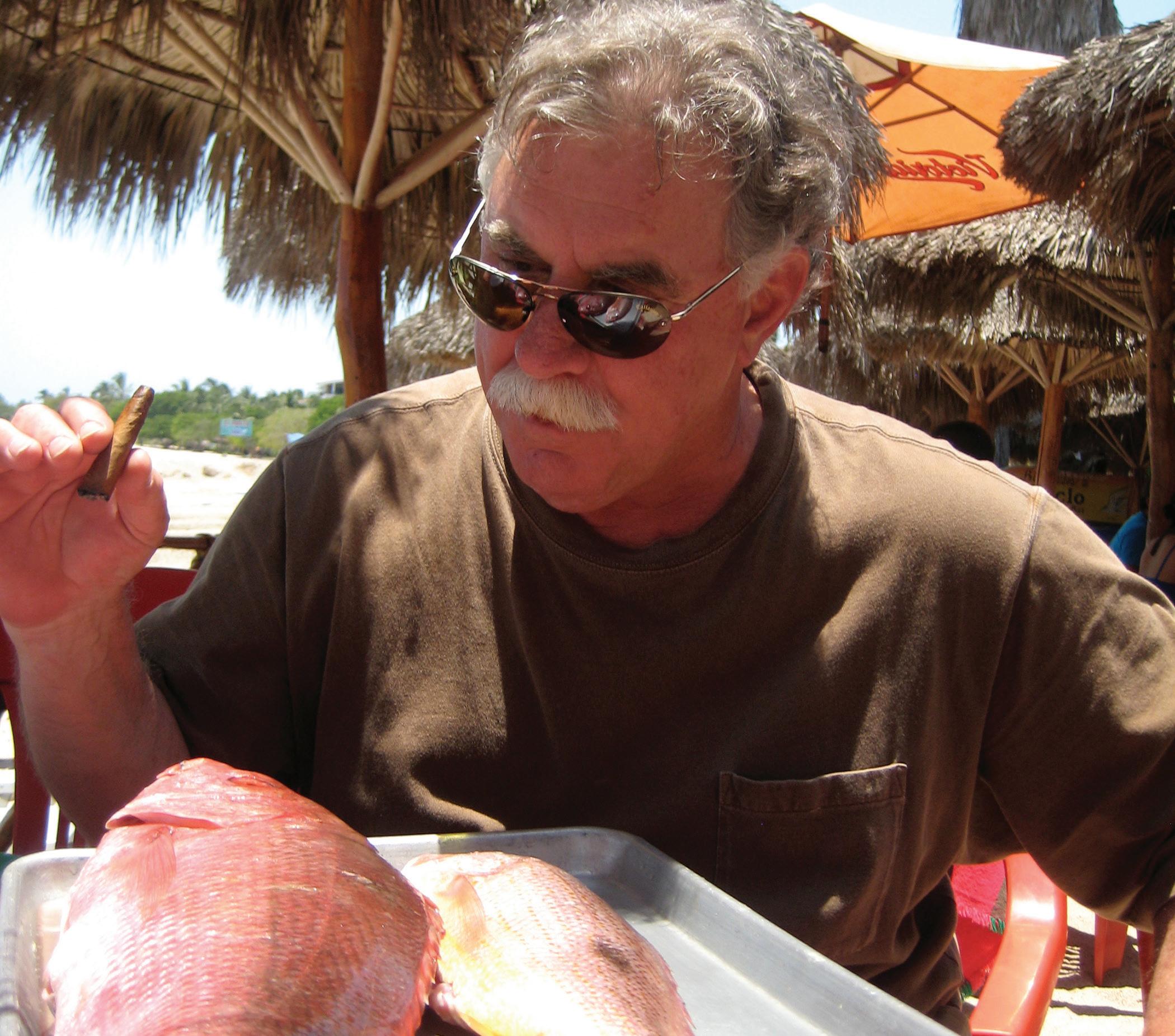
He is a member of the Golf Writers Association of America (GWAA); International Food, Wine & Travel Writers Association (IFWTWA) and the Metropolitan Golf Writers Association (MGWA).
Bill lives in a Vermont hilltop home. He enjoys being a husband, father and grandfather, playing golf, mountain sunrises, ocean sunsets, moonlit star-filled nights, and traveling internationally to sample tasty culinary magic.
Contact:
Email: nestor@sover.net
Social Media:
Instagram: @billnestor3888
Twitter@nestor1847
Facebook: facebook.com/bill. nestor.3
Golf Kitchen Magazine 8


® #WEARYOURTRAVELS EXPERIENTIAL JEWELRY ® HANDMADE WITH SAND & NATURAL ELEMENTS FROM AROUND THE WORLD. Discover The Hamptons Rope Collection, a creative collaboration between Ann Liguori & Dune Jewelry



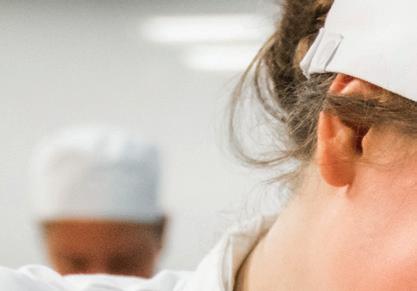



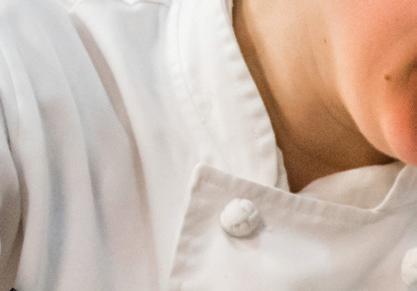
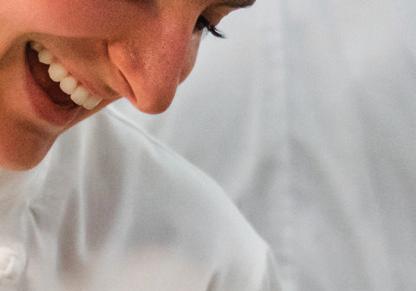
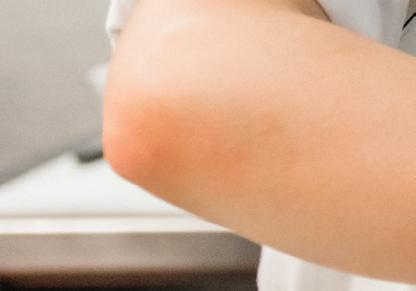


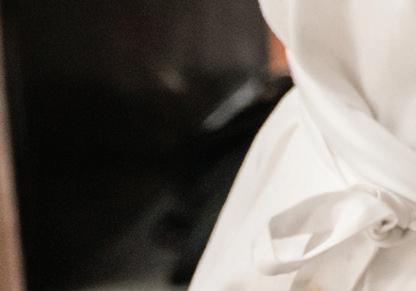
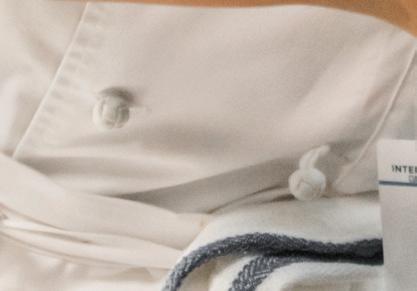
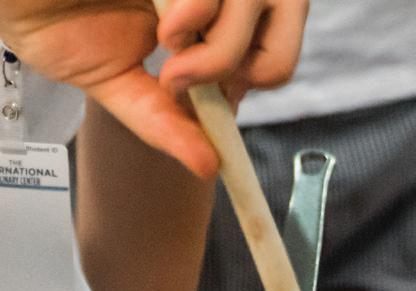


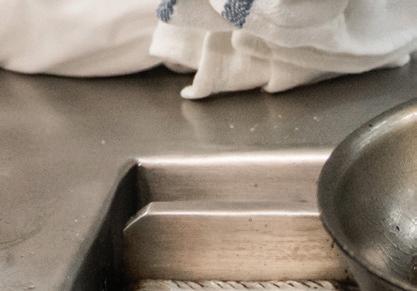
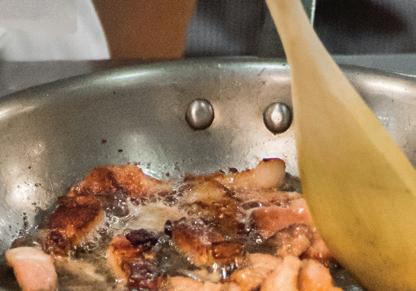






Guest Editor
Flo Nestor was an elementary school educator for 41 years. She designed, developed, taught and implemented environmental education programs, and gifted and talented curricula with an emphasis on theater, literature and creative writing. Her interest in travel began in the 1970’s while leading teens on extended adventures in the North America and Europe.

Flo enjoys family time, living in Vermont, photography, gardening, cooking, reading, writing, and traveling.
Contact: Email: flo@sover.net
Special Thanks to our Photographers at Punta Mita.
Pedro Arias
Ulises L. Guerrero
Favia Cruz Mercado
Writer
Natalia Fedra Cabrera Mercader is the Founder of Khayyan Specialty Foods. She is a producer of real food and ingredients grown by local farmers in Spain which are packed by the source. She is also an importer of Spanish Olive Oil and Specialty Vinegars. Her brands can be found at some of the finest restaurants and private golf and country clubs across the North East of America and abroad.
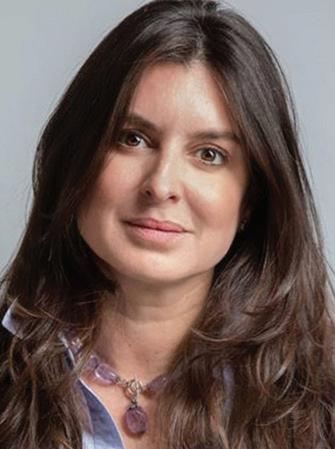
Natalia is a regular and valuable contributor to Golf Kitchen writing focusing on new and authentic produce.
Khayyan’s brand of Olive OilSanta Maria was awarded Gold at the 2019 World Olive Oil Competition.
Contact:
Email: natalia@khayyan.com
Web: www.khayyan.com
Photographer
Fiedler discovered his talent and passion for photography more than 30 years ago aboard a Navy aircraft carrier. While traveling the world and experiencing the diversity of many cultures, he was naturally drawn to chronicling the experiences of people, especially in their vocational settings, telling their story through his images.
Fiedler has a distinct documentary style, often using available or low light, creating pictures with a more intimate, realistic feel. His photographs are visual representations of the message his client wants to convey. Whether photographing a CEO in a board room or a farmer in the field,he can capture their individuality and uniqueness of their lives.
Most recently Fiedler published his first book titled Working Journal, which has been featured in Forbes Magazine, Downtown Magazine, Fox News and more.
Contact:
Email: Michael@MichaelJFiedler. com
Daniel Gonzalez
Web: www.working-journal.com
 Photographer at the Ann Liguori Foundation Charity Golf Classic.
Photographer at the Ann Liguori Foundation Charity Golf Classic.
CONTRIBUTORS
FROM THE EDITOR
Welcome back!
It has been quite the journey getting to the first biannual edition of Golf Kitchen Magazine. With events, awards, and the upcoming book release, there have been a ton of challenges, but here I am excited for our subscribers to receive this issue.
It was an absolute pleasure working with Anthony Dole, Executive Chef at The Royal Melbourne Golf Club in Victoria, Australia earlier this year. We had the opportunity to take a photograph of Chef Dole with the Presidents Cup for a very brief period, and what fun we had! I think Chef Dole is the only chef on the planet to have a cover shot with the cup. Thank you, Andrea Watson and team. Dole’s story is heartfelt, and his recipes are sure to please.
Michael Ruggiero, the Executive Chef at GlenArbor Golf Club, presented some visually stunning and yet simple to create recipes for all to enjoy. I particularly love the Iberico Ham Crostini, #yum. Not only is Ruggiero a featured chef, but he was also the host chef at the Golf Kitchen Culinary Excellence Awards that took place on August 19th, 2019 at the club. The event went very well with Executive and Sous Chefs from The Tuxedo Club, Royal Poinciana Golf Club, Westhampton Country Club and Downtown Boqueron by Chef Jose Carles, collaborating on a menu that impressed the members and guests.
I was fortunate to work with Scott Haegele, the Culinary Director at Royal Poinciana Golf Club in Naples, Florida, in June. I was taken aback by his passion and also his support for his staff. He is a real mentor-chef in the industry and very humble. I am proud to have Haegele join the Golf Kitchen family and look forward to working with his team well into the future.
Golf and Lifestyle writer and regular contributor Bill Nestor takes us on a journey into this year’s Golf Kitchen Punta Mita event. I am proud to have held this event in Punta Mita for two years. It has undoubtedly bonded many of our chefs for a lifetime.
Ann Liguori, well-known Sportscaster, invited me to the Ann Liguori Foundation Charity Golf Classic, which was held at Westhampton Country Club in Westhampton Beach, New York on the 19th and 20th June. The event is in its 21st year and had a fun golf tournament and also some fantastic fare.
It is always a great delight to visit my dear friends at Sebonack Golf Club in Southampton, New York. On this trip, I was thrilled to interview John Carson, the Beekeeper who takes care of Mr. Pascucci’s hives and honey production at the club. It is fantastic to watch Sebonack and team continue to be stewards of the land.
Thank you to all who have helped us on this journey, it is truly a global effort making Golf Kitchen develop.
Diana DeLucia, Editor in Chief diana@golfkitchen.com

Golf Kitchen Magazine 12
Farmer Lee Jones


Royal Poinciana Golf Club Naples Florida

 Back view of the clubhouse from the 18th hole with a Blue Heron at sunrise.
Image by Stephanie Starr
Back view of the clubhouse from the 18th hole with a Blue Heron at sunrise.
Image by Stephanie Starr
Scott Haegele Director of Culinary Operations
I was introduced to Royal Poinciana Golf Club by Scott Garvin, the General Manager at Naples National Golf Club, Florida. Garvin had recently toured the club and was taken aback by the kitchen rebuild as well as the culinary team. I took his advice and headed to Naples. Scott Haegele the Director of Culinary Operations at RP gave me a tour of what I can only call - every chef’s dream kitchen. ~ Diana
DeLucia
GK: Scott, where did you grow up, and what influenced your culinary aspirations?
I grew up in Damascus, Maryland, in the most northern part of Montgomery County. It was a tiny dry town with a lot of farms and churches. My mom always cooked and from a very young age, I would watch her, and then I would emulate what she did visually. Eventually, I was able to cook dinner, and I enjoyed working at the stove. I was still in school when I started working in a small mom and pop restaurant, and coming from Maryland, they cooked seafood and steamed blue crabs. That’s where I began my career; I loved interacting with people and learning about the restaurant business. I started out washing pots, and I worked my way up through the kitchen. I did that through high school. I had no desire to go to college, that wasn’t my path, but my sister said, “you know, I know this guy, he went to culinary school, and maybe it’s something you should consider doing.” I took my sister’s advice and enrolled at Baltimore’s International Culinary
College. I did a two-year program there. I had a natural knack for cooking, and I wanted to continue to learn and do an apprenticeship program. I looked at Hotel Hershey, I looked at The Greenbrier and interviewed at both, and I chose the Greenbrier. The Greenbrier is an extraordinary place, and I loved the culture and the hills of West Virginia. When I was very young, I was told, “you don’t get good to work in good places, you work in good places to get good.” There’s much humility in that. You have to work hard, you must be able to take criticism well, and when you get knocked down, you get back up and keep driving forward. Many chefs come out of the Greenbrier and are doing well in the industry.
GK: What was one of the essential lessons that you learned at the Greenbrier?
The Greenbrier is where I learned how to cook and sharpened my culinary fundamentals. The hotel is a great training environment for an aspiring chef. The hotels back of house was extremely large and the processes of moving things around the kitchen are vitally important. How do you move goods coming in, food going out, people, dishes, equipment, you know, where’s it all stored, what’s the flow of how we do business every day? I learned all of this at the Greenbrier. In any good resort or hotel, you shouldn’t see your dirty laundry. We know great
Golf Kitchen Magazine 16
INTERVIEW

Royal Poinciana Golf club 17

Golf Kitchen Golf Kitchen Magazine 18
The view of the 18th hole at the Cypress Course.
Painting by Graeme Baxter
things are going on behind the doors, but we don’t know how it happens when you’re sitting in the dining room from a guest’s perspective or a five-star, five-diamond perspective. When they come and inspect your hotel or your operation, it should be flawless. It shouldn’t be, “oh, I see the broom in the corner where you’re going to clean up later.” Everything should be impeccable.
GK: How long did you stay at the Greenbrier?

Eight years. I did my apprenticeship for two years, and then I worked through the ranks of the kitchen to sous chef. I left the Greenbrier in my late 20’s and headed to New York City. I have always taken the posture of a student and thought that working in Manhattan would be a good training ground. I first worked at the iconic Tavern on the Green restaurant. It was a culture shock coming from the hills of West Virginia, and I took the position of Executive Sous Chef. The restaurant was bustling and gave new meaning to the term high volume. We did omelets for 1000 people every Sunday brunch off the a la carte line, and the French Fries were hand-cut, we would fill 50-gallon rubber trash cans with cut fries and soak them in water until we had to cook them. The owner at the time was Warren LeRoy; he was a shrewd businessman. It was my first experience working in a multi-culture kitchen, and I loved the people I worked with.
My second stop in the big apple was at the famed Waldorf-Astoria hotel. I worked in the fine dining restaurant Peacock Alley for Chef Laurent Gras, he was a French chef with Michelin experience, and he was Alain Ducasse’ Chef de cuisine. Laurent was super talented and worked every day in the kitchen. His station was right in front of me, which was a little nerve-racking. His food was classic French with much influence from Ducasse. We worked with the best ingredients, such as Osteria caviar, fresh truffles, and foie gras. I respected Laurent’s work ethic; if a cook called off work, he would work the station himself. He worked meticulously clean and efficiently; there was no margin for error with Laurent. He taught me how to cook refined food and the focus that is required in that environment. His kitchen was spotless,
19
Royal Poinciana Golf Club
required in that environment. His kitchen was spotless, and we spent as much time cleaning as we did preparing food. My only regret is that I didn’t spend more time working with him, but this experience left an indelible impression on me about cooking food at a high level and the commitment it requires.
After leaving New York, I returned to the Greenbrier to be the Chef of the Tavern Room, which was the hotels fine dining outlet. During my two years there the restaurant was awarded the 4 Star Forbes rating. This was an accomplishment I was proud of and owed to my previous mentors.
My formative years working in quality environments prepared me to join my mentor John Johnstone once again. I took the position as the executive sous chef during the opening of the Ritz Carlton at Reynolds Plantation in Greensboro, Georgia, and after a year I became the Executive Chef.
It was the Ritz Carlton that taught me how influential culture is at a resort or hotel. There must be guiding principles. Although you had your department, everybody had each other’s backs. If I needed help from another department, we
made it happen. It was a reciprocal relationship; we did whatever we needed to do to ensure the guests had a great experience. I appreciated the array of incredibly smart people in that company. Steven Freund was the General Manager at the time, and he was a great man. He had humility, and this executive presence, he knew every person by name and had a genuine interest in helping people grow in the front or back of the house.
After five years at Reynolds Plantation, I took an ambitious position at Casa Marina, which at the time was an LXR property owned by Blackstone in Key West, Florida. They had invested heavily and redid the entire property. My position was the Food and Beverage Director / Chef. It was here that I learned how to set up a restaurant from scratch; I learned how to plan the flow of service during the design stages. The General Manager was Kevin Speidel was from New Jersey and was the captain of the wrestling team, that was his persona, he was a go, go, go, guy! Kevin took no excuses, but he was also very fair, if he ever called you out, it was the truth; he cared about making things better. No matter what you do in life, long term, it may not be what you want to do, but I think some people come into your life that you learn from
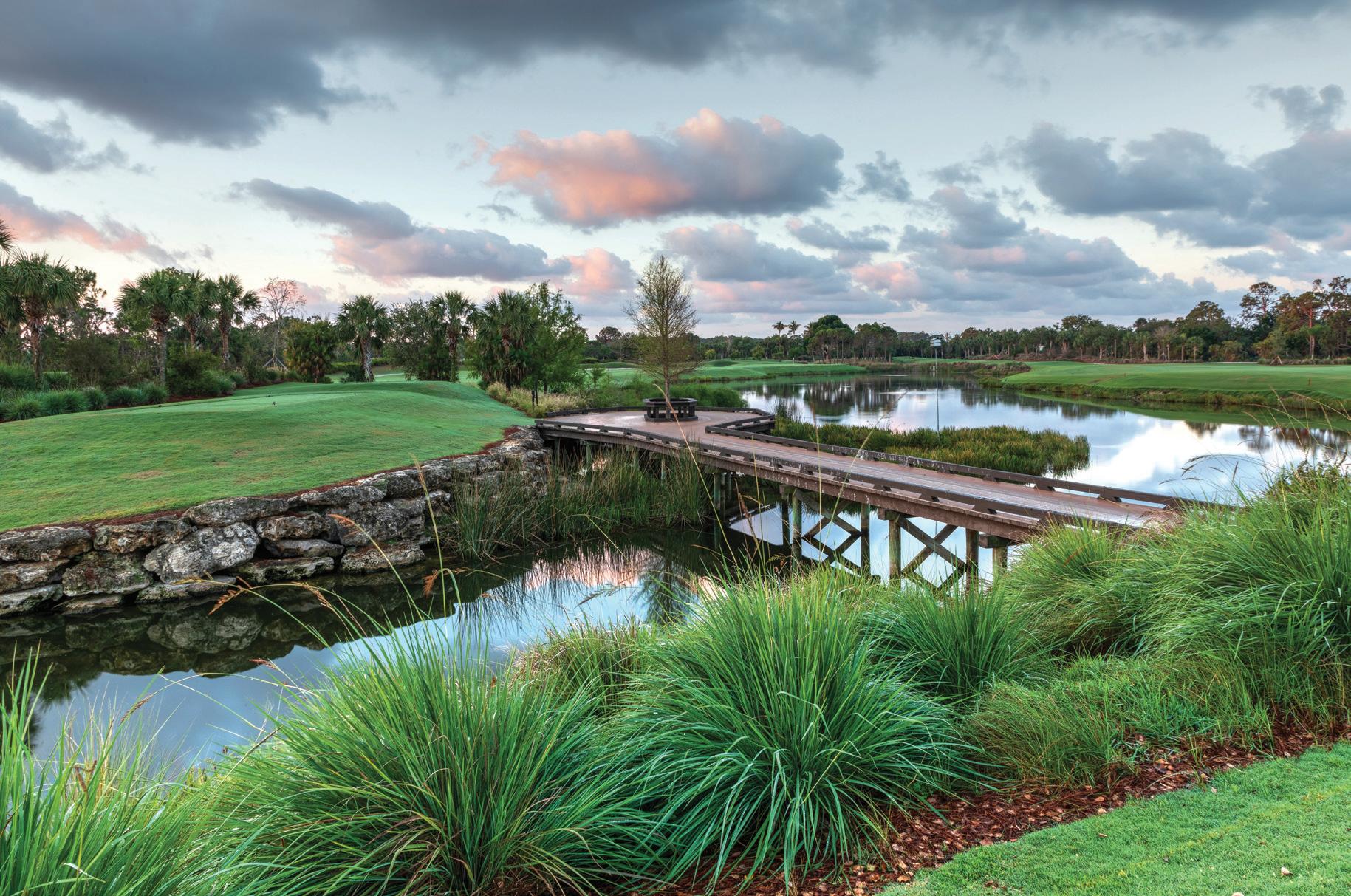
Golf Kitchen Magazine 20
The 18th hole and the bridge of the Pines Course at sunrise. Image by Stephanie Starr
and you have to be open-minded enough and humble enough to, to see where your defects are to improve. My biggest takeaway from Casa Marina was the front of the house experience. I learned how to manage the international staff who were all on H-2B visas. I was working with people from all over the world whom all came from different cultures; it was great.
GK: When did you join the club industry?
I took a position with Club Corp at the Citrus Club in Orlando; it was at the top of the Citrus Center and had 360-degree window views, it was beautiful, but for me, it was a city club, and I needed to continue to grow.
GK: How did you land at Augusta National?
In 2011, John Johnstone gave me a call and said that Augusta National was going through a tremendous growth spurt. John Johnstone is, in my opinion, one of the best Food and Beverage professionals I have ever worked with, and I owe him a debt of gratitude for nurturing me in my career. Everything about Augusta National is about growing the game of golf. What’s unique about the place is that people have worked there for their entire career. They grew up across the street, and they have seen the town and club evolve, they’ve been a part of that, and they take much pride in working there. The tenured staff are true ambassadors of the community. To make significant changes for the club and the tournament, they had the vision and foresight to see that they needed to bring in professionals that knew how to manage the expansion.
It was an exhausting four years. However, in the end, it was remarkable what we created there. There’s a reason why Augusta National is the number one Platinum Club, they have such integrity in what they do, and they have the resources to do it. They are committed to executing at a high level. That whole experience was outstanding.
GK: What did you leave behind at Augusta National that makes you particularly proud?
I think the most important thing is a good culture and a significant improvement to
the food and beverage experience. I was the Executive Chef, and I was involved in the opening of Berckman’s Place. Berckman’s place is like walking through a museum full of the history of Augusta National and the people who made it what it is today. They have a retail store, a southern restaurant Ike’s, a burger bar Calamity Jane’s, a Scottish pub McKenzie’s, The Pavilion restaurant, and the New Orleans Restaurant Augusta. This was all built for membership use. They bring their guests and watch the game, eat excellent food paired with wines and beverages, and they enjoy the experience of being at the Masters It is a genuine bucket list item for most people.
I would be remised if I do not give accolades to Chef Roberto Bustillo, who was instrumental in helping me open Berckman’s Place. Roberto has now taken over Berckman’s Place as the Executive Chef.
Under the tutelage of John Johnstone, the Director of Operations & Jim James, the Senior Director of Operations, I learned about planning from looking at blueprints and trying to envision what everything will look like when it is complete. It required much forward-thinking. We were working with kitchen designer David Chislett from Ricca Design Studios from New York; it was a great relationship.
Royal Poinciana Golf Club 21
“ There’s a reason why Augusta National is the number one Platinum Club, they have such integrity in what they do, and they have the resources to do it. They are committed to executing at a high level. That whole experience was outstanding.”
We collaborated as far as how everything was going to flow and ultimately if the result is two inches too short when you’re building, well, you only get one chance to get it right. The process was educational, and there was so much to be orchestrated; communication was vital.
Managing all the equipment to put into a kitchen was another huge process as was how the food comes in and the flow of people. The place is only open for a week! How do you we get a restaurant up and running in two days, staff have to be prepared efficiently and quickly. We had to bring in 1200 food and beverage professionals to help us. I had 50 sous chefs coming in, and these were all people that are at my level. It’s stressful to get staffing because you’re asking a lot. You’re asking somebody to
must be impeccable.
GK: Tell us about Royal Poinciana Golf Club.
I got the position here through a Search firm; they’re a good source at my level; it’s the best way to find opportunities other than word of mouth. Naples is beautiful. It’s a great environment. At Royal Poinciana, I have room to grow, at Augusta, I would have retired as an Executive Chef as its very golf-centric. RP is a social club, and if you’re looking at being a General Manager in the future you’re going to deal with committees, and you’re going to deal with some different governance issues that you can apply in a lot of different jobs. That’s what attracted me here. I am studying a four-year degree in hospitality management online, and I am a member of the CMAA (Club Managers Association of America) The club is very supportive of my aspirations. Coming here to build the new kitchen in itself, was a huge draw. I learned a lot at Augusta, but I wasn’t running the project, I was number two, but now I have taken all of that experience to build the new kitchen here, and it has been my project. That propelled me forward.
GK: How long did it take you to design the layout?
come for a week and a half, and they’re using their vacation time or taking time off from their job. There are so many balls to juggle during planning and execution of the Masters Tournament I could go on for hours!
GK: What about the rest of the year at Augusta?
The club operations are minimal at Augusta; there are two business models. There’s the tournament, and then there are club operations from 15th October through 15th May. There might be 120 for lunch and no more than 60 for dinner. We have cottages on the property where members can stay, and, it is a very controlled environment. We know who’s coming, they have to make a reservation. They come to Augusta to play one of the best golf courses in the world, and the facility, the service, and food must be
I partnered with Eamon Murphy, who was the former Assistant General Manager at Mirasol, and he had been heavily involved with the renovation at Mirasol. Eamon had the front of the house expertise, and I had the back of the house expertise. It was a real pleasure working with Eamon. We selected Cheney Brothers as the Kitchen Designers, and Don Garrett was the General Contractor. Everybody had a real connection to this project. It took a year to design and we vetted it again and again. We have improved the usage of the club tremendously. The members love the changes and are spending more and more time at the club.
GK: Tell us about the food at RP?
Food and beverage are becoming more and more critical at golf and country clubs in general, just as important as the golf course. Think about it, you are playing golf, or you’re inside the clubhouse. RP’s club membership is very well-traveled. They have the means to
Golf Kitchen Magazine 22
“When you have a clear idea of the front and back of the house, it helps you to understand the flow of the business and its ever-changing needs.”
 Left to right: Head Chef Harrison Runyon, Head Chef Michael Mueller CEC and Director of Culinary Operations, Scott Haegele.
Left to right: Head Chef Harrison Runyon, Head Chef Michael Mueller CEC and Director of Culinary Operations, Scott Haegele.
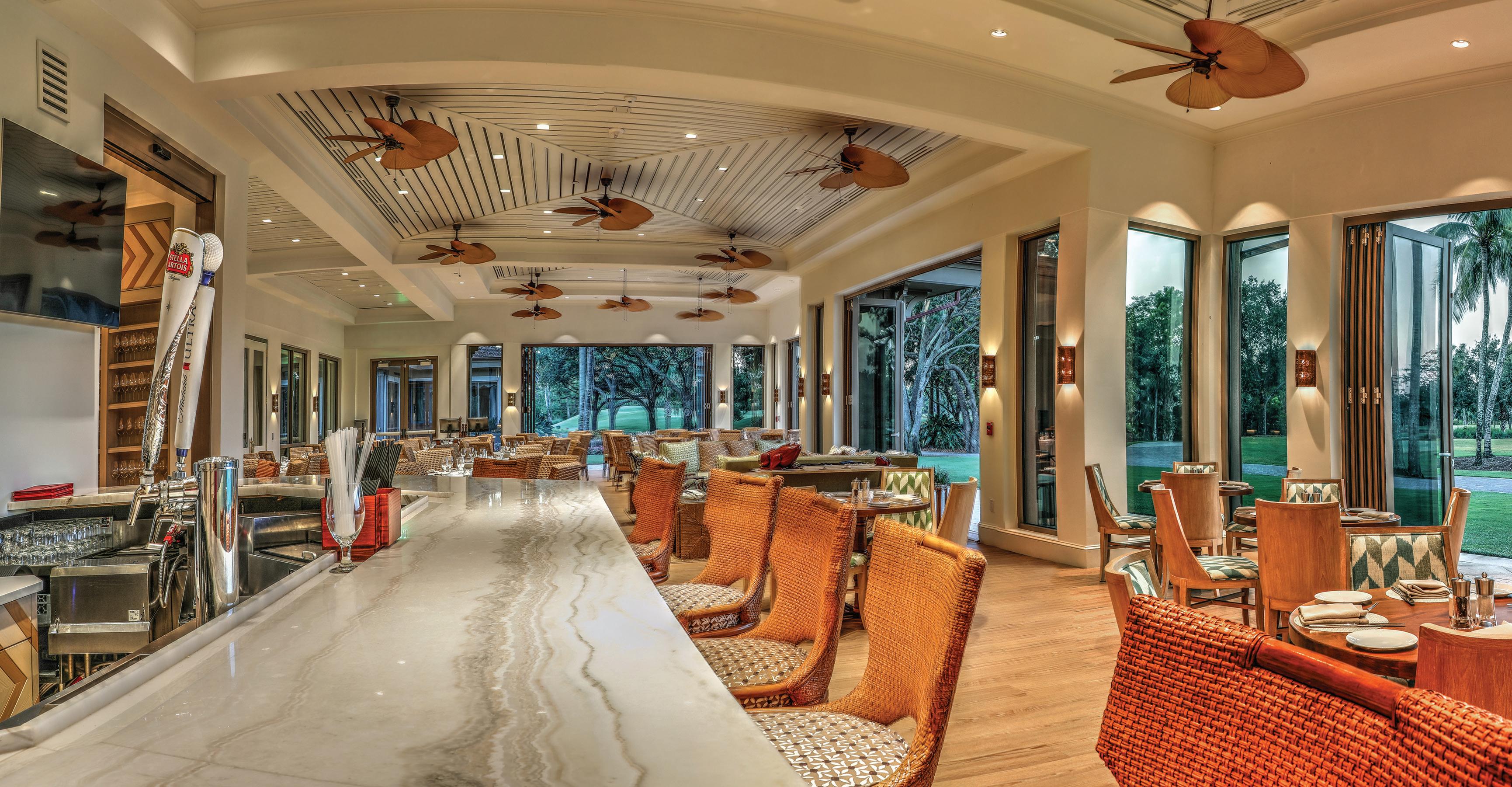
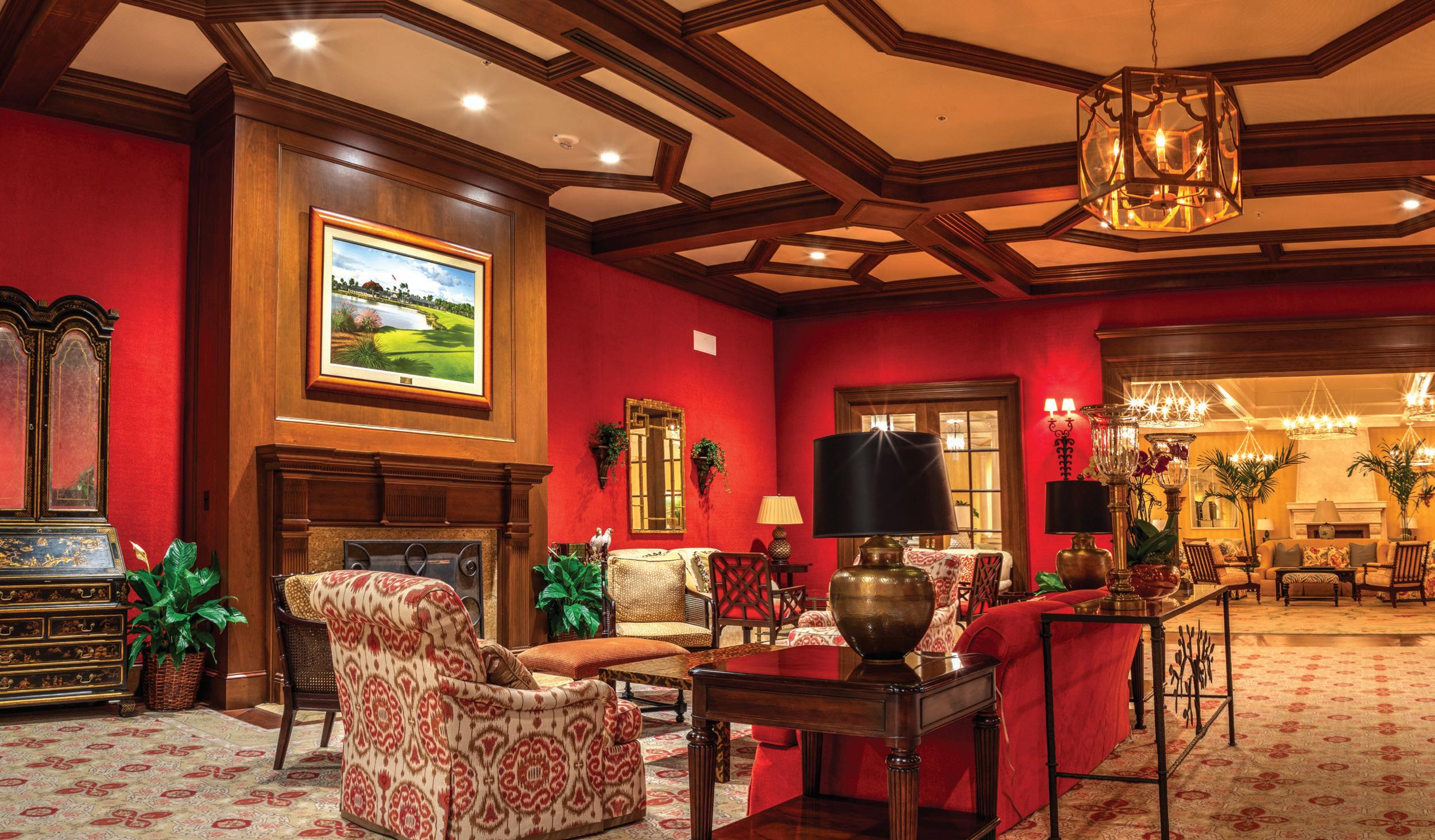
Golf Kitchen Magazine 24
The MDC Bar and Lounge within the Restaurant at Sixteen Hundred.
Image by Stephanie Starr
The Grame Baxter painting now hangs over the fireplace in the living room.
Image by Stephanie Starr
eat wherever they want, and they know what excellent cuisine is.

GK: Tell us some of the changes you have made.
We’re changing it from the clubby food to a casual restaurant that can compete with outside restaurants, that’s the expectation. I want to be our members first choice when they decide to eat out. There are still some traditional people that want liver and onions, and that is not a problem. I’ll do that for them. We have to provide that diversity and variety. I think sometimes we’re scared because in clubs, sometimes that minority voice is always listened to as if they were the majority. We listen to all opinions and make changes based on objectivity and good business sense. Complacency isn’t a good business decision. Building good relationships is vital; they start to trust you, and then it’s easier to make effective change. Trust is an essential attribute in a relationship. If you have that with people, they are more likely to forgive you when things don’t go 100% right.
GK: What do you hope to leave behind at Royal Poinciana when you become a GM?

I think, improving the clubs Food and Beverage operation and changing the culture is what I’m most proud of at RP. From the executives down, we all support each other. We work together, and it is rubbing off on the staff as well. They are proud to come to work every day, and they can provide for their families. It is a great place to work.
GK: Mentorship?
I want to be able to mentor others and help them to achieve their career goals whatever they might be. It could be an employee that makes soups for 15 years and retires or a restaurant chef who wants to become an executive chef. I
am very proud of my team, and I look forward to working with them every day.
GK: The membership?
The members here are so kind in their words and emails. They often send me handwritten cards to tell me how well we are doing, you know, it’s extraordinary, and I cherish that.I enjoy getting out in the dining room, building those relationships, and listening to them. That is how I learn what I need to change.
Royal Poinciana Golf Club 25
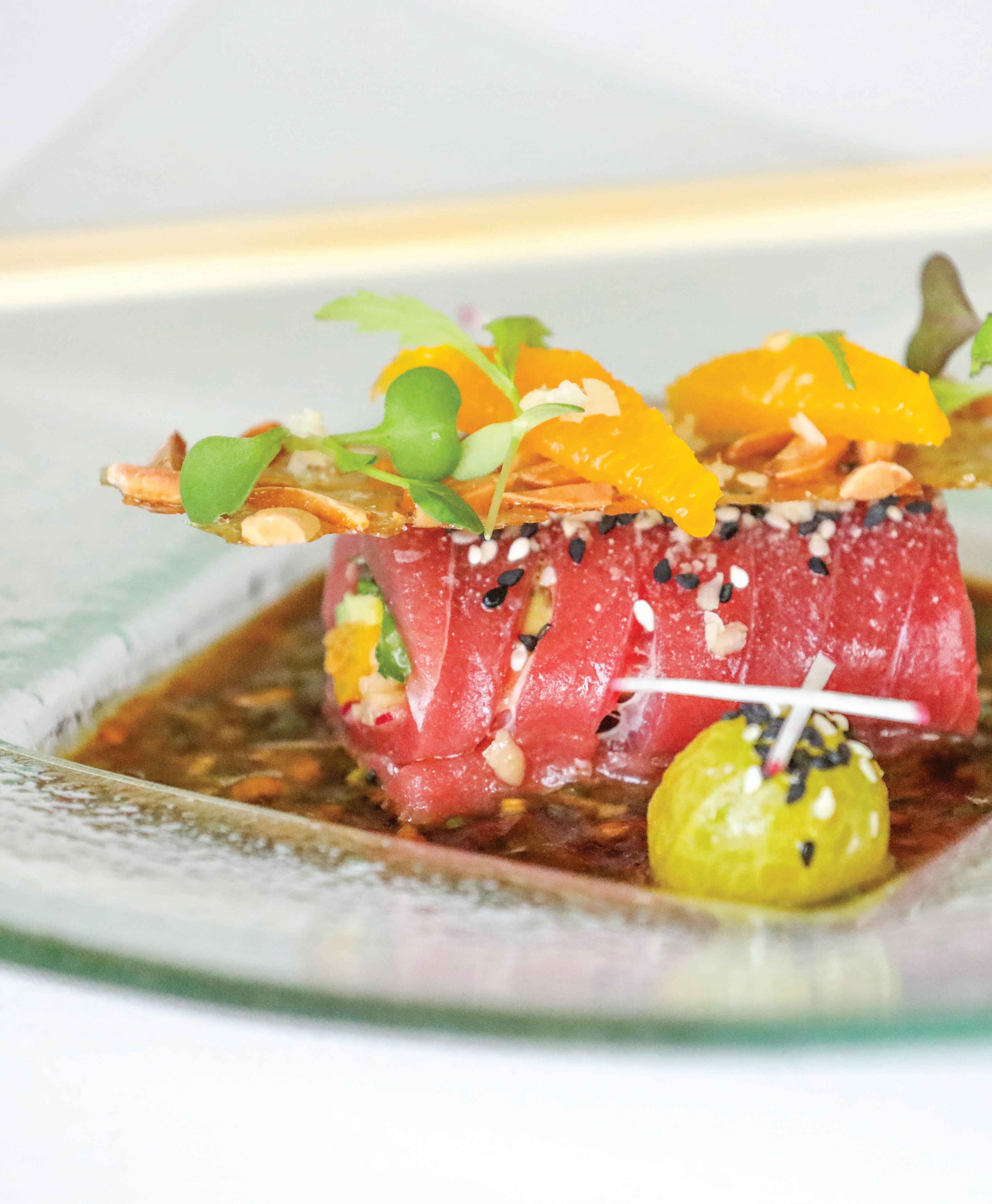
Golf Kitchen Magazine 26
TUNA SASHIMI with Avocado, Citrus, Almond Crunch and Tataki Sauce
Yields 4
Ingredients
Tuna Sashimi
• 6 ounces Tuna
• 1 Avocado
• 1 Orange (segmented)
• Cilantro Sprigs
• Olive Oil
Almond Tuile
• 8 ounces Florentine Mix ( available at Albert Uster Imports)
• 2 ounces Almonds (finely sliced)
• 2 ounces Cashews (finely chopped)
Salad
• Micro Salad
• 2 small Heirloom Tomatoes (peeled)
• 3 Orange Segments,
• 4 Cilantro Sprigs
• 2 ounces Radishes (julienne)
• 1 ounce Sesame Oil
• 1 ounce Sesame Seeds
• Lime Juice
Tataki Sauce

• 6 Tablespoons Soy Sauce
• 1/4 cup Mirin
• 2 Green Onions
• 2 Tablespoons Brown Sugar
• 2 Tablespoons Lemon Juice
• 2 Tablespoons Minced Ginger
• 2 large Garlic Cloves
• 1 ounce Cornstarch
Royal Poinciana Golf Club 27
RECIPE BY SCOTT HAEGELE
Preparation
Tuna Sashimi
Slice the Tuna into 4-inch by 4-inch strips (about a 1/4 of an inch thick)
Lay flat and add sliced avocado, orange segments, cilantro sprigs. Roll-up into small cylinders.
Trim the ends and reserve for plating.
Almond Tuile
Mix all ingredients together and sprinkle the mixture onto a Silpat in a rectangle shape 2-inches by 5-inches long. Bake at 350°F until golden brown. Allow to cool until crisp. Set aside.
Salad
Mix all the ingredients together in a bowl and season with sesame oil and lime juice.
Tataki Sauce
Mix all the ingredients into a saucepan. While whisking, heat slightly on the stove until they thicken and then allow to cool for plating.
Assembly
On a small coupe bowl (appetizer size) spread the tataki sauce on the bottom.
Lay the stuffed tuna roll on top of the tataki sauce. Top the tuna with the almond tuile and garnish with 3 orange segments, sesame seeds, micro greens. Place the two peeled heirloom tomatoes on either side on the tuna roll.
Garnish with sesame seeds.
Serve immediately after assembly.
Wine Match
Alsatian Riesling.

Golf Kitchen Magazine 28
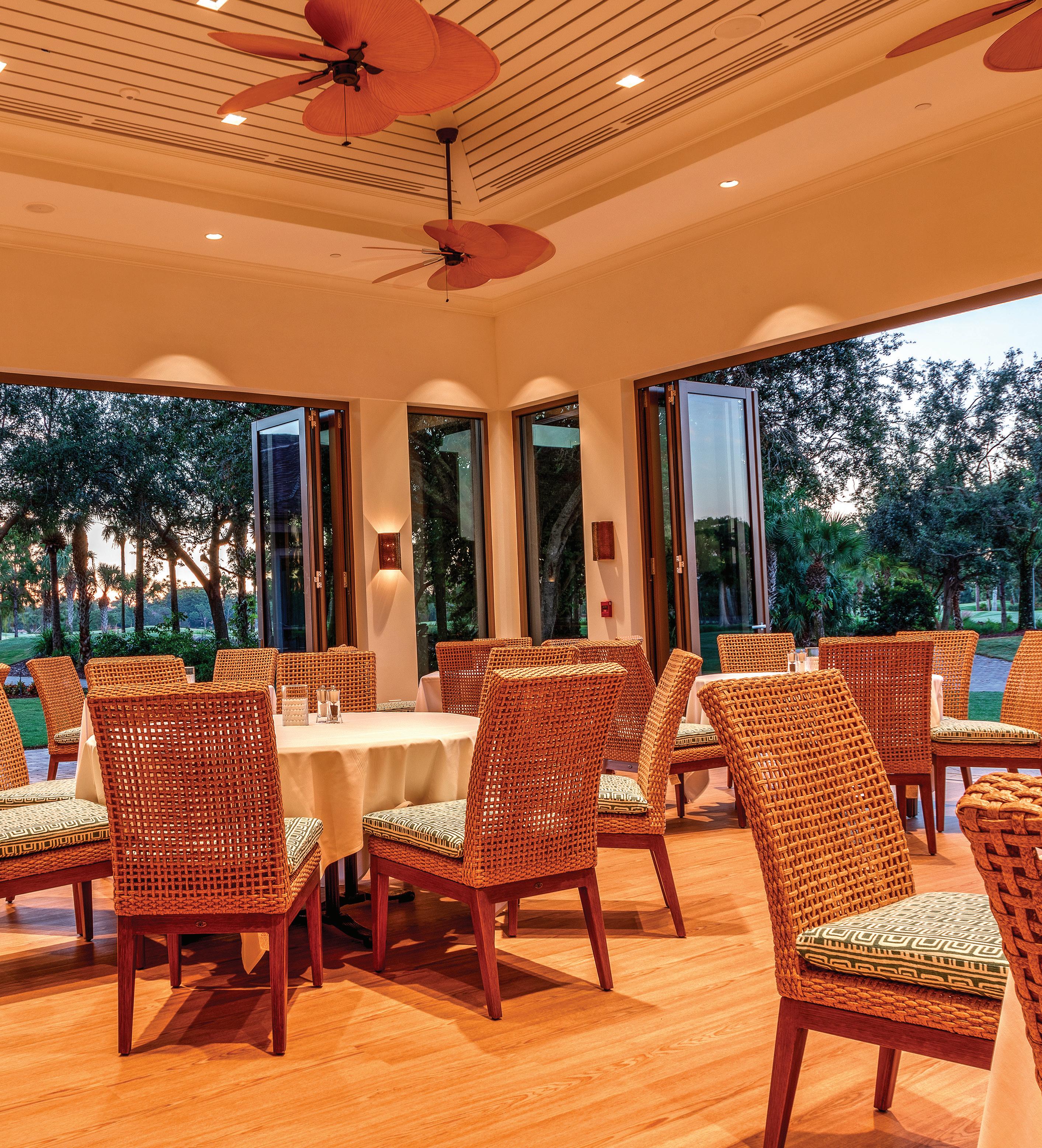
Royal Poinciana Golf Club 29
The Terrace at Restaurant at Sixteen Hundred.
Image by Stephanie Starr
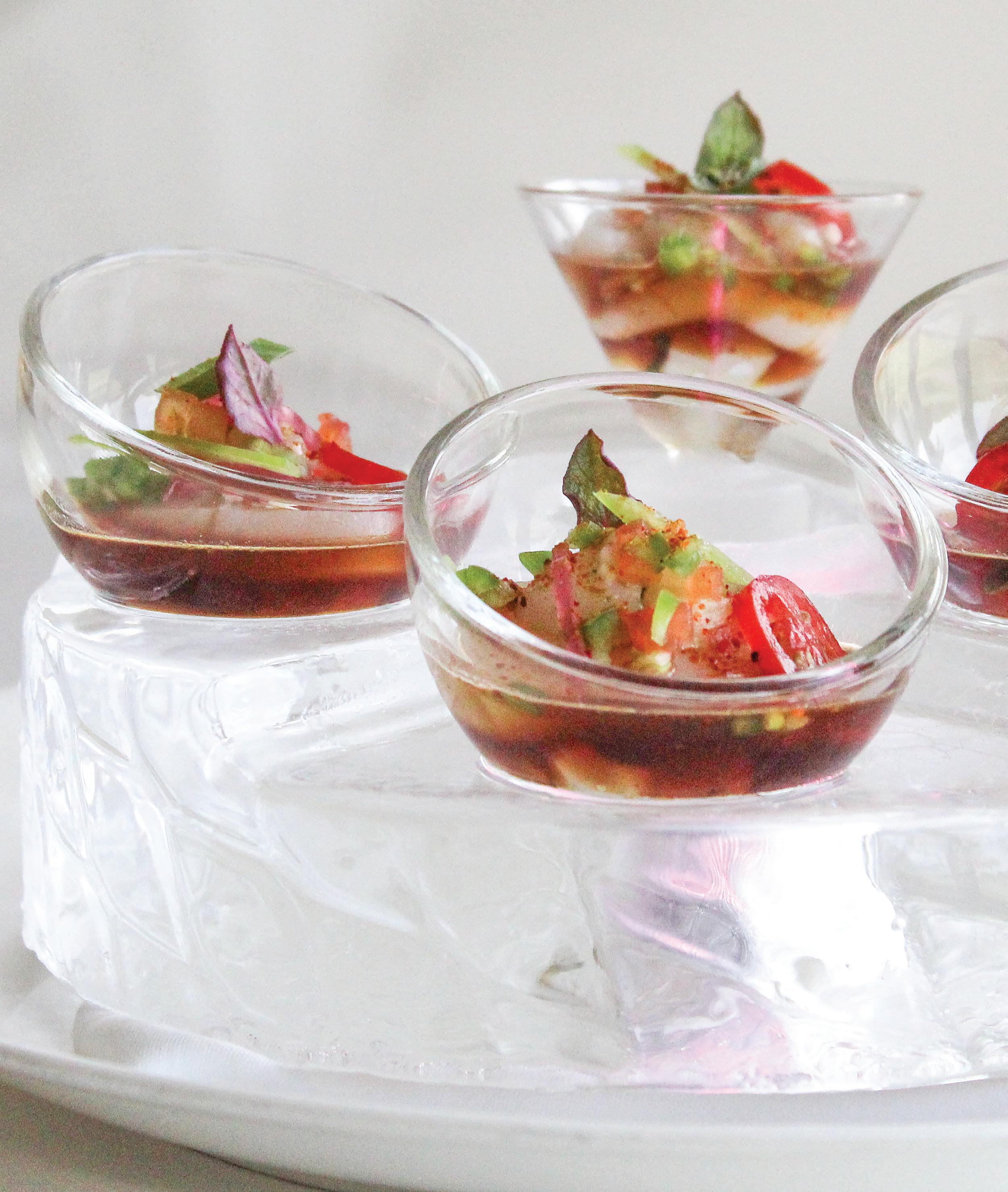
Golf Kitchen Magazine 30
RECIPE BY SCOTT HAEGELE
ASSIETTE of Chilled Sea Scallops Crudo Four Ways
Yields 1
Chef Note: You will need four 3 ounce glass dishes that can hold the scallops and marinade. These glasses need to be placed onto a 12-inch entrée plate for finale presentation. The ice plate was specially built for the presentation and is not necessary.
Ingredients
Scallops
• 4 Scallops (dry-pack)
• Fine Sea Salt
• White Pepper (freshly ground)
• Espelette Pepper
Scallop Marinade 1
• 3/4 cup Lemon Juice (freshly squeezed)
• 3/4 cup Lime Juice (freshly squeezed)
• 1 Tablespoon Sugar
• 1 Tablespoon Fine Sea Salt
• 1/2 small Red Onion (peeled and sliced)
• 2 Tablespoons Cilantro (julienned)
• 2 Tablespoons Red Onion (julienned)
• 1 teaspoon Hot Sauce or Tabasco
Scallop Marinade 2
• 2 Tablespoons Fresh Cilantro(julienned)
• 2 Tablespoons Red Onion (julienned)
• 1 teaspoon Hot Sauce or Tabasco
• 1 Tablespoon Tomato (brunoise)
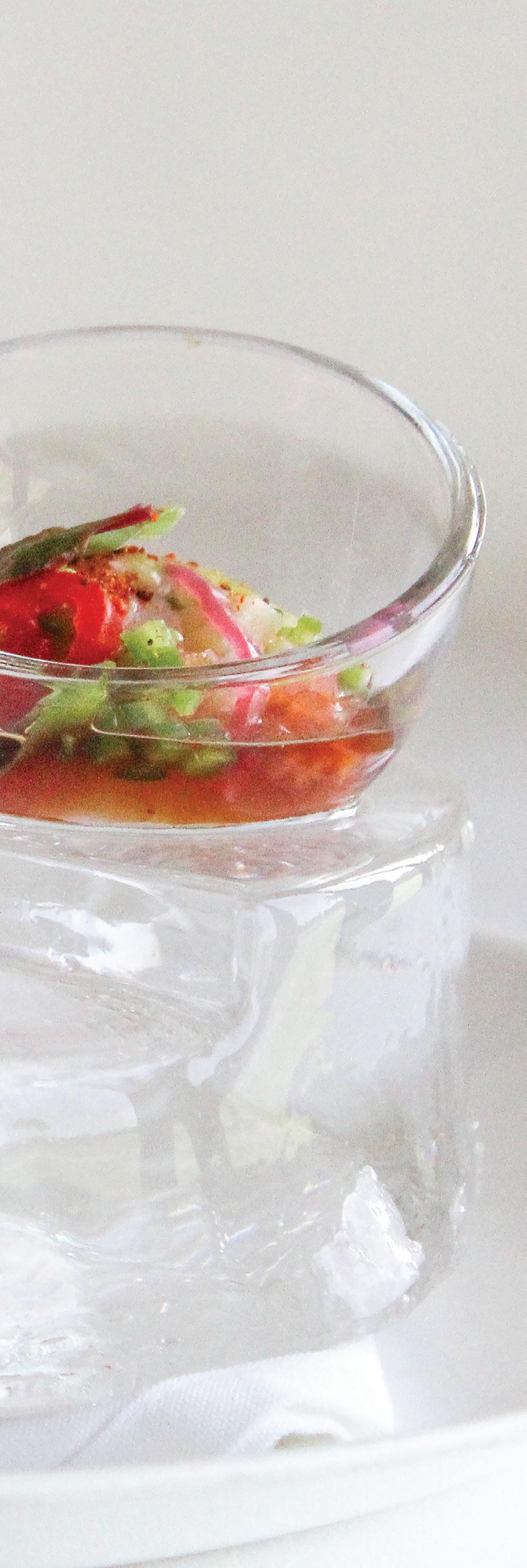
• 1 teaspoon Jalapeno (minced)
• 2 teaspoons Mint (julienned)
• 2 teaspoons Basil (julienned)
• 4 teaspoons Extra-Virgin Olive Oil
Royal Poinciana Golf Club 31
Scallop Marinade 3
• 3/4 teaspoon Hot Sauce or Tabasco
• 3/4 Tablespoon Tomato (brunoise)
• 1 Tablespoon Ponzu
• 3/8 teaspoon Wasabi Paste
• 3/4 teaspoon Ginger Oil
• 1 1/2 teaspoons Scallion (thinly sliced)
• 3/4 teaspoon Orange Zest (finely grated)
• 1 1/2 Tablespoons Soy Sauce
Scallop Marinade 4
• 1/4 cup Orange Juice (freshly squeezed)
• 3 Tablespoons Lemon Juice (freshly squeezed)
• 2 Tablespoons Soy Sauce (organic)
• 1 Tablespoon plus 2 teaspoons Sunflower Oil
• 1 Tablespoon Fresh Ginger (peeled and finely grated)
• 1 Red Thai Chile (thinly sliced)
• 3/4 teaspoon Sherry Vinegar
• 1/4 cup Mint Leaves (fresh and torn if large)
• 2 Tablespoons Chives (thinly sliced)
• Sea Salt
Garnish
• Espelette Pepper
• Curry Powder
Preparation
Scallops
Sprinkle the scallops with the sea salt, white pepper and Espelette pepper.
Slice each scallop into three pieces. Set aside.
Marinades
In four separate bowls, add the ingredients for each of the four marinade recipes and mix.
Assembly
Fill each glass dish with the three slices of scallop, the four different marinades and garnish with the Espelette pepper and curry powder, chill before serving.
Wine Match
Alphonse Mellot 2016 Edmond (Sancerre)
Golf Kitchen Magazine 32
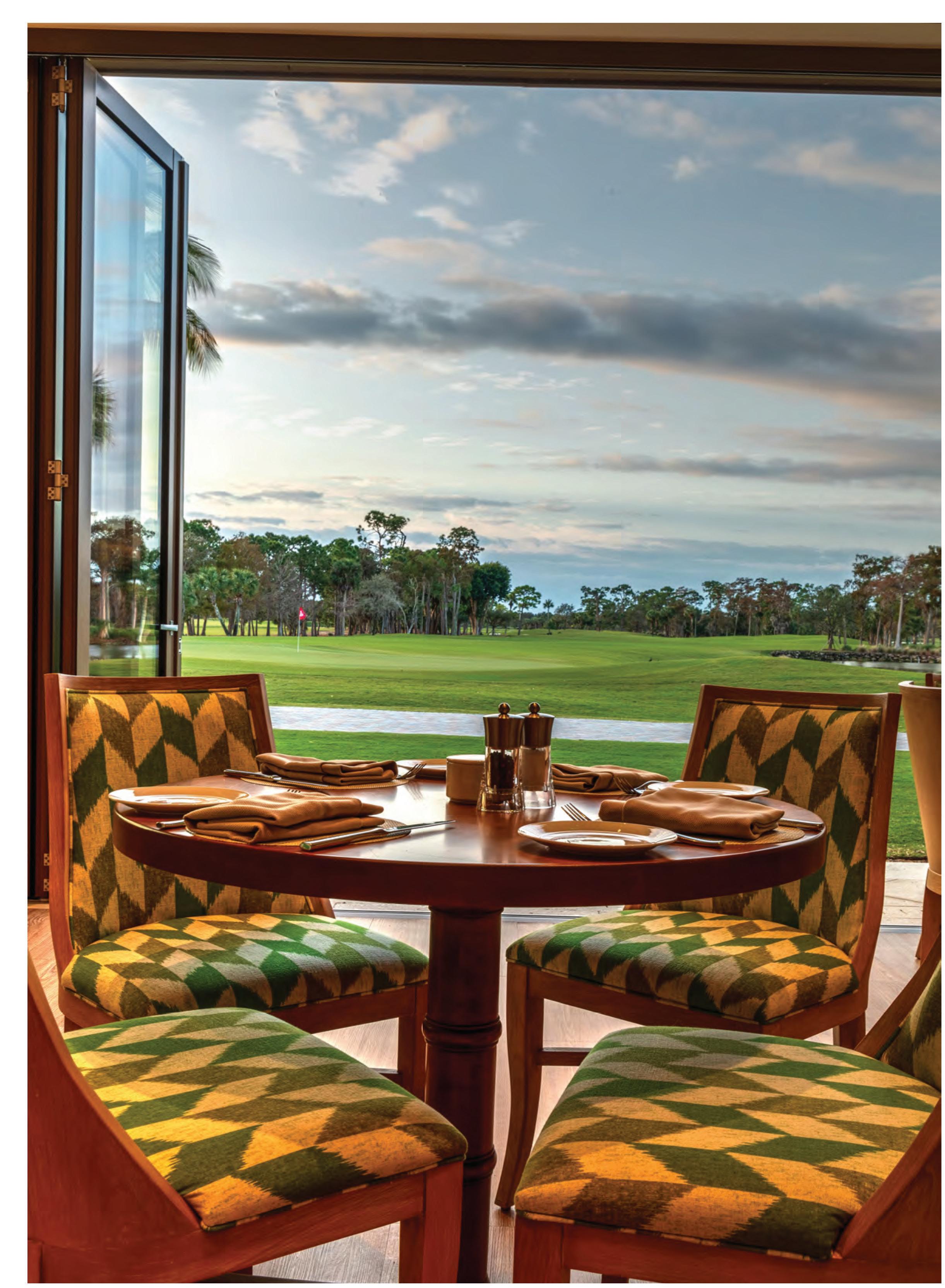 The outdoor bar area of the Restaurant at Sixteen Hundred overlooking the 18th hole at the Cypress Course.
Image by Stephanie Starr
The outdoor bar area of the Restaurant at Sixteen Hundred overlooking the 18th hole at the Cypress Course.
Image by Stephanie Starr
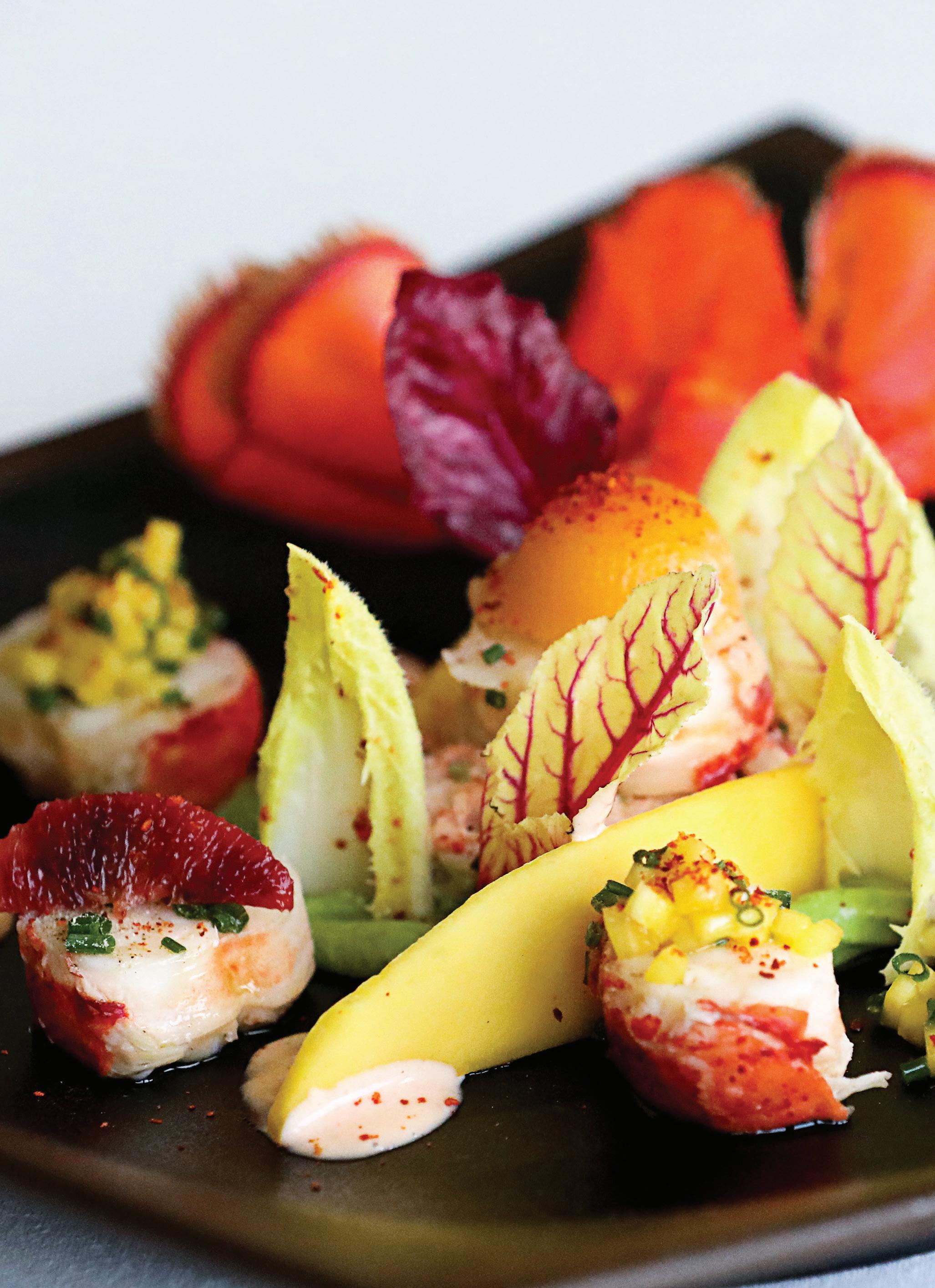 RECIPE BY SCOTT HAEGELE
RECIPE BY SCOTT HAEGELE
CHILLED MAINE LOBSTER with Mango Sphere Espelette Pepper, Baby Greens, and Avocado Cream

Yields 4
Ingredients
• 6 ounces Mango Puree
• 1 Gelatine Sheet
• 1/2 ounce Espelette Pepper
• 1 ounce Mache Greens
• 1 ounce Beet leaves
• 1 Whole Maine Lobster (1 ½ pound)
• 1 Mango
• 3 pieces, EndiveL lettuce
• 16 Olive Oil
• 8 ounces Grape Seed Oil
• 1 Blood Orange
• 2 stalks Celery
• 1 whole Shallot
• 2 cloves Garlic
• 2 Lemons
• 1 whole Egg
• 1 teaspoon Dijon Mustard
• Salt and Pepper (to taste)
• 1 Avocado
• 1/4 cup Sour Cream
• 1 Lime
Royal Poinciana Golf Club 35
Preparation
Lobster Aioli
Place the garlic, mustard, and egg in the bowl of a food processor fitted with a blade attachment. Process until evenly combined, about 10 seconds.
With the motor running, slowly add the olive oil in a thin stream, followed by the grapeseed or vegetable oil, until thoroughly combined, about 2 minutes.
Stop the processor, add the lemon juice, season with salt, and pulse until thoroughly mixed. Stop and scrape down the sides of the bowl with a rubber spatula, then pulse until all the are evenly incorporated.
Let sit for at least 30 minutes before using. Refrigerate in a container with a tightfitting lid for up to 3 days.
Lobster Tail
Steam lobster for 13 minutes and remove the meat from the shell. Reserve the body for making the aioli. Slice the lobster tail into 4 pieces, then remove the vein from the inside of the tail. Dice the lobster claw and knuckles and reserve for the salad.
Add the minced shallot and celery then mix with lobster aioli and season with salt and pepper.
Salad
Clean mache greens and beet leaves to remove any soil and trim stems.
Segment the blood oranges and reserve 3 for each plate.
Peel the mango and cut around the pit to remove mango flesh.
Slice one elongated piece of mango for salad and dice the rest brunoise and reserve for plating.
Clean endive by removing the outer leaves, trim three pieces, and reserve for plating.
Mango Sphere
In a saucepot heat on medium heat, the mango puree and bloomed gelatin sheets. Heat until the gelatine has dissolved. Pour into half-sphere molds and place in freezer for 6 hours.
Avocado Cream
Take the avocado and sour cream and put in a blender.
Puree until smooth and season with salt, pepper and lime juice.
Assembly
Start with a 10-inch salad plate of your choice. In the center smear the avocado cream, about 2 tablespoons full. Next place a ring mold in the center of the avocado cream, add 1 ounce of lobster salad. Next lay the three pieces of the lobster tail around the outside of the avocado. Garnish the plate with endive leaves and beet leaves.
Finish the plate with dots of lobster aioli sporadically placed around the lobster. Add three little piles of mango relish. Complete the dish with citrus segments.
Serve immediately.
Wine Match
Albarino (Rias Baixas).
Golf Kitchen Magazine 36

























 A frame from one of the Sebonack bee colonies.
Image by Diana DeLucia
A frame from one of the Sebonack bee colonies.
Image by Diana DeLucia

JOHN CARSON BEEKEEPER SEBONACK GOLF CLUB
John Carson’s dedication to bees and their impact on the environment has fascinated me since my first conversation with him in 2014 at Sebonack Golf Club during the installation of the hives. I returned this year to see how the colonies were progressing and asked Carson a few questions about his work. ~ Diana
DeLucia
GK: Why bees?
Somewhere in my 20’s, I started keeping honeybees. I am mesmerized by them, and managing hives has become a significant part of my life.
GK: What do you do in your average day, is it your full-time job?
No, it is not my only job, I own a farm stand in Westhampton, New York. I get up early every day, and I take care of everything I have to do for the farm stand, I’m usually done by nine a.m. I have people that work there and manage it while I go and take care of the bees and, you know, they need a lot of attention. It’s not all year round, but in the springtime, it’s hectic.
GK: How do you feel about the food industry and the honey that you’re producing? There is a lot of suspect honey on the market.
It is big news right now. There is a lot of honey that isn’t real, and it’s either filtered beyond the point of being honey, or it’s mixed with high fructose corn syrup. The honey that we are producing is 100% raw. It’s never been heated, and it’s never been filtered. It comes from
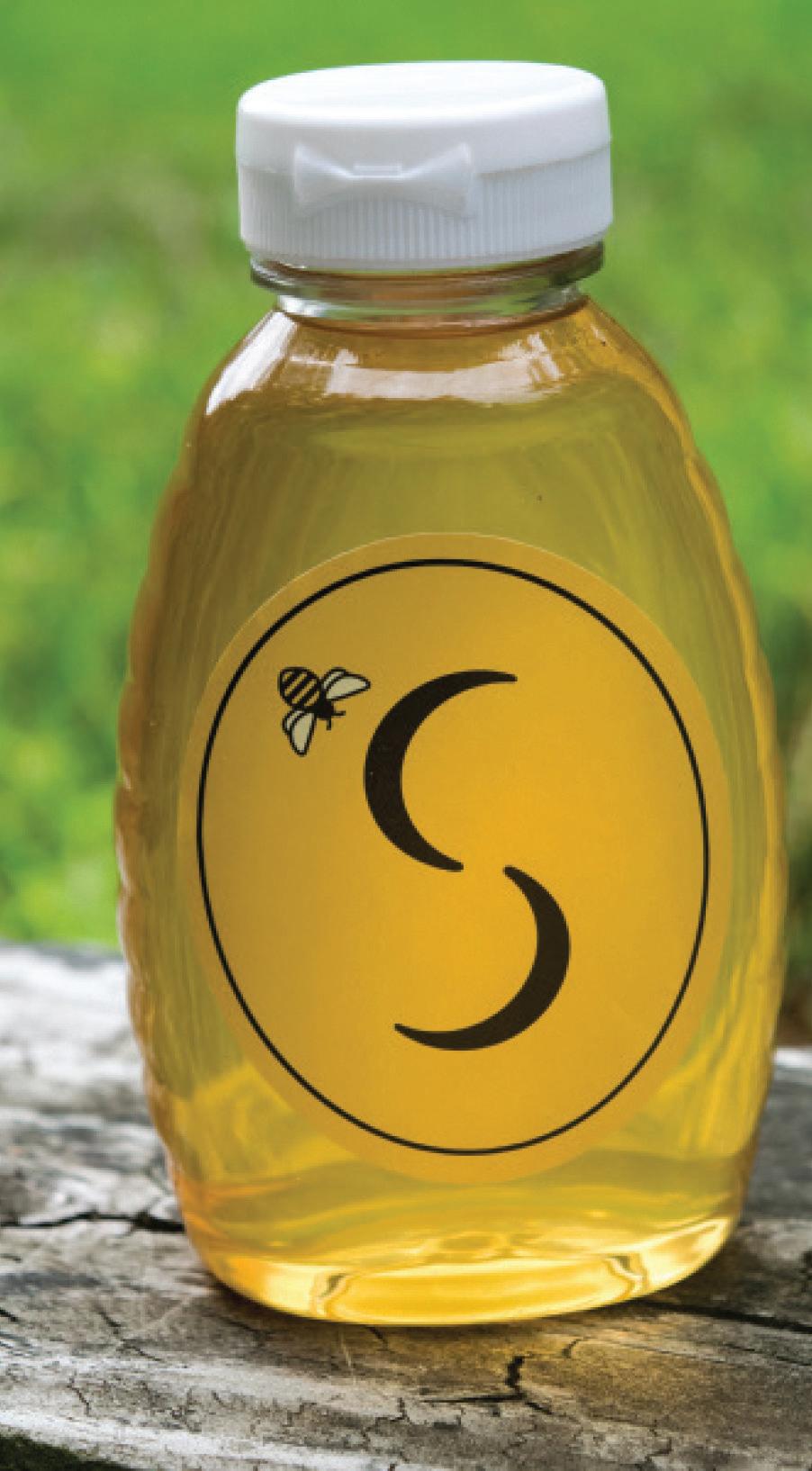 One of the first jars of Sebonack honey in 2014.
Image by Diana DeLucia
One of the first jars of Sebonack honey in 2014.
Image by Diana DeLucia
Golf Kitchen Magazine 40 INTERVIEW
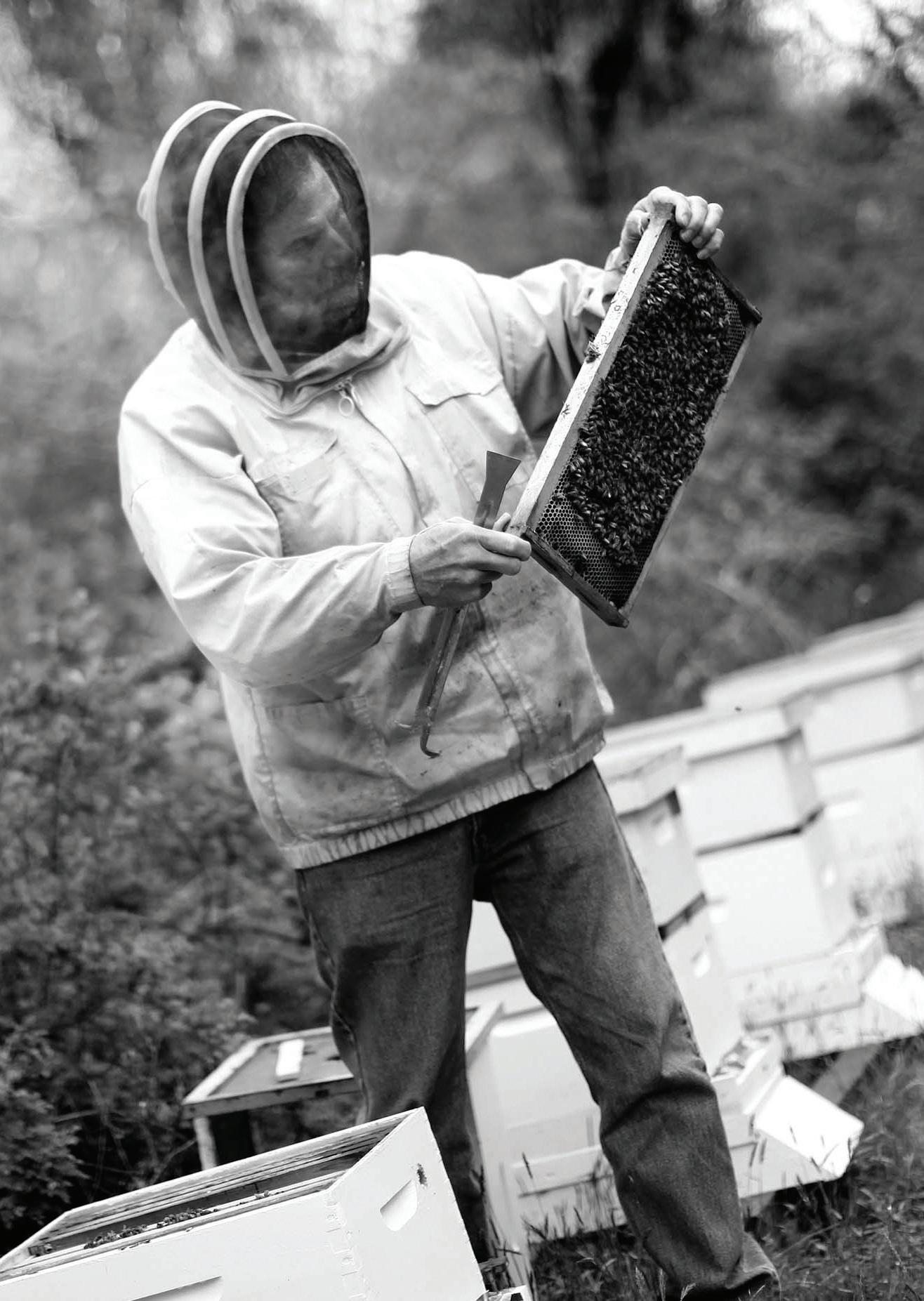 John Carson inspects a frame from one of the Sebonack hives.
Image by Michael J. Fiedler
John Carson inspects a frame from one of the Sebonack hives.
Image by Michael J. Fiedler
the bees to the jar, and I oversee the entire operation.
GK: Is it true that the honey in your local area is the best to eat?
It depends, I have a whole theory on this. A lot of my customers at the farm stand and other places eat raw honey because of their allergies. I don’t think there is any medical or scientific explanation, but when somebody comes to me, and they say, “oh, I have allergies, I want to buy some honey,” I ask them, “what are you allergic to?” If they know what it is, say they’ve said they are allergic to dandelions, I’ll make sure that I give them the honey that we took from the spring because I know that the dandelions were blooming at that time. If you’re allergic to goldenrod, there’s no goldenrod in the spring, honey. So you want honey from the fall, but there’s no definite proof that this works, but nobody’s complaining.
GK: Why are honey bees successful pollinators?


They are species-specific. A bee colony is set up to have scouts that are looking for sources of nectar and pollen, they communicate with each other where the best sources are. For bee pollination to work, it has to come from the same species. Butterflies don’t care, they’ll go from a cucumber to a tomato to a dandelion, but you’re not going to get a cucumber that looks like a dandelion. It’s not going to happen. This is why bees are such valuable pollinators. They are species-specific. They’ll just do one thing. You could have clover honey if you knew that clover was in bloom as that’s when the bees get the nectar.
GK: I heard that honey is like wine, and there are different flavors if you pay attention.
Yes, that is correct, some of the honey from Sebonack Golf Club tastes like mint, and that is due to a wild mint on or around the golf course, it’s very
subtle.
The honey that we produce at the beginning of the season is so light that you can read a newspaper through it. The honey at the end of the season, if we get a fall crop, is such a deep, dark red that if you hold the jar up to the light, you can’t see through it.
I have a vast following of people that want to buy this honey. They know it’s real. Some people only want light honey, others like crystallized honey or dark honey. Some people come to the farmstand, and we don’t have the dark honey, well, they won’t buy the light honey, they will just wait until we have the dark honey.
GK: At what point did society say we want to make honey that all tastes exactly the same?
There’s a lot of people on the planet. There’s no way you can produce enough food without mass production. People complain about Monsanto and Roundup and all this other stuff, but when they go into a store, and a tomato is $10, an ear of corn is $15 they’re going to be complaining about that too. You have to mass-produce. It takes a lot to feed a nation.
People have this idea that we’re going to be organic farmers and we’re going
Golf Kitchen Magazine 42
“Some of the honey from Sebonack Golf Club tastes like mint, and that is due to a wild mint on or around the golf course, it’s very subtle.”
to be organic farmers and we’re going to grow everything naturally, and we’re not going to use any plastic. It’s not possible without technology. The human population over the last 150 years has exploded, and everybody needs to eat, and there is a trade-off for that, there is some collateral damage, and it’s not feasible for the small production companies as they can’t produce enough, you need factories.
The other thing is the actual cost of producing. The small farmers they’re on the verge of going out of business. There are regulations and all the other associated problems. It can’t keep going the way it is, and the trade-off with that will be mass-produced food. Everything will be GMO. It’s the only way they can produce enough.
Beekeeping, up until the 1800s consisted of a man who found a beehive, killed it and took the honey and that worked fine back then as the demand for the honey didn’t outpace what the bees would naturally be able to produce. Then along came this guy Langstroth, and he figures out beekeeping. He invented and designed the hives that we’re using today.
GK: How are they mass producing honey?
What has happened recently with the bees is they went on a genetic laser beam from being natural producers to controlled hives. People figured out that you can flip generations in the summertime in a matter of weeks, and very quickly, things started to change. I really believe that one of the reasons the bees are dying is genetic.

What I’m trying to do is raise queens that I select for survivability and heritability. So far it hasn’t worked. It’s like Holstein cows, you can’t take a herd of cows and let them go and figure that they’re going to be all right. The farmer has to take care of them and, I believe it’s the same thing with bees nowadays. This is only my opinion, but the single biggest problem is mites, and
 Honey bees returning to the hive.
Honey bees returning to the hive.
43
Honey bees pollinate more than 90% of all crops.
Golf Kitchen Magazine
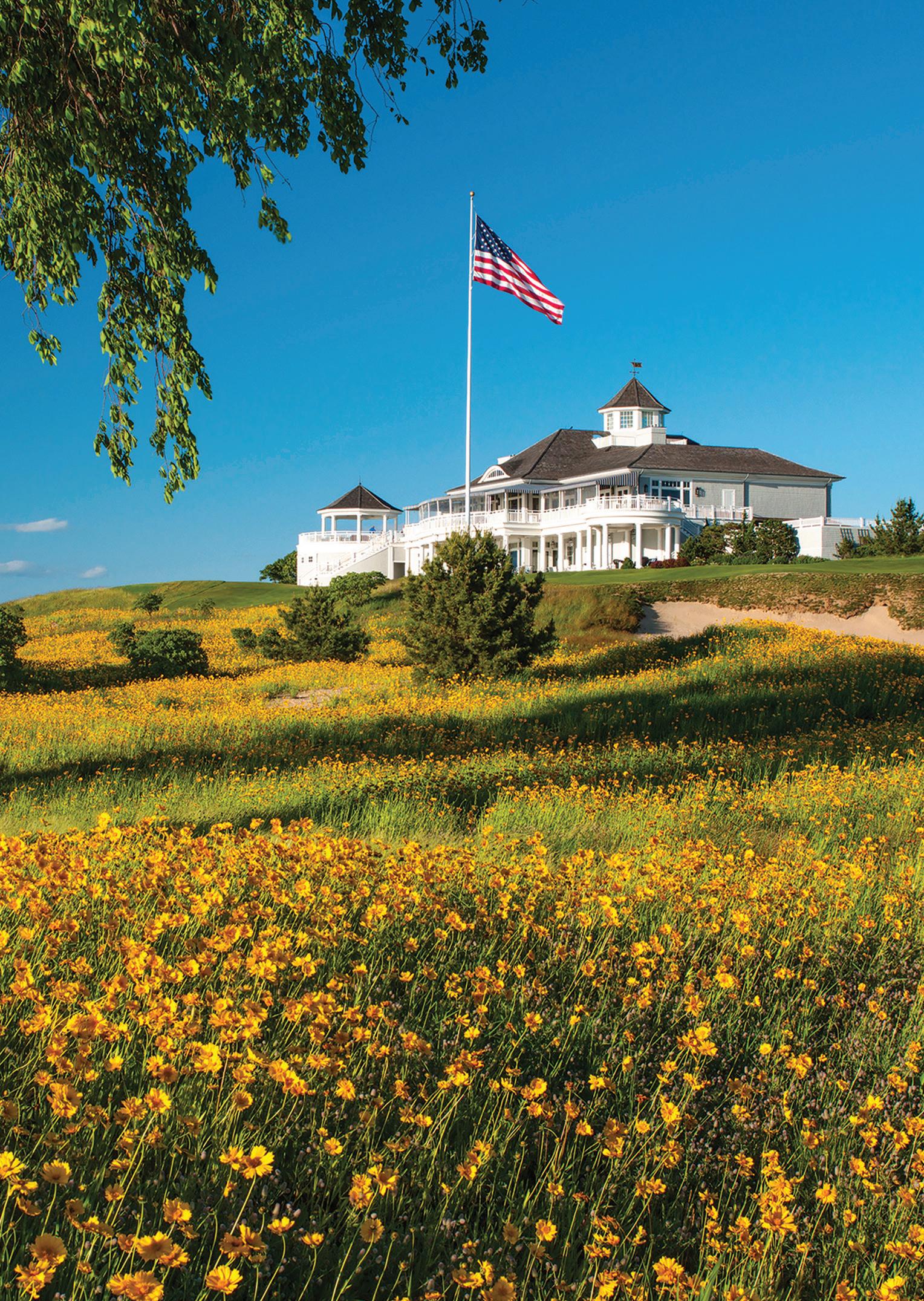
and the vast majority of other issues that you see with bees are a direct effect of the mites.
GK: Bees are not native to America, usually when a species from another country is introduced it becomes a huge problem. Why is this different for honey bees?
90% of the food that’s pollinated is pollinated by honey bees.
GK: What happened before the honeybees were introduced?
Honey bees are not native to America, they were introduced when European settlers came here, mainly to make mead. The American Indians took care of themselves. So they were fine. There was nobody here. They didn’t need the food.
GK: So why do people say if there are no bees, there’ll be no people.
The population of the US is around 400 million people, that’s a lot of mouths to feed. The Chinese are trying to hand pollinate, but it’s too labor-intensive, remember in a healthy hive there are 40 000 to 60,000 bees, that’s a lot of work to hand pollinate. Bees are so efficient at what they do. Depending on who you ask and I personally don’t subscribe to this, but maybe it’s true, and, I think Einstein was one of them who said that the human race has between one and 10 years without bees.
GK: Tell us about the mass production of honey bees.
You can palletize hundreds of hives, say you have thousands of acres of almonds in California, they’ll bring these palletized hives in semi-trailers, they’ll know how many thousand acres and how many thousand colonies they need. They know when 10% of the blossoms are in bloom, and that’s when they let the bees go because the bees will go right to the flowers.
GK: It sounds like what you’re saying
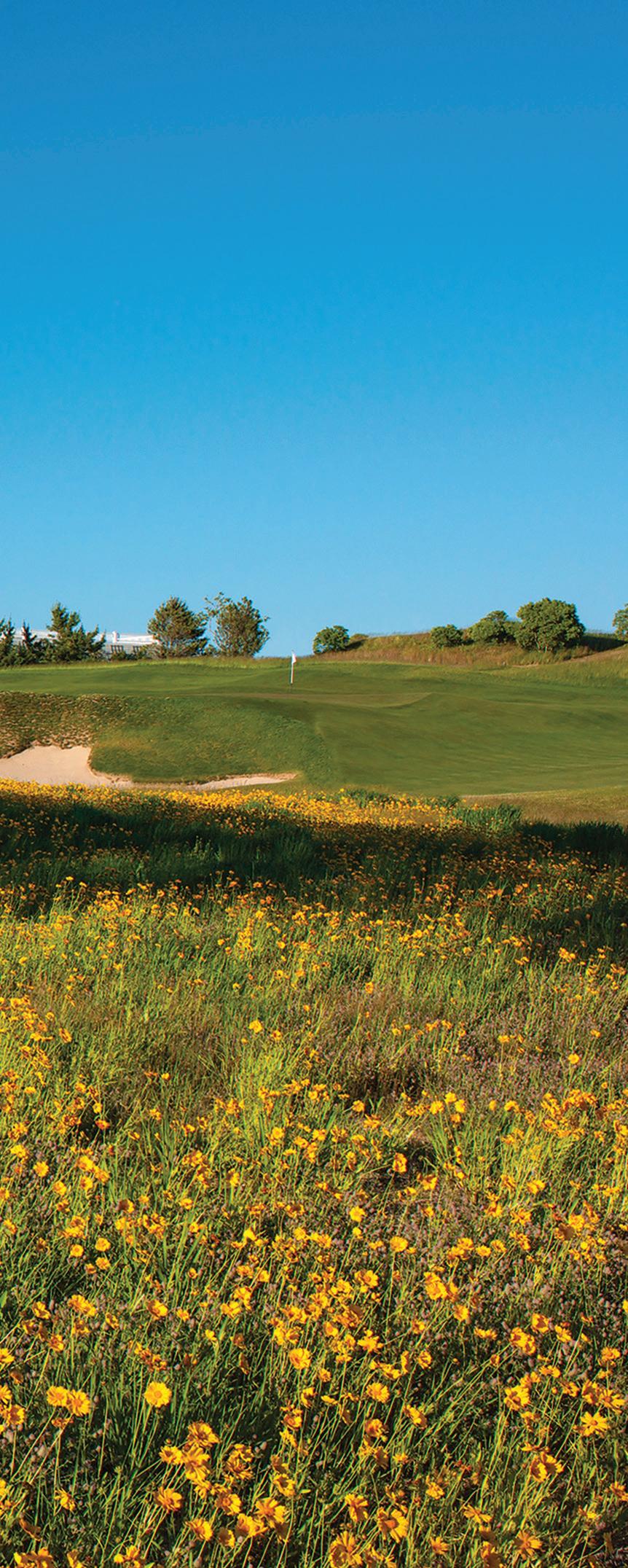 The Sebonack clubhouse.
The Sebonack clubhouse.
45
Image by Laurence C. Lambrecht
Golf Kitchen Magazine
is bees are becoming a commodity production, and that’s probably why they’re all getting sick because they’re not immune to anything.
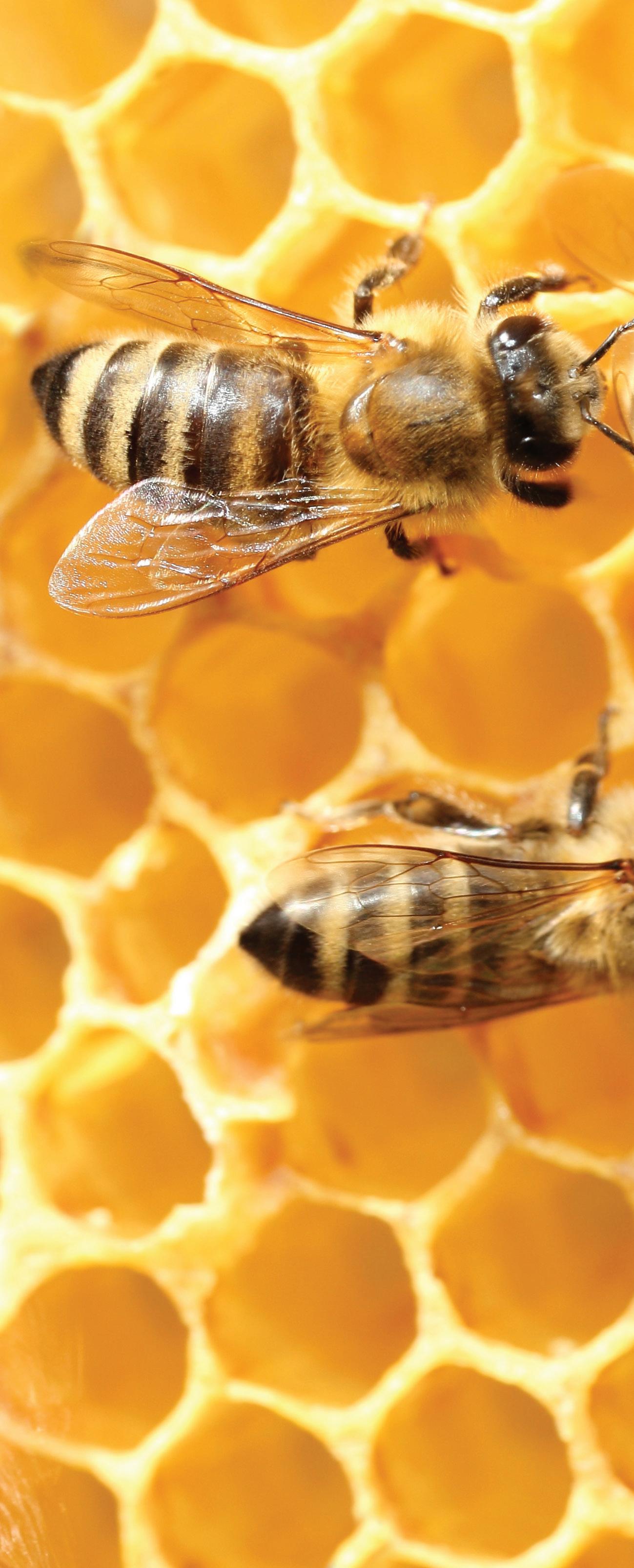
GK: How do you feel about Golf Clubs like Sebonack who are producing their own hives?
I think it is a fantastic way to give back to the environment and to set an example for other clubs to do the same. They have the land, so why not keep a healthy honey bee population? Recently I have seen an uptick of clubs installing hives, and from a members perspective, it creates a great deal of pride in the club.
46 MAGAZINE 46 Golf Kitchen Magazine

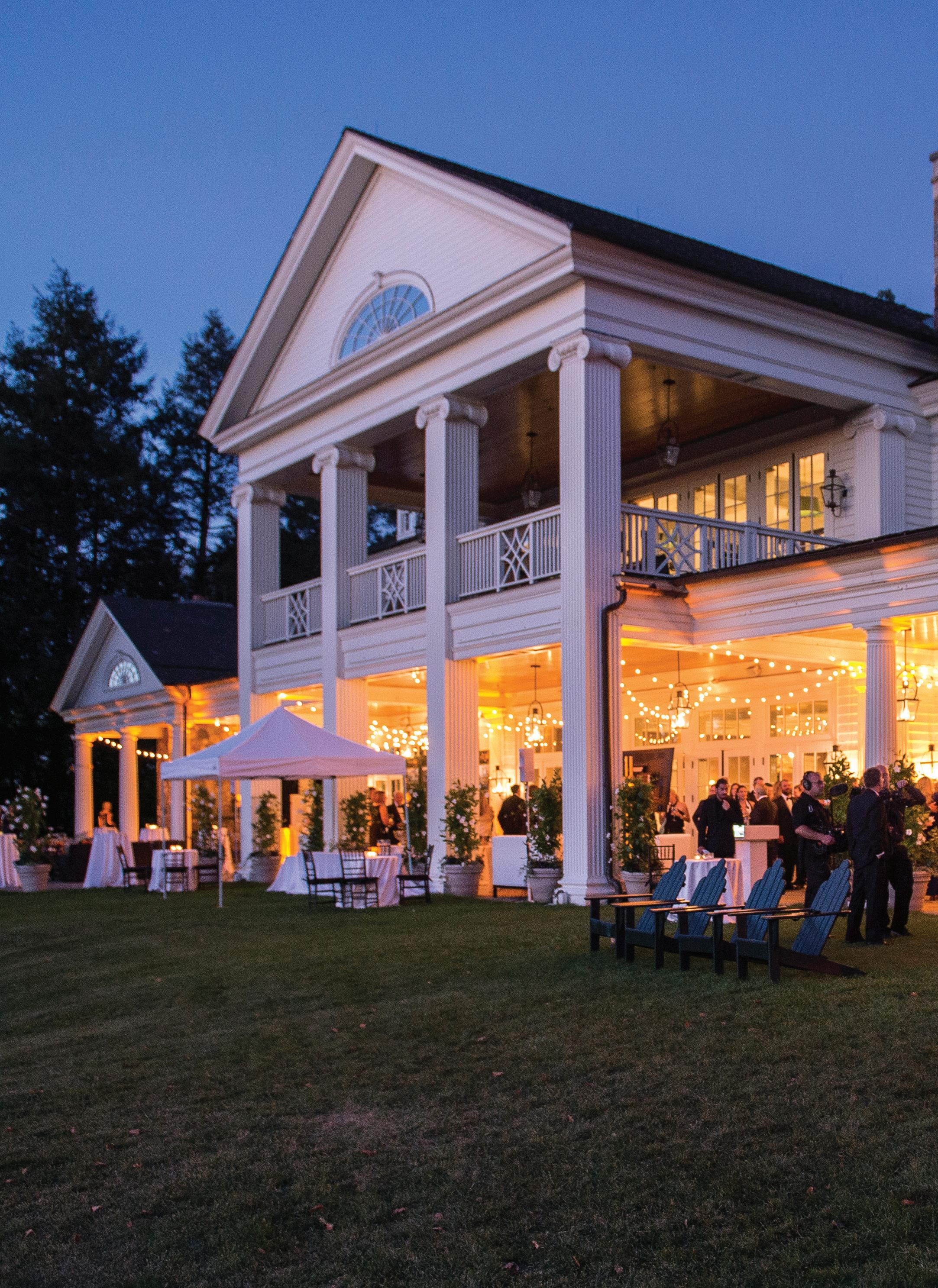
New York
GlenArbor Golf Club Bedford Hills
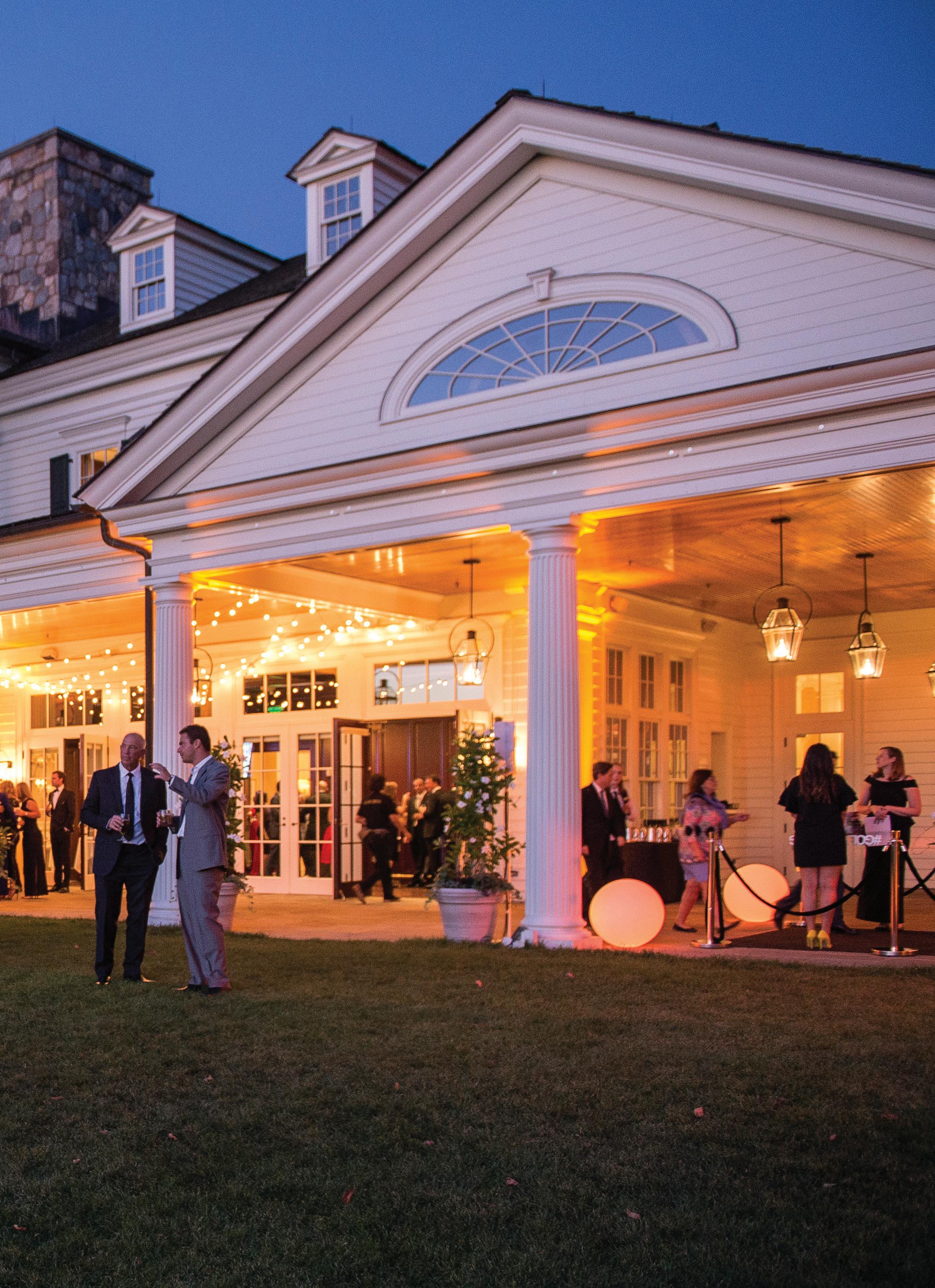 The stunning GlenArbor Clubhouse.
The stunning GlenArbor Clubhouse.
Michael Ruggiero Executive Chef
Michael Ruggiero has spent his 25 year culinary career working with great chefs and has traveled extensively to countries like Peru, France, and Japan to expand his culinary knowledge. His mentor of ten years is Edward Leonard CMC (Certified Master Chef) is currently the Executive Chef at the Polo Club in Boca Raton and a well-known speaker at industry events. ~ Diana DeLucia
GK: You grew up in Queens, New York, how did that influence your career?
My parents owned an Italian deli Roman Carousel in Rosedale, Queens, New York. As I was growing up, I watched my father make all these Italian specialties and my mom cook Italian catered foods in the kitchen. My grandma lived above McSorley’s Old Ale House on East 7th Street, and on Sundays, she would prepare these long, lavish dinners in her tiny little apartment, with the table extending through this shotgun apartment for all the family in attendance. My grandma would start the meal with antipasti, then meatballs and sauce, and even handmade pasta. She’d make pizza dough and veal and peppers, it was this long ceremony of dining. Even with all of this exposure to food early on, oddly enough, I was a bit of a picky eater! That fussiness almost certainly fueled my passion for cooking and with the best ingredients even more.
After high school, I enrolled at the CIA (Culinary Institute of America) in Hyde Park, New York. It was about 1995, which was around the time the
Food Network started to become popular, and this youth movement of students started going to culinary school straight from high school. I was one of the younger kids amongst others in my class, as many students were older with previous culinary experience or already an established chef. I believe having a formal culinary education early in my career helped me get a jumpstart in the industry. It was a tough learning curve at the beginning at the CIA, but I was very fortunate to have great classmates and professors to learn with and from, and I was always determined to go above and beyond and make the sacrifices to improve myself.
After graduation in August of 1997, I bounced around a bit as a cook until I met one of my first mentors, Brian Limitone who worked at a little Italian bistro at the Redding train station called La Trattoria in Connecticut. I was looking for a job, and I walked in the back door, and I remember him giving me this look, like “What are you doing in here!?” Little did he know that he was getting the gift of a hungry CIA graduate looking for work, knowledge, and as much experience as I could soak up!
When he hired me, I was 20, and I can honestly say that working with someone of his skill set at an early part in my career was a tremendous experience and just what I needed as a young cook. His flavors and techniques in making soups, braises, sauces, curing salmon,
INTERVIEW Golf Kitchen Magazine 50
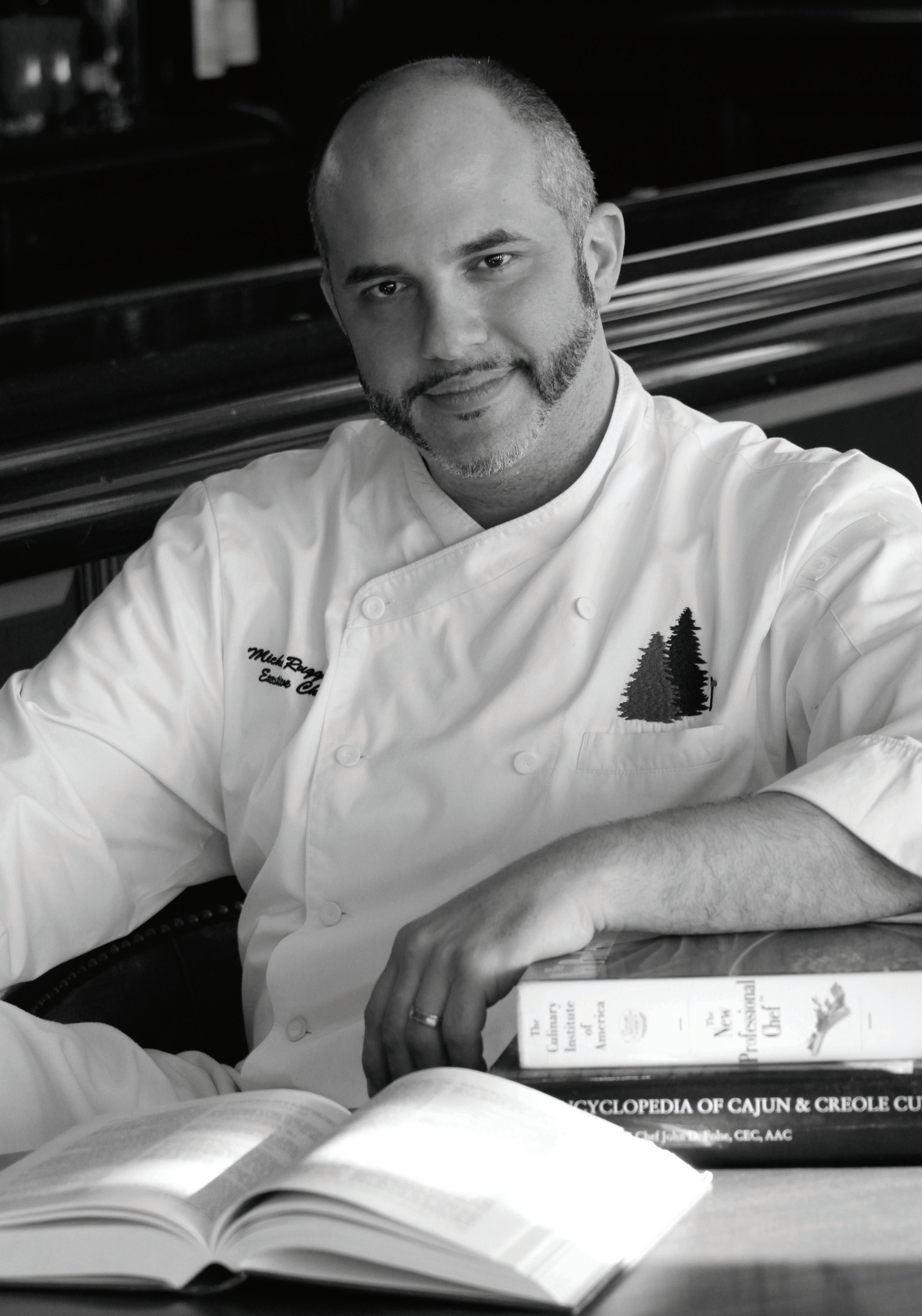

and making desserts as very attractive to me. I was learning trial by fire at the same time, but the professionalism and standards that I learned in the two years with him at La Trattoria was a fantastic experience. I will always look upon those early days with fond happiness.
After working with Brian, I moved on to a new position at Food First, an upscale corporate cafeteria, which was co-owned by Edward Leonard CMC. After a couple of years of working in various roles including Head Chef at Duracell at the time the company was sold, Chef Edward was moving on to open a fine dining Italian restaurant named Cantare in Downtown Chicago.
In hindsight, I felt fortunate that Chef Edward invited me to join him as we didn’t have much of a relationship before that. He was in charge of the entire company which had locations all over Connecticut with dozens of head chefs to choose from. He also asked my colleague and friend, Matt Roche, another head chef from one of his units, to come to Chicago and work with him as a sous chef and open the restaurant.
After two years in Chicago, I moved with Chef Edward, to Rye, New York to become his Executive Sous Chef at Westchester Country Club. It was the next step in my career, and really an incomparable experience. The collection of talent in the kitchens that Chef Edward put together was full of future CMCs, CEC’s, executive chefs, and pastry chefs. I was present for all of the ACF(American Culinary Federation) Culinary Olympic team practices, and being a part of their brainstorming sessions was just an experience that is near impossible to duplicate. Combine that with the size and pressure of running a food program with the sheer amount of functions daily at the golf course, beach club, and the clubhouse was detailed and intense. I was just getting this firstclass experience in so many avenues of foodservice and hospitality. I can’t say enough about the people that I met and the friendships that I have to this day with the culinary team that I worked with at Westchester Country Club.
GK: Tell us about your first position as Executive Chef.
After four seasons at Westchester Country Club, I was ready to take on my own kitchen. I accepted the position as Executive Chef at the Orienta Beach Club in Mamaroneck, New York. In the six and a half years I was there, I had the opportunity to be involved with many of the expansions and remodeling of the club, from the clubhouse to the beach. They renovated the snack bar, parts of the clubhouse, the Cabanas, the kitchen, and to have an opportunity to renovate the kitchen, including the selection of all of the china, glass, and silverware; t was a great learning experience. The Orienta membership, the kitchen staff, and General Manager Mark Sheehan were great to work with, and I enjoyed my time there immensely.
GK: What lead you to the Tuxedo Club?
When March came around the following year, I felt that I had been away from the stove for too long. I sent out my resume to the club openings, and after a long process of interviews and tastings, I accepted the Executive Chef position at The Tuxedo Club in New York.
GK: How long did you work at The Tuxedo Club?
During my final season at Orienta Beach Club, I became a father. It was winter, and I decided to take a year off to spend time with my wife Denise and our son Carter. I wanted to watch Carter take his first steps and to take a break from the 60+ hour work weeks. (cont. 40)
53
GlenArbor Golf Club
“I can’t say enough about the people that I met and the friendships that I have to this day with the culinary team that I worked with at Westchester Country Club.”
A word from Mentor, Edward G. Leonard
“In our profession, there are times when a person steps in the kitchen, and you know. Mike was one of those cooks. He showed passion, energy, a sense of purpose, and a willingness to learn. From cooking with him in Chicago to New York, he always displayed a discipline about him and with others to try and do the job at the highest level and follow my visions and quest for excellence.
Every day he gave 100 plus %, yes he made mistakes, but those were the building blocks he used to learn and grow and progress. No matter how good a cook a person maybe there are attributes you cannot teach, you can discuss these things philosophically, but a person has them as part of who they are, or they do not.
Mike had a sense of urgency, a hard work ethic, a sense of being humble and much integrity. With that foundation, you can advance in the set of cuisine, quality, and having standards. He created professional and personal friendships in the kitchen and was a chef you could count on when needed.
Mike looked out for the greater good and knew that shortcuts and taking the easy way did not meet the required goal and objective of our program. urning.
To look now and see the chef he has become, the person as a dad and husband, I am proud, and hopefully, in some way, my mentoring and teachings influenced the success he now has. As a chef, this is what the ultimate goal is, not the awards, the medals, and recognition but the young cooks and chefs you try to develop and lead, so they as well set the trail and keep our fire burning.”
Golf Kitchen Magazine 54


GlenArbor Golf Club 55
Ruggiero is proud of the herb garden.
The juice bar is a favorite among the members and guests.
We moved to my wife’s home state of Louisiana, and I took a job in a shipyard for a year. The job involved bidding and estimating on the repair, and painting of 200-foot service vessels in the oil industry. It wasn’t my field, but as a chef, many of the same components could be used to be successful in this new endeavor. We do estimates and financials daily and make contracts, manage groups of people under duress with tight deadlines. I applied my knowledge to a different area, and within six months, I was running the department. You can be successful in many things if you put forth the effort and have a can-do attitude.
Learning about the wine program and the ever-changing needs of the front of the house staff during multiple functions that are taking place simultaneously also gives you more depth as a chef. When you have a clear idea of both the front and back of the house, it helps you to understand the flow of the business and its ever-changing needs.
GK: Tell us about GlenArbor.
I was 41 when I began my role as the Executive Chef in 2017 when former Executive Chef Carey Favreau ended his long successful tenure to start his own business. Carey had been the only chef that the members had known, he was like a family member to them.
GK: How did you find the transition?
Usually when a new chef begins, the previous chef had been let go, or the program was not at a level that the membership preferred. At GlenArbor, I was walking into a place where they had only known one chef, and he was beloved by the members and the staff. It is now my job to continue the continuity of his success.
When March came around the following year, I felt that I had been away from the stove for too long. I sent out my resume to the club openings, and after a long process of interviews and tastings, I accepted the Executive Chef position at The Tuxedo Club in New York.
GK: How long did you work at The Tuxedo Club?
I worked there for three seasons, and during my last year, I became the Culinary Director. This was an excellent position and experience, and I recommend it to every chef because you learn the challenges from the other side of the business.
GK: Tell us about your experience.
Having the opportunity to anticipate the needs of the membership a-la-minute in the dining room as well as learning the flow of the setup and breakdown of events is advantageous.
I had to look at things from a different angle than usual. I felt that coming in, I needed to honor the culinary traditions of the club and the imprint Carey had left. Over time with consistent, thoughtful creativity, I could add my influences, add my flavor profiles into the program where it made sense, and eventually, I would have this new hybrid of old and new ideas and club classics. It would be subtle with no break in continuity or quality, no break from the synergy, or the success that was already in place. I’m now in my second season, and I love it.
GK: Tell us about the staff.
When I took on my role here as Executive Chef, I was fortunate to have a well-seasoned team (which is indeed not always the case) that helped me navigate the kitchen. Paul Keating, our sous chef, was instrumental in getting me up to speed for the feel of the club, its events, and nuances signature to GlenArbor. Paul and the entire team are a pleasure to work with, and the camaraderie in the kitchen makes for a great experience.
Golf Kitchen Magazine 56
“When you have a clear idea of the front and back of the house, it helps you to understand the flow of the business and its ever-changing needs.”

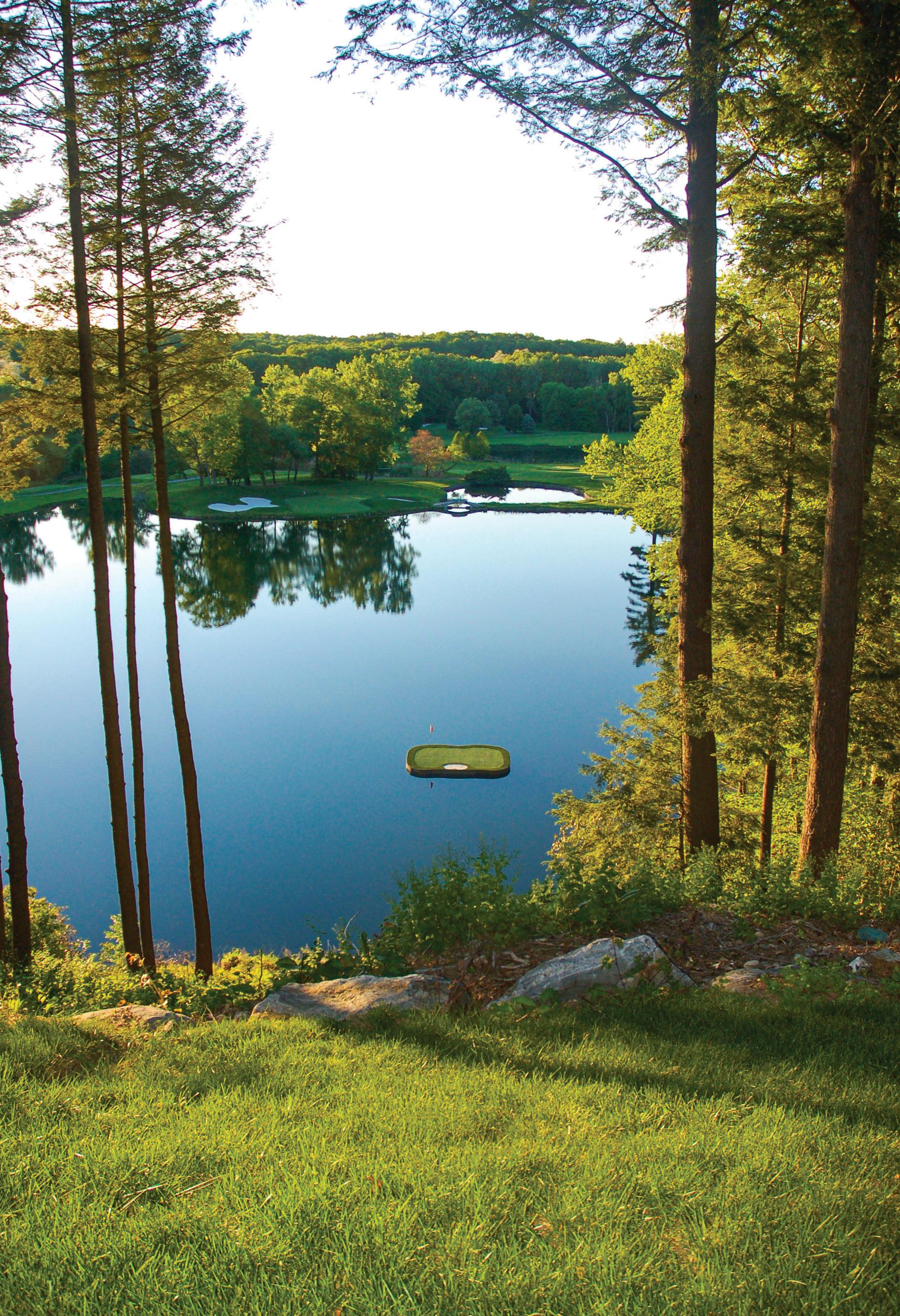 The floationg green at GlenArbor Golf Club.
The floationg green at GlenArbor Golf Club.
I was pleased that the vast majority of the members are foodies. They are all well educated in food and wine and have advanced palettes. Our President and owner, Morgan Gregory, is incredibly supportive of the culinary program, and we have a membership that genuinely supports our sourcing and working with the most exceptional products. It is the perfect place for me to continue to practice my craft. I come here every day, able to express my ideas, be creative, be an artist and as a chef, that is why we do this, why I went to the Culinary Institute of America all those years ago.
GK: The membership here is quite healthconscious, how does that affect the menus?
We embrace it. It is naturally a part of the fabric of our profession. We have a responsibility to be conscious of the food we serve, prepare, and where we source it. We need to know where it grows and its seasonality. Our responsibility extends all along the process, from the plate leaving the kitchen to its origin in the field or the ocean. Buying the best quality ingredients and accentuating them and letting them shine is the best way to utilize food. The old classics with these heavy roux’s and finishing with butter are not so necessary, and honestly, the food is cleaner and makes you feel better after without a whole lot of it.
Like any club, we have members with intolerances or dietary needs. We do our best to adjust recipes so it is universally acceptable to any and all restrictions or we make a quick substitution as needed to accommodate.
Chef Carey also started a juicing program, and it has become another opportunity to be health-conscious for the members. We have our own garden, and we work with organic farms in CT and NY that deliver a superior product, which helps support the juice and culinary program and keep it natural.
GK: Tell us about the menu planning for the Gary Player Invitational.
The planning for the menu at the Gary Player Invitational starts six months in advance when The Gary Player and Berenberg teams come to the club, and we do a very involved
tasting of numerous plates to narrow down the menu selections for the event. Come October, the invitational takes shape over two days. On the evening of the first night, we have an opening dinner in a marquis tent on top of the hill at our short game area. The attendees arrive with fanfare and get to play an improvised par 3 in our short game that makes its way all the way up to the tent where the party begins with a cocktail reception and finishes with a classic American BBQ, music, and stunning views of the course.
The morning of the event begins before sunlight with breakfast for the players and the media, and during the golf tournament, we set up food stations all over the course. The event closes with a black-tie gala dinner. It’s a non-stop 48 hours of the highest quality that requires multiple layers of communication, organization, and execution.
GlenArbor Golf Club 59

Golf Kitchen Magazine 60
RECIPE BY MICHAEL RUGGIERO

NEW ENGLAND ‘CLAM CHOWDER’
Yields 4
Ingredients
Clam Chowder Sauce
• 1 slice Bacon (diced)
• 1 rib Celery (diced)
• 1 garlic Clove (finely sliced)
• 1 Shallot (minced)
• 1/4 of one Green Pepper (diced)
• 1/2 can Clam Juice (1 quart / 14 ounces)
• 1 pint Heavy Cream
• 1 Tablespoon Worcestershire Sauce
• 1 teaspoon Old Bay
• 2 shakes Tabasco
• 1 sprig Thyme
• Salt and Pepper (to taste)
• 2 Tablespoons Cornstarch
Chef Note ~ Add equal parts of clam juice to and cornstarch to make a paste for the slurry or use 2 Tablespoons Roux if no Gluten Allergies. auce
Fried Clams
• 4-6 Whole Belly Clams (per serving)
• All-Purpose Flour (seasoned with Salt and Pepper and Old Bay to taste)
Garnish
• Red peppers (small diced)
• Parsley (finely diced)
• Chives (finely diced)
• Blanched fingerling or Yukon potato (diced)
• Shucked corn
GlenArbor Golf Club 61
Preparation
Clam Chowder Sauce
In a cast iron pan, render the bacon until crispy. In a saucepan sweat the celery, garlic, shallot, and green pepper until soft.
When soft add the clam juice and bring to a boil. Reduce by and thicken with the slurry or roux. Add the heavy cream, Worcestershire sauce, Tabasco, Old Bay, thyme and salt and pepper and stir well.
Fried Clams
Place the clams in the seasoned flour and coat thoroughly.
Place each clam one by one in a deep fat fryer for approximately 1 minute or till golden brown. Dry in a fryer basket for 90 seconds before removing.
Assembly

Garnish the soup with the diced red peppers, parsley, chives, and diced potatoes. Place the fried clams gently in the center.
Serve immediately.
Wine Match
Schiopetto, Malvasia, Collio, Italy 2015
Golf Kitchen Magazine 62

GlenArbor Golf Club 63

Golf Kitchen Magazine 64
RECIPE BY MICHAEL RUGGIERO
NANTUCKET BAY SCALLOPS with Chickpea Gnocchi
Serves 6
Ingredients
Bay Scallops
• 12 ounces Bay Scallops
• Salt and Pepper
• 2 Tablespoons Blended Oil
Parsnip Puree

• 1 pound Parsnips (peeled and thinly)
• 1 cup Heavy Cream
• 3 Tablespoons Whole Butter
• 1 teaspoon Honey
• Kosher Salt (to taste)
Chickpea Ricotta Gnocchi (Gluten Free)
• 1.5 # Ricotta Cheese (the dryer the product the better)
• 4 ounces Reggiano Parmesan Cheese (ground)
• 2 large Eggs
• 1.25 # Chickpea Flour Chef Note: Chickpea Flour uses less than if made with All-purpose flour
• Extra Chickpea Flour (to dust the dough)
Garnish
• Popcorn Shoots
• Microgreens (micro amarenth or similar)
GlenArbor Golf Club 65
Preparation
Bay Scallops
Chef Note: Be sure to pat the Bay scallops dry, before pan searing. The dryer the scallop the better color you will get
Season with Salt and Pepper
Preheat a non-stick sauté pan adding a Tablespoon of blended oil to the pan until the process results in a lucid, almost smoking point.
Add the Bay Scallops to the pan and sear for one minute on each side, being careful not to shake the pan to allow for proper browning.
Parsnip Puree
Bring all the ingredients, except the salt and honey to a simmer, and when the liquid has reduced by half, puree in a blender, adding the honey and salt to taste.
Chickpea Ricotta Gnocchi (gluten-free)
In a mixing bowl, combine the ricotta, Parmesan cheese and eggs then mix until incorporated. Make a well in the center of the bowl. (similar to when you make pasta dough)
Add the chickpea flour to the well, and using a fork start to feather in the flour and blend until a soft, slightly damp dough is formed.
Using the extra chickpea flour, dust the dough, and place it on a cutting board.
Cut the dough in 4 pieces.
Roll each piece into long cylinders and then cut into 1 inch thick pieces.
Take each Gnocchi, and if no gnocci paddles, lightly score with a fork to make an indentation.
Chef Note: Gnocchi paddles can be found at all good cooking supply stores.
Place on a sheet tray with parchment paper or plastic wrap and freeze.
To cook, heat a saute pan with 3 Tablespoons of olive oil.
When oil becomes lucid, add a layer of the frozen Gnocchi to the pan.
Chef Note: Be careful not to pile the Gnocchi. Saute until the Gnocchi are a light golden brown on either side, about 3 minutes on each side.
Toss with whole butter, Parmesan, and black pepper.
Assembly
Take an almost overflowing tablespoon of parsnip puree and smear side to side on a the plate.
Place the seared chickpea gnocchi across the parsnip puree.
Sprinkle in the same direction the seared bay scallops.
Garnish with the micro greens.
Wine Match
“LVNAE” Etichetta Nera, Vermentino, Cantina Bosoni, Colli di Luni, Italy 2016.
Golf Kitchen Magazine 66

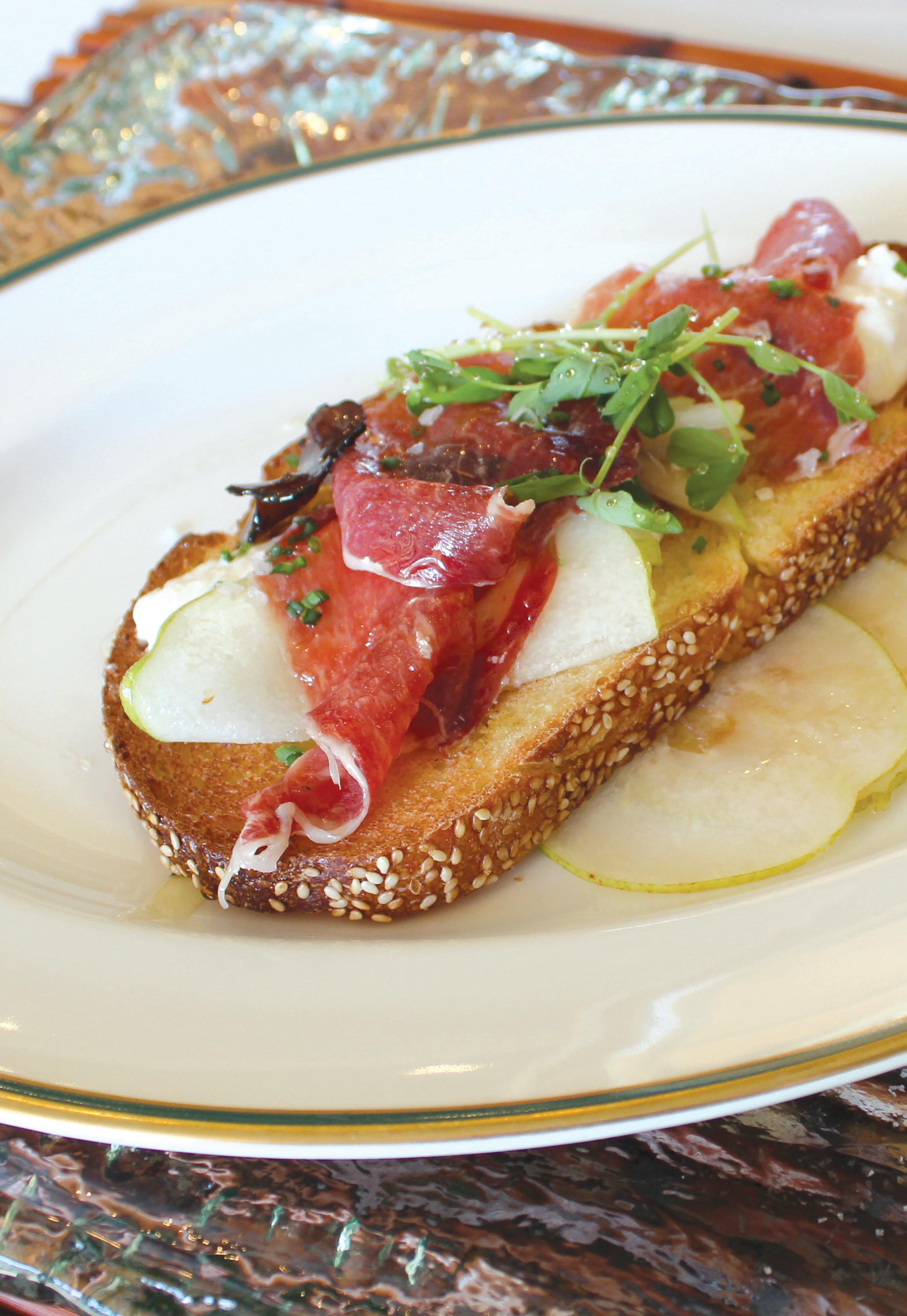 RECIPE BY MICHAEL RUGGIERO
RECIPE BY MICHAEL RUGGIERO
IBERICO HAM CROSTINI
Yields 1
Ingredients
• 2 thin slices Semolina Bread
• 1 two 2 ounce ball Burrata Cheese (sliced)
• 1-2 thin slices Iberico Ham (substitute Prosciutto or Serrano)
½ Pear (julienne or paper-thin slices)

• 1 Tablespoon EVOO
• Maldon Crunchy Sea Salt (sprinkle)
• 1 Tablespoon Truffle Honey
Preparation
Lightly toast the semolina slices until they are crunchy on the outside but soft in the middle.
Assembly
Top with ingredients in the following order: Sliced burrata, Iberico ham, julienne or paper-thin sliced pear. Finish with EVOO drizzle, a sprinkle of Maldon sea salt, and a drizzle of truffle honey.
Wine Match
La Roncaia, Fusco, Merlot, Friuli, Colli Orientali, Italy 2013.
GlenArbor Golf Club 69
CHEFS CHARM ON COURSE AND ENCHANT IN KITCHENS AT GOLF KITCHEN PUNTA MITA
 BY BILL NESTOR
BY BILL NESTOR
Golf Kitchen Magazine 70
The second annual Golf Kitchen Punta Mita event held April 25-28 at the 1,600-acre upscale luxury Pacific coast destination is in the books as sensational, smashing, and delightful. Those were descriptives often voiced by many from the opening swing of a four-hole shootout elimination contest between eleven chefs from some of the most prestigious golf clubs and resorts in the world. Chefs Damian Gilchrist, Jared Ashton, Michael Ruggiero, José Carles Fabregás, Doug Blair, Joseph Klages, Marcelo Pereyra, Yasuo Asai, Gastón Yelicich, Ivan Villanueva and Anthony Villanueva teed it up on Pacifico in play for the Golf Kitchen Chef’s Cup. They presented a golfing exhibition on course during the first afternoon; then proceeded in Punta Mita kitchens with non–golfing chefs to surpass even the loftiest expectations throughout four days of a spectacular affair.
The eminent culinarians dazzled participants with their breakfast, lunch, and dinner menus. Their culinary delights were presented at St Regis resort and Four Seasons managed Punta Mita Golf Club restaurants, and also at Punta Mita’s Sufi, Pacifico and Kupuri beach club restaurants. Incredible, awe-inspiring, tasty, and delicious were words echoed round during the swing and savor activities. It was apparent Golf Kitchen Punta Mita once again delivered a winning combination showcasing talents in golf and gastronomy.
“The second edition was a hit from start to finish with a great crowd of locals and visitors creating many memorable moments and flavors on the golf courses and off,” shared Carl Emberson, Director of Marketing & Operations at Punta Mita.
There was some excellent play by golfers in the chef only competition. It came down to the final hole where Chef José Carles Fabregás bested Chef Marcelo Pereyra to claim the 2019 Golf Kitchen Chef’s Cup.

Golf Kitchen Punta Mita 71
“I was particularly impressed with the acknowledgment of the grounds crew by John McIntyre, Director of Golf at Punta Mita GC, before the shotgun start of the two-day tournament. It is a gesture that I’m recommending at the Kiawah Island Golf Club,” said Chef Doug Blair.

Punta Mita offered a variety of venues for meals at hotel, golf club, and beach club restaurants, and also lodging options in private residences or rooms and suites at the understatedly elegant hotel resorts. The backdrop of sandy beaches along the coastline of the Pacific Ocean and Banderas Bay, and the access to pools, spas, health clubs, tennis club, and magnificently maintained fields of play at Pacifico and Bahia provided an ideal location for the 2019 GKPM celebration of chefs, food, spirits, and golf.
Chefs Pato Pérsico and Jorgé González served as hosts, welcomed resident and guest chefs, and coordinated the culinary teams who shared their knowledge and talents. Participating
chefs included an outstanding selection of international culinary masters:
Pato Pérsico, Executive Chef, Punta Mita beach clubs, México
Jorge González, Executive Chef, Four Seasons Punta Mita, México
Anthony Giacoponello, Executive Chef, Sebonack GC, Southampton, NY
Joseph Klages, Executive Sous Chef, Sebonack GC, Southampton, NY
Michael Ruggiero, Executive Chef, GlenArbor GC, Bedford, NY
Tony Villanueva, Executive Chef, Edgewood CC, River Vale, NJ
Ricki Motta, Executive Chef, The Garzón Club, Uruguay
Doug Blair, Executive Chef, Cassique at Kiawah Island Club, SC
Damian Gilchrist, Executive Chef, Sankaty Head GC, Nantucket, MA
Lalo Palazuelos, Executive Chef, Zibu Restaurant, México
Yasuo Asai, Executive Chef, Asai Kaiseki Cuisine, México
Marcelo Pereyra, Executive Chef, Coronel Pringles Restaurant, Argentina
José Carles Fabregás, Executive Chef/
Owner, Downtown Boquerón, Puerto Rico
Bertha Alicia Barajas, Executive Chef, Tail of the Whale/Four Seasons Punta Mita, México
Gastón Yelicich, Executive Chef/Owner, Cuatro Mares Restaurant, Punta del Este, Uruguay
Manuel Peruyer, Executive Chef, St Regis Punta Mita Resort, México
“Meeting and working together with chefs from other prestigious golf clubs was a unique opportunity to network and share. My culinary team also benefited from the experience of making Golf Kitchen a win-win for all involved. It is one of the events that I like the most. The interactions between all are very intense. It allows us to continue learning and to see what’s cooking outside of Punta Mita. Four days are very productive for all,” exclaimed Chef Pato Pérsico.
Pacifico Beach Club provided an ideal setting for the opening night GKPM dinner reception. Dining began under a clear blue, sunny sky at tables facing
Golf Kitchen Magazine 72
the Pacific Ocean. The eventual sunset left a lingering glow while guests mingled, feasted on culinary creations, and imbibed on tropical delights. Mixologists’ cocktail blends and Garzon Club wines highlighted libations that poured freely while a plethora of food samplings at several chefs’ stations fulfilled tasting desires. Included were:
•A brilliant, fanciful “Millionaire Martini” concoction combined Kobe beef Yakatori atop king crab, lobster and shrimp Volcano Brûlée with 24kt gold leaf, and ocean pearls in an oversized martini glass by Chef Damian
Gilchrist
•Sautéed prawns with fresh vegetables and carrot pesto; Grilled bruschetta with fresh ricotta, mushrooms conserva, and grilled vegetables by Chef
Doug Blair
•Sliced grilled duck breast, pan-seared Foie gras, mango salsa tomatillo sauce; Fresh local oyster and Hamachi tartar, citrus segments, Yuzu Sauce by Chef
Joseph Klages
•Tuna Crudo Italian style with cucumber, toasted crumbs and Sardinian gnocchi with lump crab, baby arugula, lime and parmesan by Chef Michael Ruggiero
•Assorted sculpted pastries by Chef Pato Pérsico
“Sharing the kitchen at Pacifico Beach Club while prepping for the opening reception was a treat on many levels; getting to know other chefs and their unique stories, where they began their culinary journey, how they arrived where they are today, and getting a glimpse of how their respective clubs operate. Most interesting was discovering the flavor profiles that make up their core. It was great to share our similarities and differences.
Over the years, I’ve worked with many people from Mexico and have developed an affinity for their food, culture, work ethic, and especially the pride they take in what they do and create. It was inspiring to share the kitchen with such a group of passionate culinary people,” said Chef Michael Ruggiero.
Bahia was the field of play for round one. The 38 two-player teams made up of Punta Mita residents, guests, visitors, and some chefs competed in a scramble format on day one of the two-day Golf Kitchen Cup tournament. Views of the Pacific Ocean and Banderas Bay escorted players along the undulating terrain and meandering routing. The flavorsome, refreshing garden luncheon at Punta Mita Golf Club hit the spot following

 Director of Golf, John T. McIntyre gives well earned praise for grounds staff before the Golf Kitchen Cup begins.
Chef Marcelo Pereyra, Coronel Pringles Restaurant Owner, Argentina, (left) is bested by Chef Jose Carles Fabregas, Chef/ Owner of Downtown Boqueron, Puerto Rico.
Director of Golf, John T. McIntyre gives well earned praise for grounds staff before the Golf Kitchen Cup begins.
Chef Marcelo Pereyra, Coronel Pringles Restaurant Owner, Argentina, (left) is bested by Chef Jose Carles Fabregas, Chef/ Owner of Downtown Boqueron, Puerto Rico.
the first day of play. It was created, prepared, and shared by guest chefs: Tony Villanueva, Ricki Motta, José Carles Fabregás, and Yasuo Asai; and chefs Jorge González and Bertha Alicia Barajas, and their Four Seasons’ culinary team.


**See Chefs and their luncheon dishes & menus at https://www.golfkitchen. com/blog/golf-kitchen-punta-mita2019-lunch-menus

“In the restaurant business, we always take something away and leave a part of us behind wherever we travel and cook. I hope that I left a lasting impression of my heart and kitchen craft that has served me well all these years. What I bring back to my kitchen is a spark of this tremendous energy and work ethic that I witnessed those few days in Punta Mita. I am forever changed and inspired by my new brothers in Mexico,” expressed Chef Tony Villanueva
“It’s always fun and dynamic to share with chefs from other parts of the world. It is an enriching exchange. We all take something from each other: a recipe, a taste, a souvenir, and several new colleague friends. Days like this are most enjoyable... to share, laugh, and give; where everyone is oblivious to their routines, prepares to open up to new experiences, and transfers all this feeling of relaxation when cooking and eating while eager to discover and show rich flavors,” said Chef Ricki Motta.
Dinner that evening was enjoyed at one of the three Punta Mita restaurants where sensational, melt-in-your-mouth meals were prepared by guest chefs.
Chef Gastón Yelicich fashioned cuisine that hit on all tastebud cylinders at Sufito, the outdoor open-air kitchen at Sufi Ocean Club. Featured appetizers were Red Tuna tartare with avocado and chives, and Grilled Jumbo Shrimp with cocktail sauce, and heart of palm salad. The entrée included Organic Chicken Confit, Rôsti potatoes, and a mushroom mix. Dessert was an almond tart of charred plums with bay leaves, pistachio ice cream, and cream
Chef Anthony Giacoponello (second from left) and Chef Joseph Klages (fourth from left) with staff from Carolina’s Restaurant.
Braised Veal Osso Bucco with Creamy Polenta, Jumbo Asparagus, Reduction Sauce.
https :// www golfkitchen com / blog / kitchenta - mita -2019lunch-menus
At Pacifico Beach Club’s Grill, Chef Lalo Palazuelos’ exceptional culinary skills were evident in the dinner he prepared. First up was a White Fish Ceviche Stuffed Chili with garlic oil, guacachile, toasted peanut sauce, and sweet potato chips. Roasted Cauliflower with parmesan cheese and lemon sauce coupled with beet, coconut milk, and fried basil followed. Next up was Fish Fusion, a fillet of fish wrapped in banana leaf with tree chili sauce, tomato, coriander, and mushrooms. Selva Mex Thai–Coconut ice cream, strawberries, and a crunchy surprise dipped in dulce de leche concluded the meal.
Chef Anthony Giacoponello delivered a masterfully created three-course menu at St Regis Resort’s Carolina restaurant. Served were Pan-Seared Sea Scallops with mango chutney; Braised Veal Osso Bucco, creamy polenta, jumbo asparagus, with a reduction sauce; and Mille Feuille Napoleon, fresh strawberries and whipped cream.
“This is one of my favorite events of the year. Golf Kitchen gives you

great bonding experience with other international culinary professionals. The setting at Punta Mita is breathtaking. Each day provides activities and opportunities to try foods from around the world and meet new people. I truly enjoyed playing in the golf tournament; we had a good battle,” voiced Chef Lalo Palazuelos.
The second day of the GKPM Cup was a best-ball format contested on Pacifico; a course known for hole 3B Tail of the Whale, the world’s only natural ocean island green. The winning team was Ricardo Trueba and son, elevenyear-old sensation Ricardo Trueba Jr. who played off the men’s tees and astounded all.
Following round two, tournament prize awards were presented during a particularly tasty luncheon adjacent to the 18th green. Guest chefs Michael Ruggiero, Damian Gilchrist, Anthony Giacoponello, Doug Blair and Marcelo Pereyra; along with resident chefs Jorge González and Bertha Alicia Barajas, and their Four Seasons culinary team offered a variety of flavorful choices.
**See chefs & their luncheon dishes & menus at https://www.golfkitchen. com/blog/golf-kitchen-punta-mita2019-lunch-menus
“It’s always a little daunting to put your food up with such world-class chefs, but once we’re all together, it’s nothing short of pure fun. I’m taken aback by the quality of individuals that participate in this event. They hail from all over the world, and everyone seems to have a similar kindness and generosity in their demeanor. We leave having solidified old friendships, as well as forged new ones,” commented Chef Doug Blair.
The closing dinner gala under the spacious open-air Kupuri Beach Club palapa restaurant took us on a culinary tour of the regions and styles of chefs Anthony Giacoponello, Tony Villanueva, Yasuo Asai, and Pato Pérsico. They delivered an extraordinary off-the-charts, scrumptious, 4-course bill-of-fare.
* Chef Yasuo Asai: Shrimp, Octopus, Asparagus, Cauliflower, and Blueberries with Vinegar Jelly
Left to right: ? Ricki Motta, BerthaAlicia Barajas, Tony Villanueva, Ivan Villanueva, Jorge Gonzalez and Pato Persico.
(Left to right) Punta Mita staff, Chef Ricki Motta, Chef Bertha Barajas, Chef Tony Villanueva, Chef Ivan Villanueva, Chef Jorge Gonzalez and Chef Pato Persico.
Golf Kitchen Punta Mita 75 www . golfkitchen . / golf- pun-2019menus

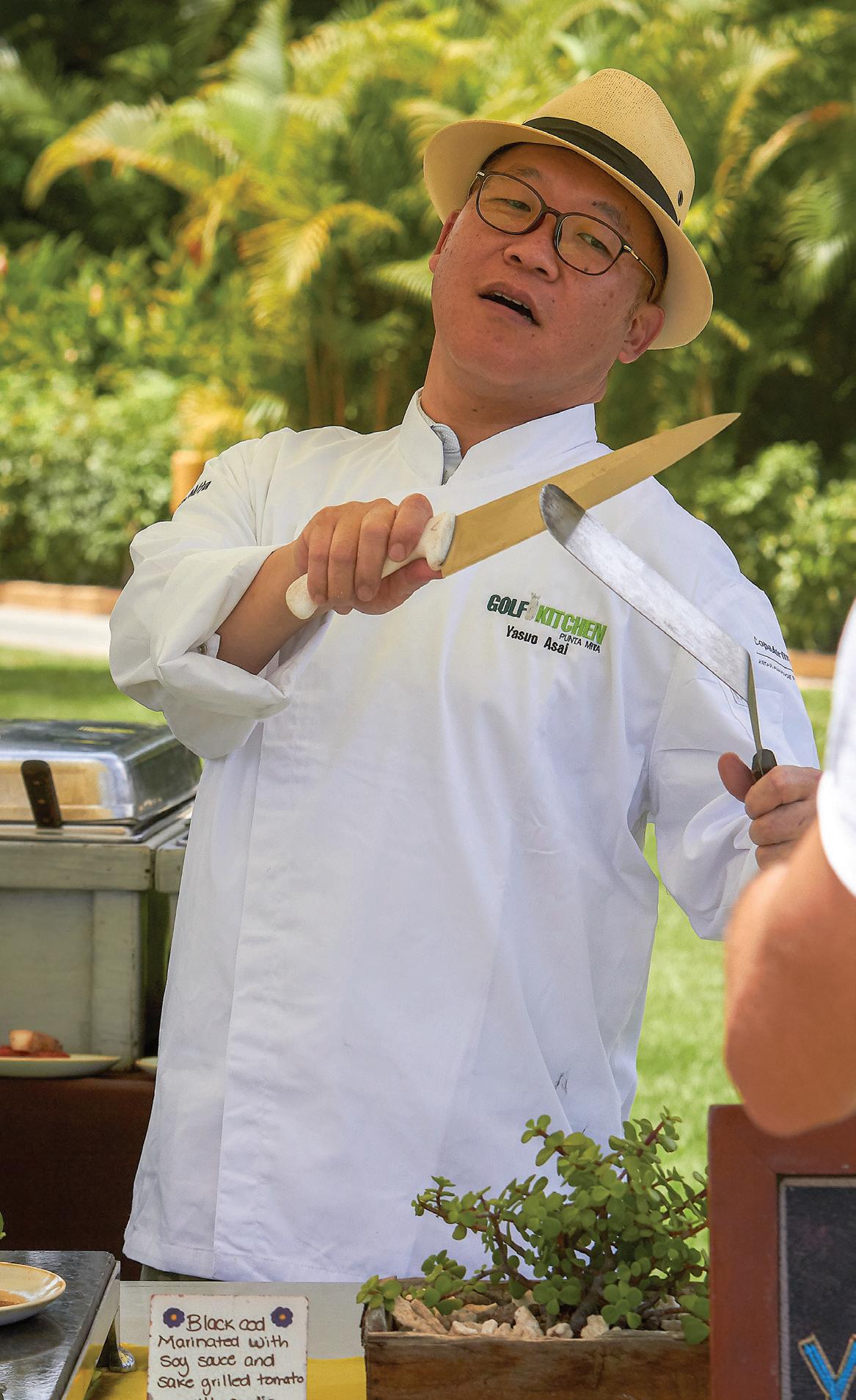
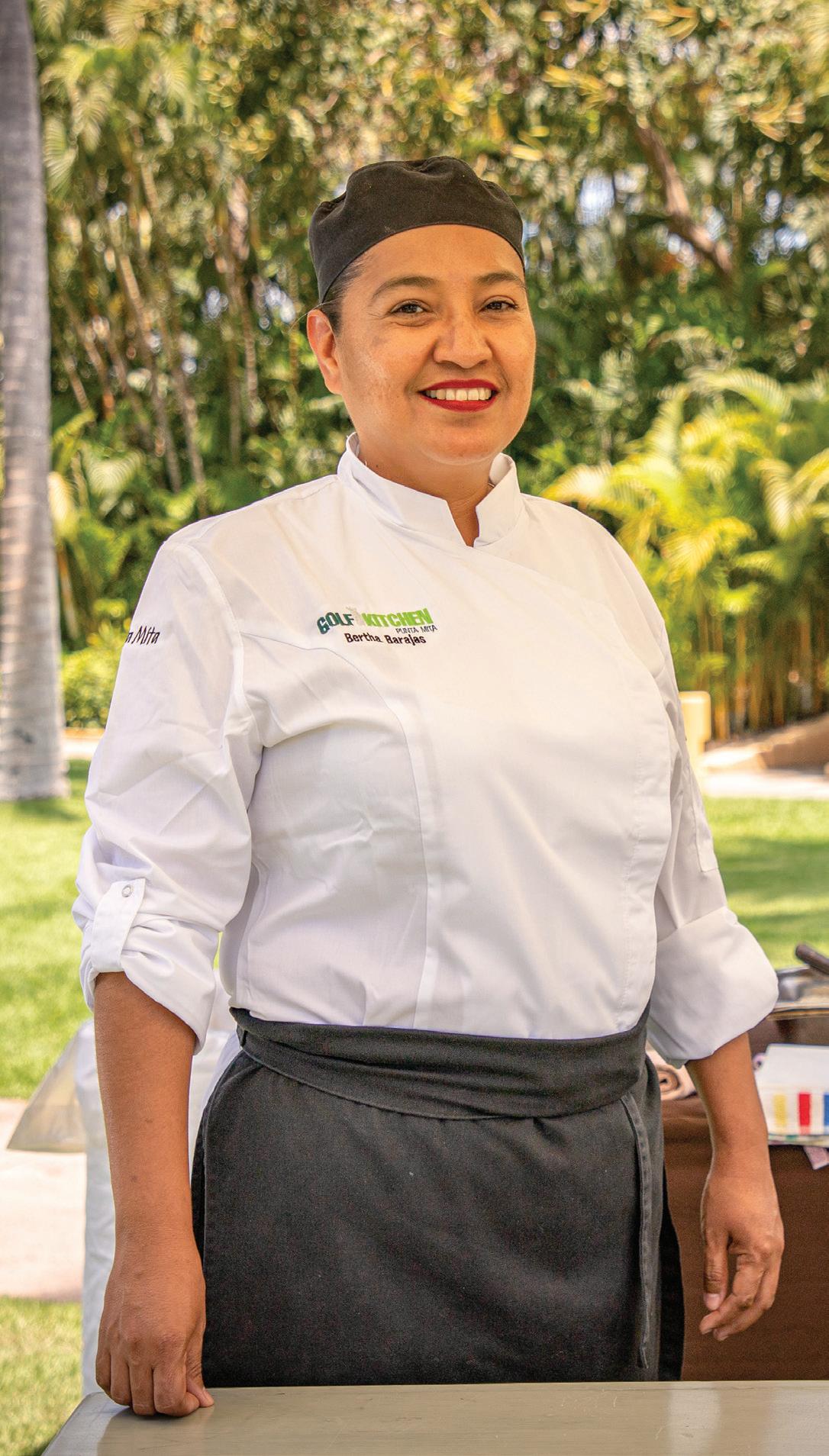 The winners of the 2019 Golf Kitchen Cup at Punta Mita, (left to right) Ricardo Trueba, Mario Alonso, Ricardo Trueba Jnr. and Jansoulet Alonso.
Chef Yasuo Asai.
Chef Bertha Alicia Barajas.
The winners of the 2019 Golf Kitchen Cup at Punta Mita, (left to right) Ricardo Trueba, Mario Alonso, Ricardo Trueba Jnr. and Jansoulet Alonso.
Chef Yasuo Asai.
Chef Bertha Alicia Barajas.
* Chef José Carles Fabregás: Local Totoaba in Lentil Stew, Green Plantain Bollitas and Crispy Skin Chicharron
* Chef Anthony Giacoponello: Braised Boneless Short Ribs, Truffle Root Vegetable Puree, Tomato Confit, and Sauce
* Chef Tony Villanueva: White Chocolate Cheesecake, Strawberry Lime Agave Compote.
* Wine pairings: Monte Xanic Vina Kristel Sauvignon Blanc, Guadalupe Valley, Mexico; Lapostolle Cabernet Sauvignon and Don Leo Stellar Digestivo Cabernet Sauvignon, Parras Valley, Mexico
“Golf Kitchen Punta Mita is a unique event in its own right. Sharing the culture and stories of chefs from all over the world was incredible. This event brought together great international chefs at an amazing property. I cannot wait to see what the next Golf Kitchen event will be in 2020,” said Chef José Carles Fabregás.
A delectable farewell brunch at Kupuri beach club’s al fresco restaurant on the final day made for a reflective gathering. The chefs shared thoughts and sentiments about being at GKPM and their participation in the extraordinary event. Sunday’s wrap-up repast punctuated the essence of Golf Kitchen Punta Mita’s 2019 edition.
Chef Pato Pérsico and his staff put out an extravagant buffet that would have sufficed. However, four guest chefs took it to another level with servings of delicious samplings that included:
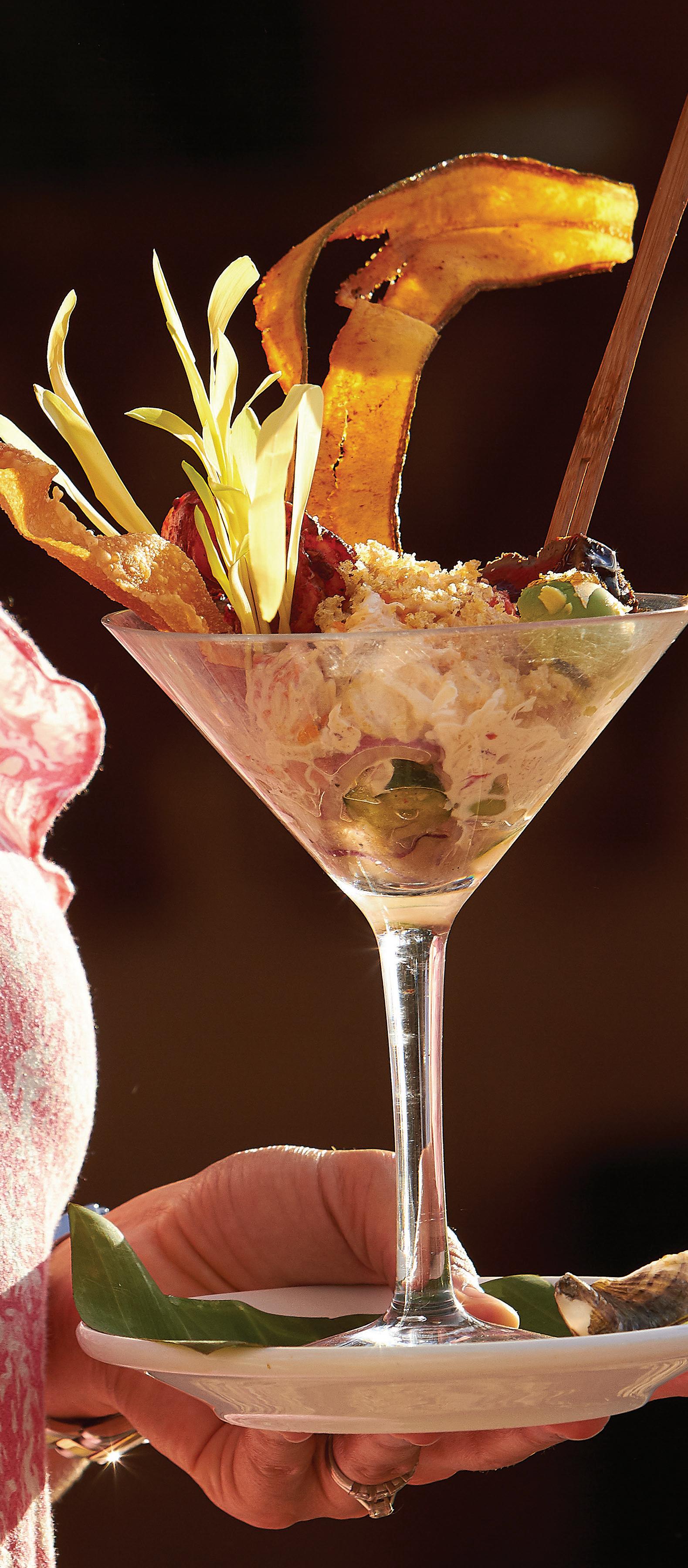
* Pork Bondiola and Shrimp by Chef Marcelo Pereyra
* Octopus ceviche, Acapulco Ceviche, Octopus Cocktail with Sauces by Chef Lalo Palazuelos
* Spinach Pascualina and Tomato Salad and Entrecote Milanese Sandwiches by Chef Gastón Yelicich
*Burned Tomato, Rôsti Potato Avocado and Egg, and “Banderita grill” with Chimichurri by Chef Ricki Motta.
The combination of scrumptious brunch creations boinked a closing
The Millionaire Martini, created by Chef Damian Gilchrist.
Golf Kitchen Punta Mita 77
exclamation mark on a parade of remarkable cuisine. It was a fitting finish to four fantastic days of golf, food, wine, hospitality, and camaraderie at a lovely tropical paradise by the sea in Mexico.
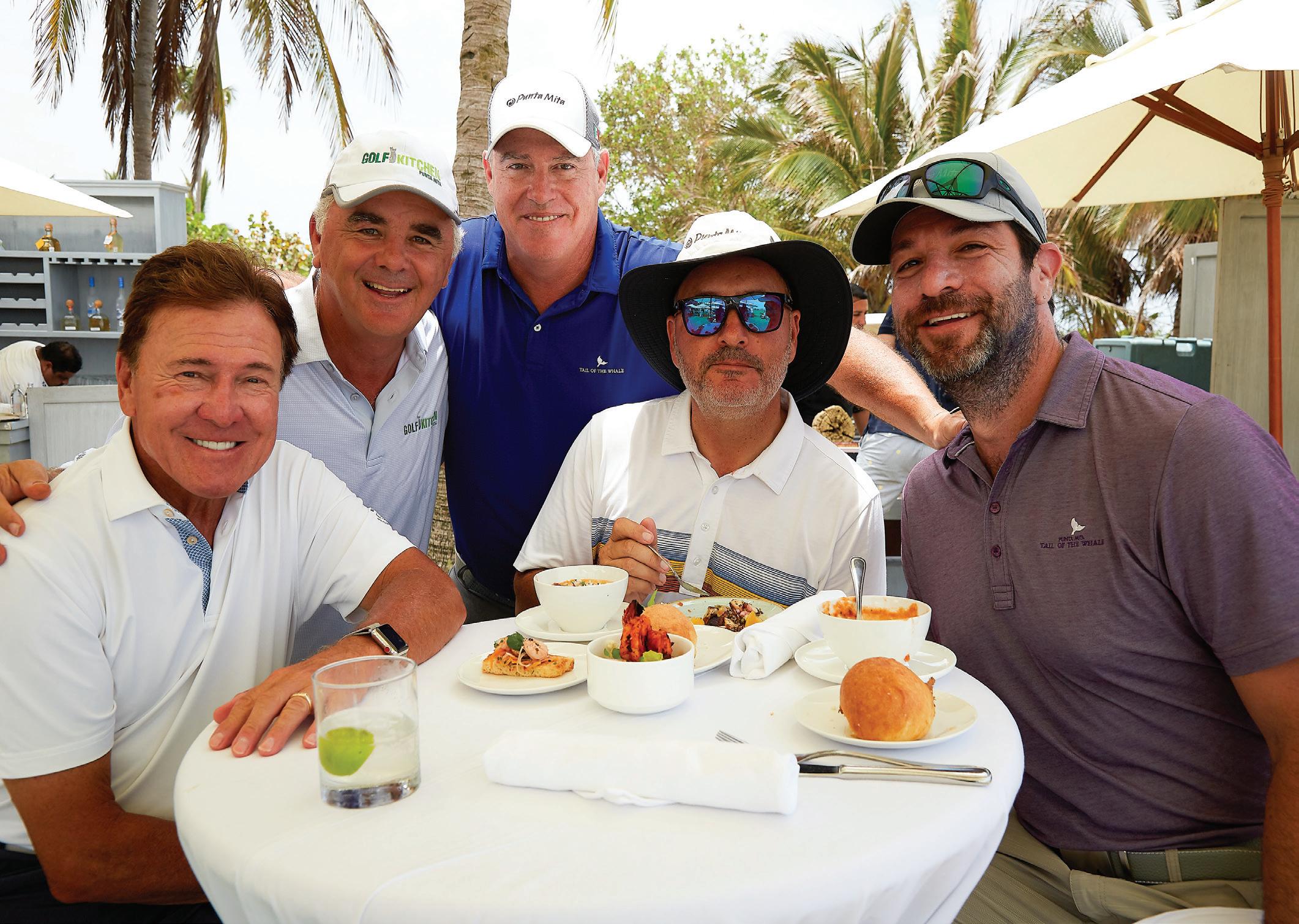
“This edition of GKPM was for me the first time as a co-host chef. It was great to communicate with Chef Pato Pérsico to plan and bring all the chefs recipes and ideas together, and then finally to meet them in person. What a wonderful group of chefs: their personalities, cuisine, techniques, and passion for cooking created an amazing experience. The aromas and flavors during the cooking sessions were incredible. I was so delighted and most enjoyed seeing my team so excited about learning and meeting new chefs in their Punta Mita kitchens. It was very motivational for the soul of the team. Tasting all the food coming out from the stations, followed by smiles and a great vibe made doing Golf Kitchen Punta Mita 2019 a real joy,” expressed Chef Jorgé Gonzalez.
The Golf Kitchen concept of bringing together a lineup of accomplished chefs from prestigious golf clubs and resorts worldwide to share and showcase unexcelled flavorful cuisine is unique and should be recognized. Nowhere else is there an opportunity for a diverse collective of chefs to work side-by-side in the development of such a spectacular event.
“From its inception, the intent and essence of the Golf Kitchen brand have been to bring exclusive private golf club and resort chefs together in their very own club for and about them, which is Golf Kitchen.
It is a surreal moment in time to witness my vision come to life over and over again as we continue to build our team of clubs and chefs with each event. The bonds and friendships I have witnessed developing since the first event at Winged Foot Golf Club some years ago are unquestionably rewarding. It gives me and others
the spirit and courage to continue to believe in and carry on, “ shared Diana Delucia, founder, publisher, and maestro of Golf Kitchen.
The camaraderie of these dynamic culinarians is magical, as is their most delicious creations that are appreciated and savored. Perhaps magical is what best describes the experience for the chefs and participants in Golf Kitchen events.
In many ways, the experiences of the international guest chefs at Golf Kitchen Punta Mita appear quite similar to what each two-player team feels when golfing in the tournament at GKPM or at clubs anywhere. It’s the camaraderie that draws us to golf time and again while facilitating the enjoyment and freedom to be together in friendship, a basic human need as social beings.
If golfing and gastronomy are your interest or passion, it doesn’t get much better than to experience a
(Left to right) Ron Budacz, Carl Emberson, John T. McIntyre, Luis Ituarte, and Marcelo Lopez enjoying flavorful choices after a round of golf.
Golf Kitchen Magazine 78
Golf Kitchen event at a lovely, tropical, oceanside setting. It’s delighfully unforgettable.
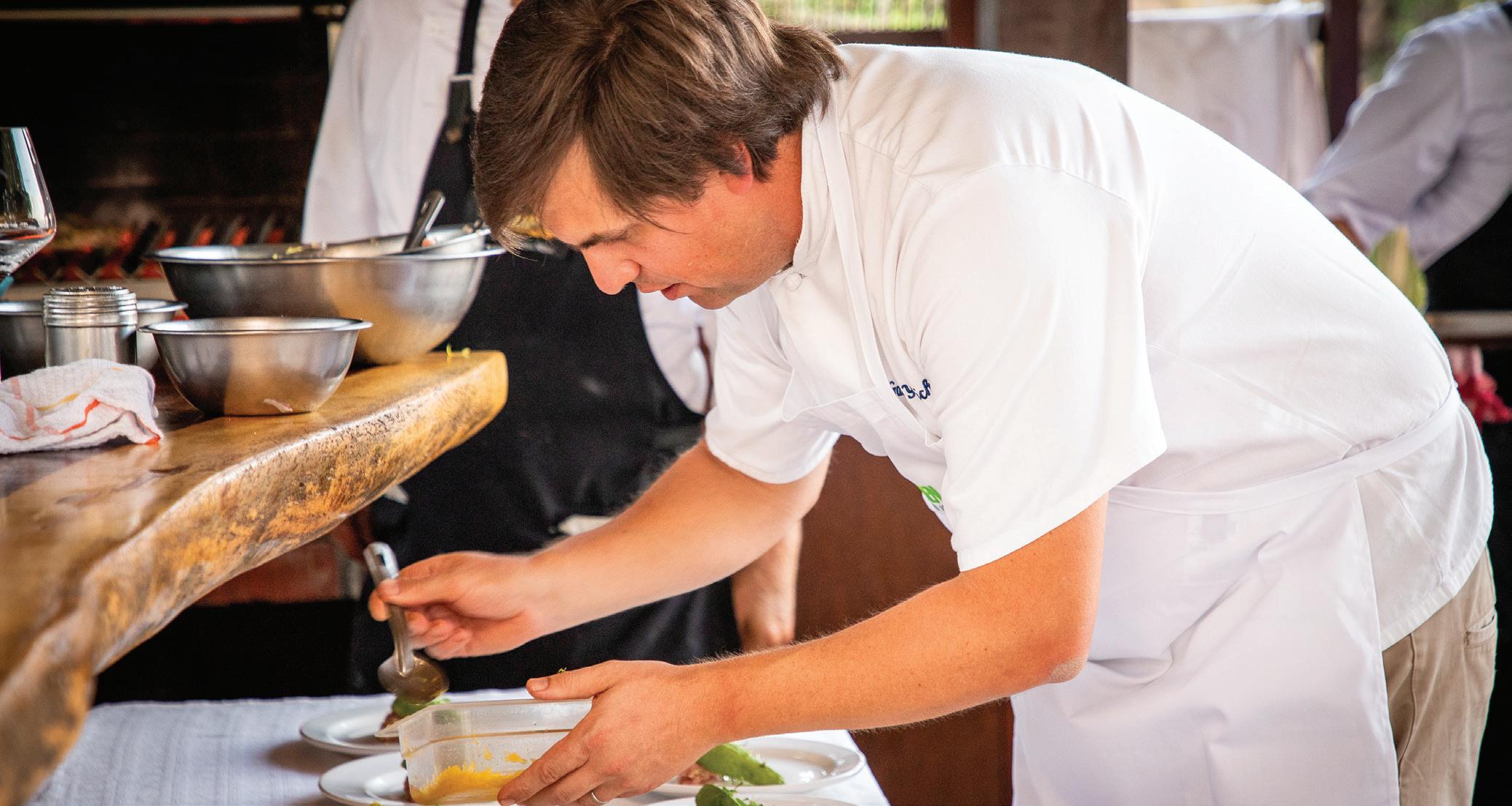

Bill Nestor
Golf Kitchen Punta Mita 2019 sponsors: Riviera Nayarit Visitors & Convention Bureau, St Regis Punta Mita Resort, Grey Goose, Tequila Patron and Copa Airlines. A silent and live auction raised funds for Peace & Fundacion Punta de Mita https://peacepuntademita.org/
For more information:
Golf Kitchen books, magazine, and events: www.golfkitchen.com
2019 Golf Kitchen Punta Mita event: http://golfkitchenpuntamita.com
Punta Mita Resort and Punta Mita Golf Club: www.puntamita.com
Chef Marcelo Pereyra.
Chef Gaston Yelicich.
Golf Kitchen Punta Mita 79

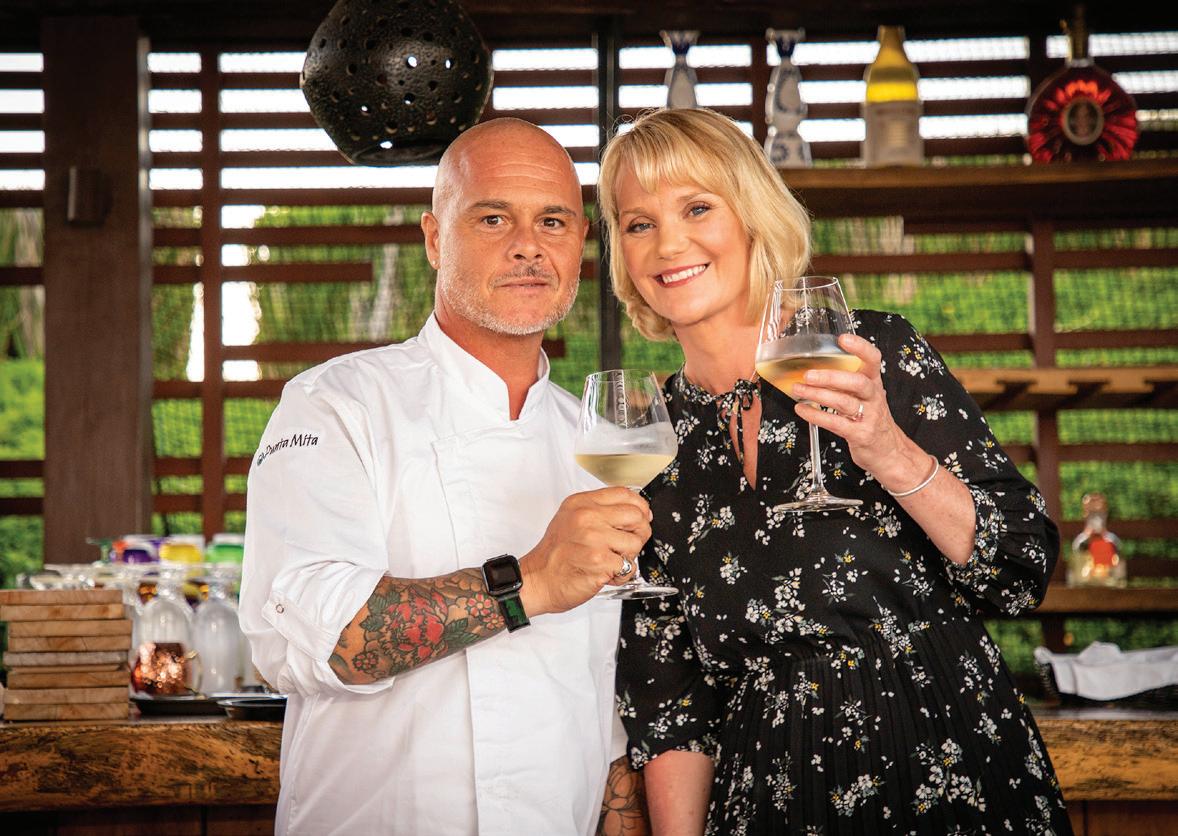
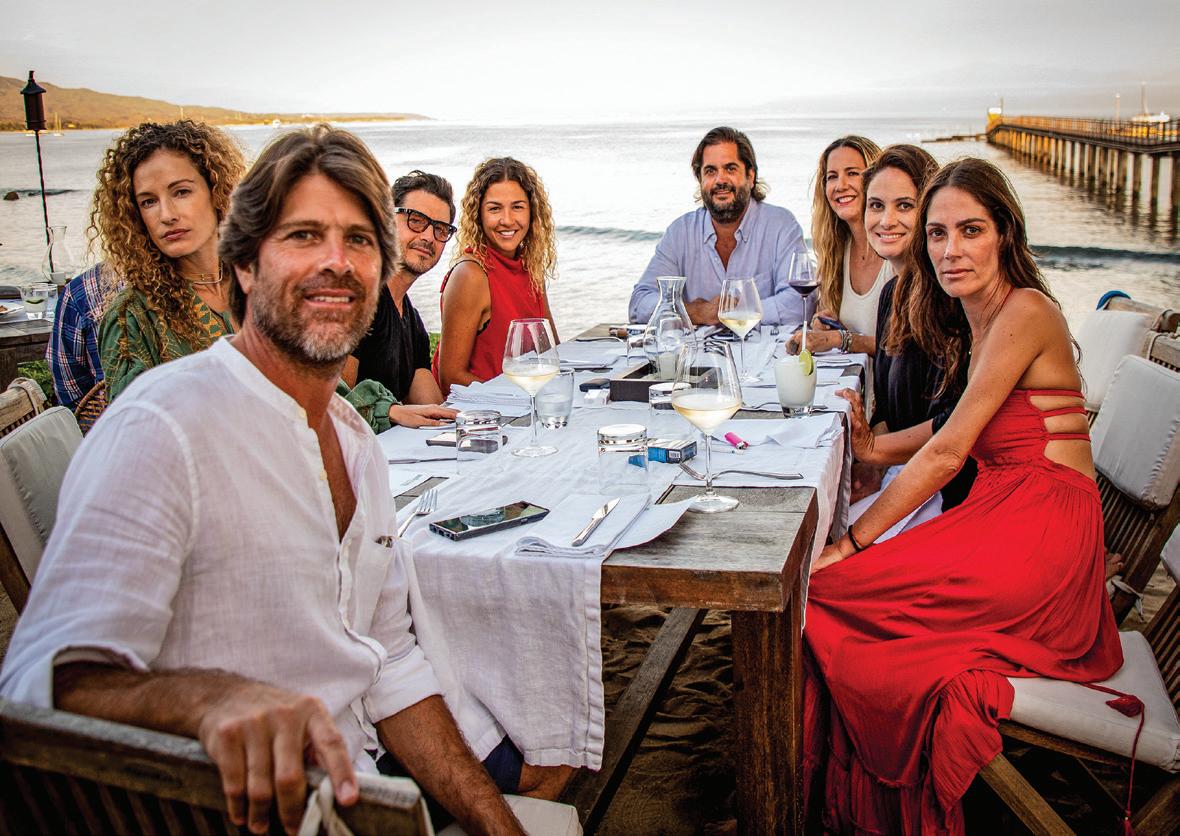
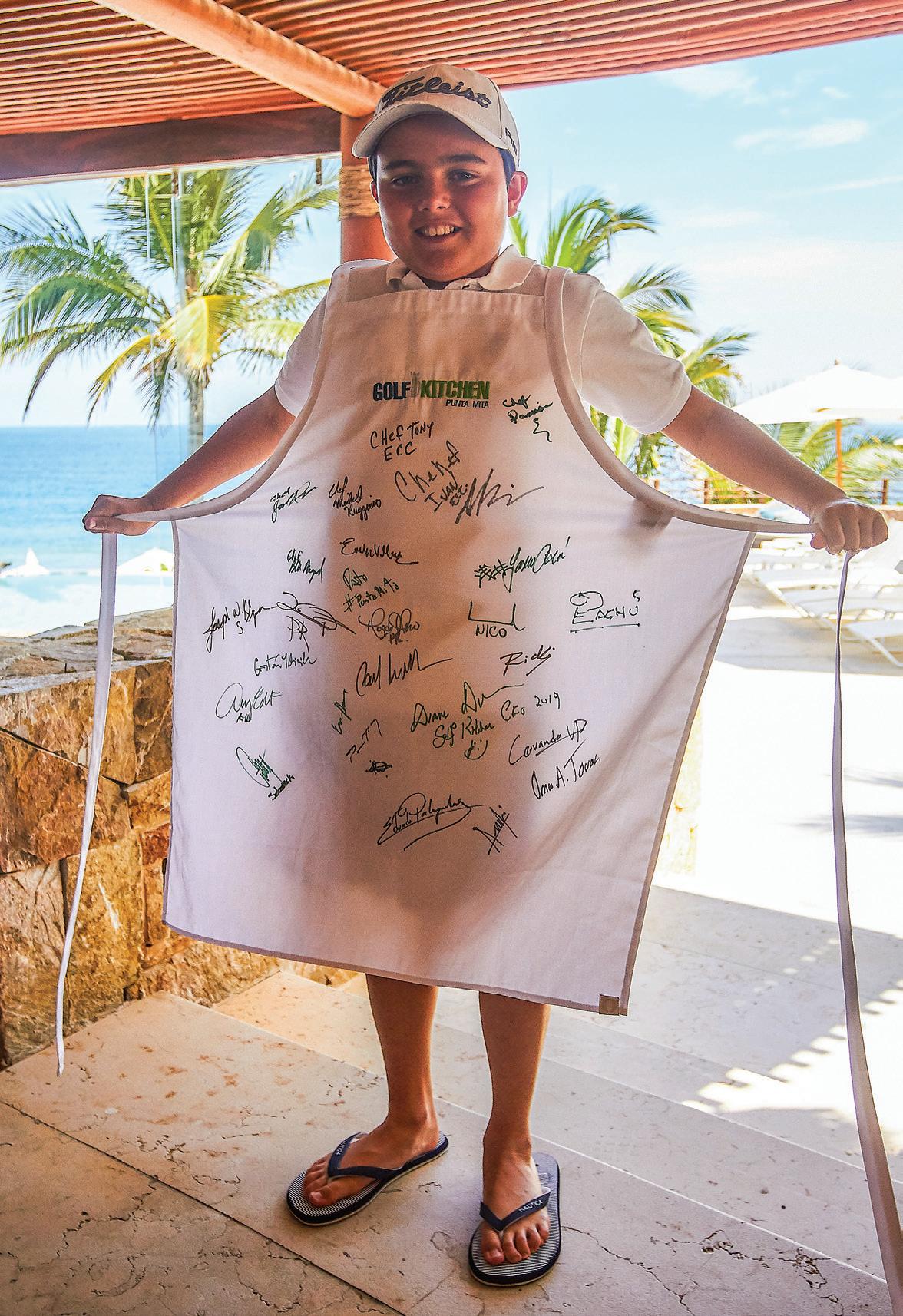

 (Left to right) Rana Que and Chef Gaston Yelicich at Sufi.
Guests enjoy the dinner at Sufi.
Chef Blake Burgard.
Ricardo Trueba Jnr. winner of The Golf Kitchen Cup, 2019.
Chef Pato Persico and Diana DeLucia.
Left to right: Chef Ricki Motto, Chef Marcelo Pereyra and Andrea Perez, Nicolas Kovalenko, Delfina Pereyra, Chef Yasuo Asai, Chef Jose Carles, Magda Toro and Chef Pato Persico at Sufi.
(Left to right) Rana Que and Chef Gaston Yelicich at Sufi.
Guests enjoy the dinner at Sufi.
Chef Blake Burgard.
Ricardo Trueba Jnr. winner of The Golf Kitchen Cup, 2019.
Chef Pato Persico and Diana DeLucia.
Left to right: Chef Ricki Motto, Chef Marcelo Pereyra and Andrea Perez, Nicolas Kovalenko, Delfina Pereyra, Chef Yasuo Asai, Chef Jose Carles, Magda Toro and Chef Pato Persico at Sufi.


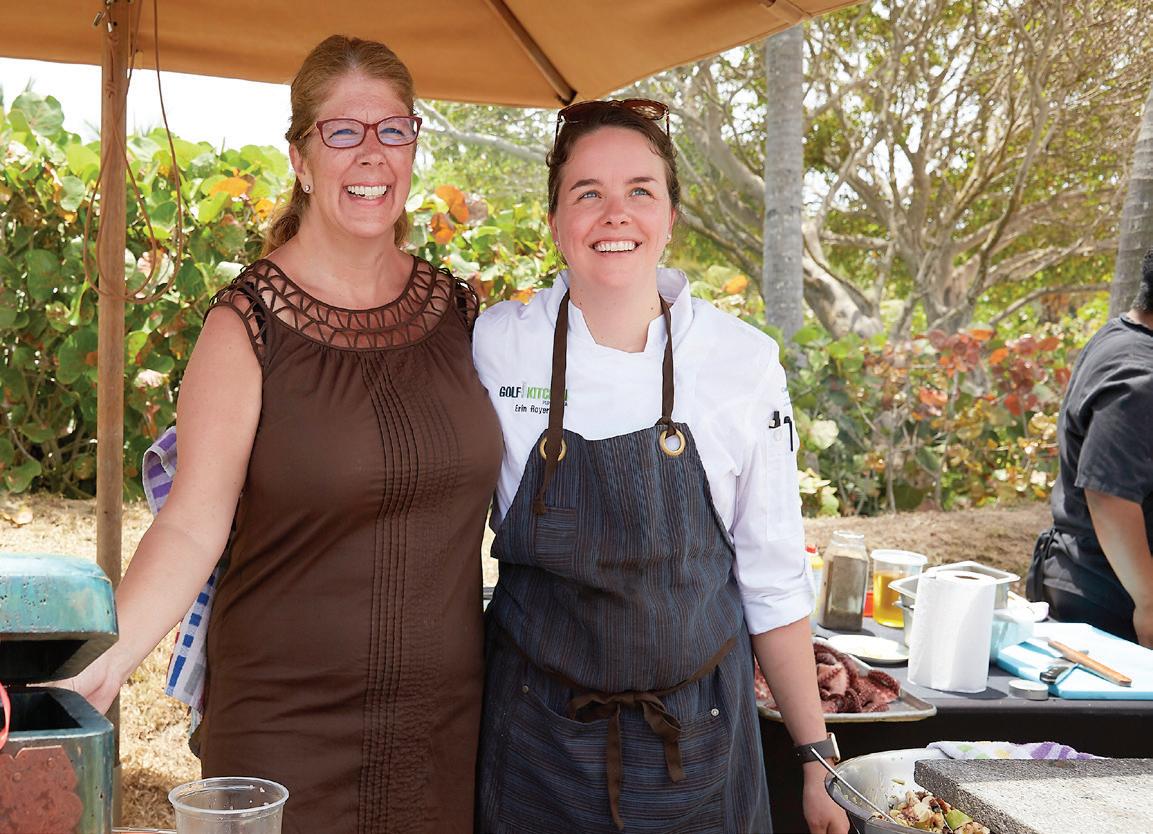
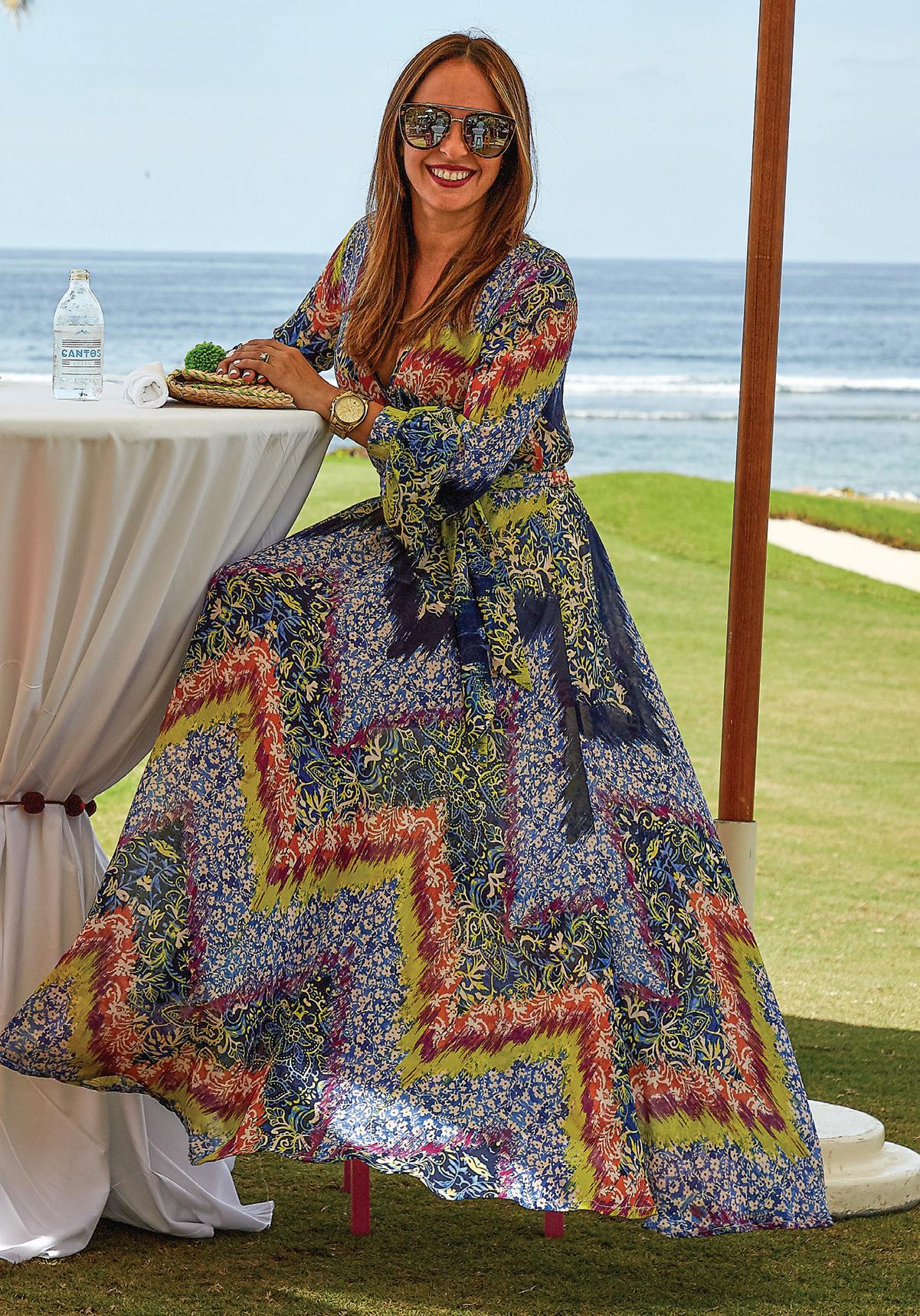
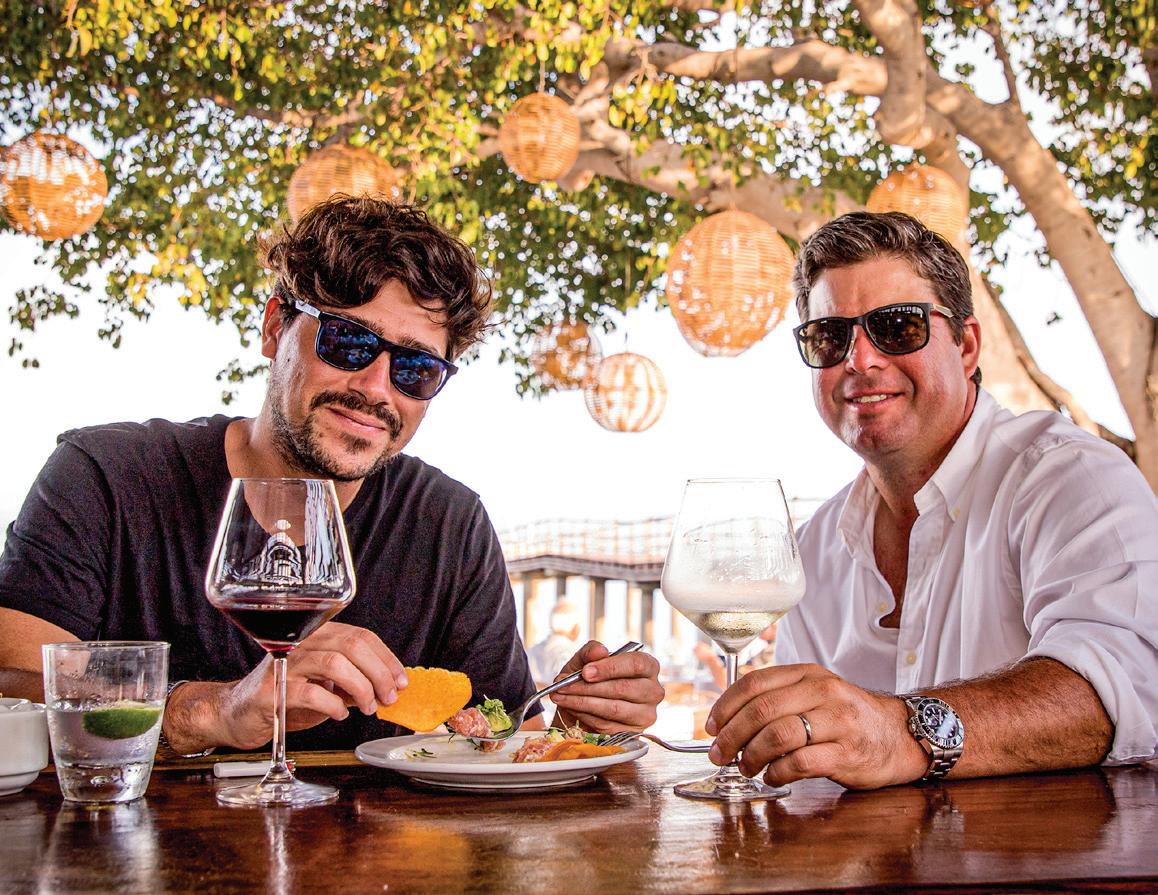
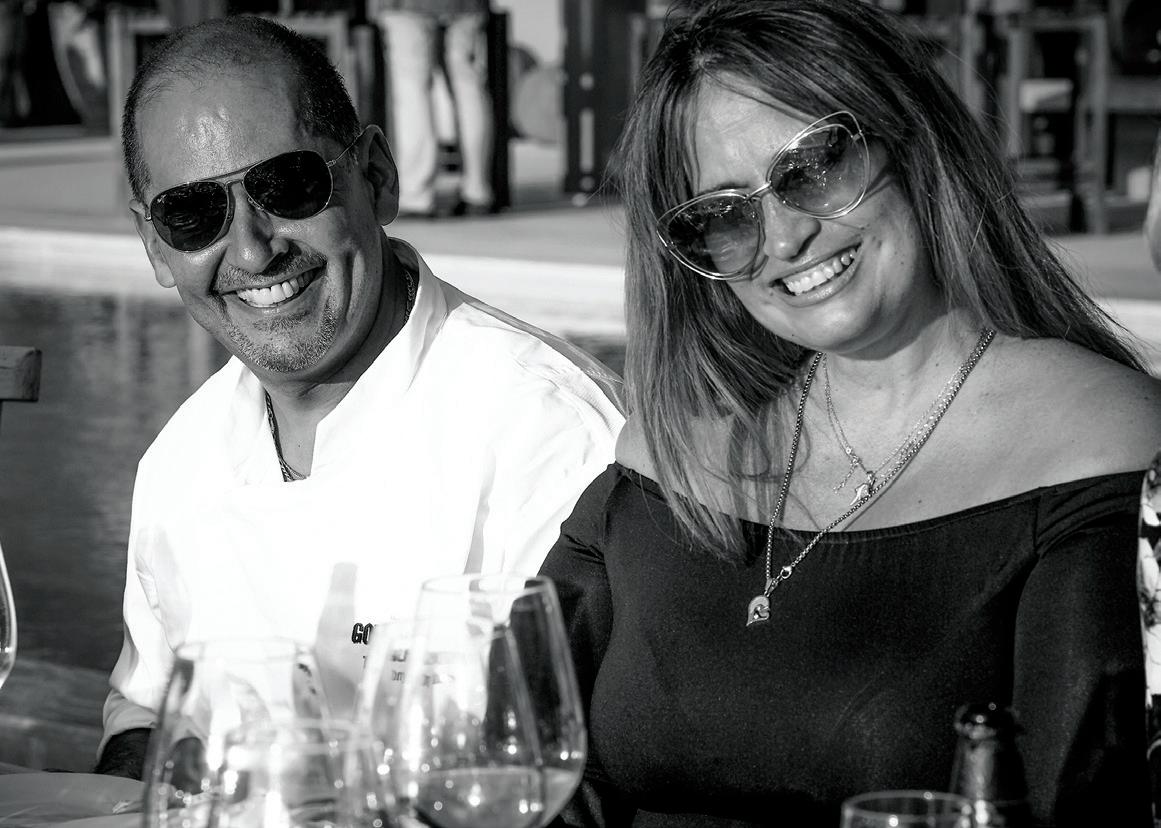 Chef Marcelo Pereyra and Chef Lalo Palazulez at Kupuri Beach Club.
Chef Lalo Palazuelez. Amy Everett and Chef Erin Royer
Chef TonyVillanueva and Evelyn Villanueva.
Chef Ricki Motta and Nicolas Kovalenko.
Magda Toro enjoys the luncheon on day two of The Golf Kitchen Cup.
Chef Marcelo Pereyra and Chef Lalo Palazulez at Kupuri Beach Club.
Chef Lalo Palazuelez. Amy Everett and Chef Erin Royer
Chef TonyVillanueva and Evelyn Villanueva.
Chef Ricki Motta and Nicolas Kovalenko.
Magda Toro enjoys the luncheon on day two of The Golf Kitchen Cup.







 Chef Tony Villanueva.
Chef Yasuo Asai.
Chef Ivan Villanueva.
Chef Michael Ruggiero.
Chef Doug Blair. Joseph Klages.
Chef Gaston Yelicich.
Chef Marcelo Pereya.
Chef Tony Villanueva.
Chef Yasuo Asai.
Chef Ivan Villanueva.
Chef Michael Ruggiero.
Chef Doug Blair. Joseph Klages.
Chef Gaston Yelicich.
Chef Marcelo Pereya.
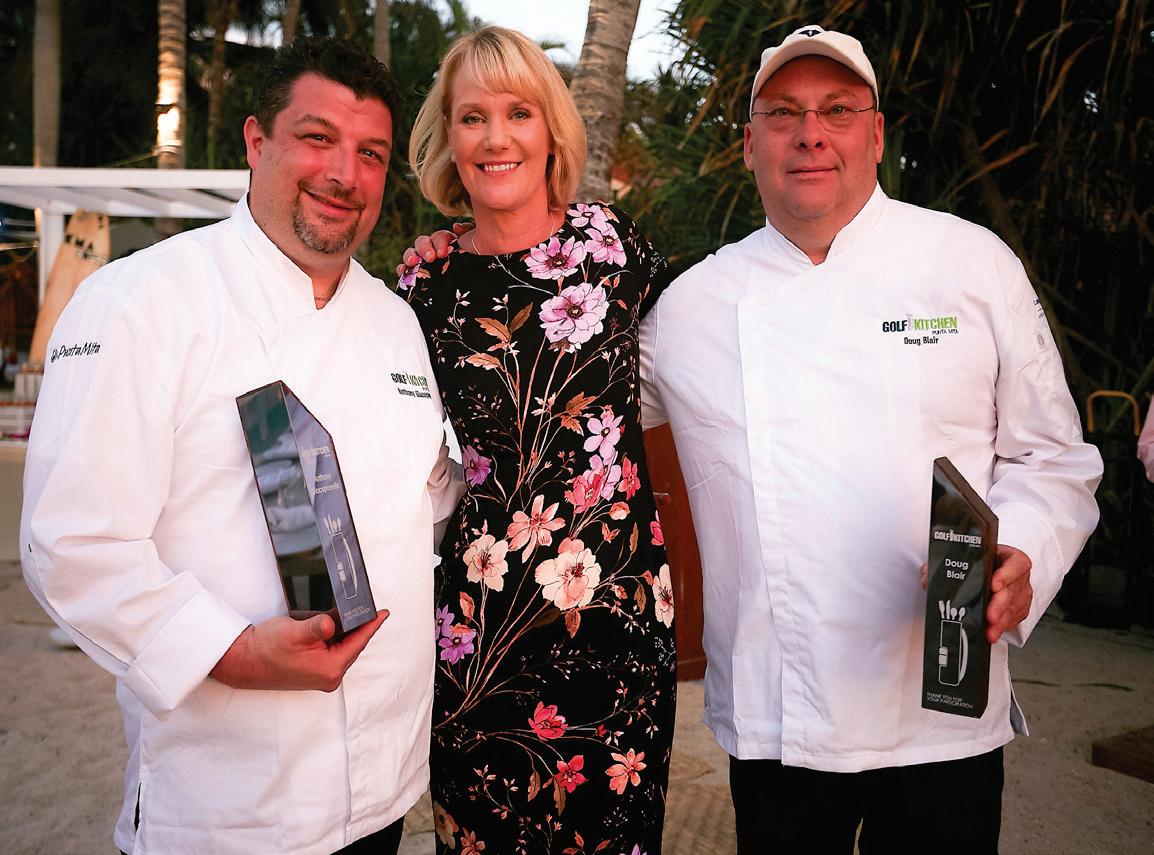
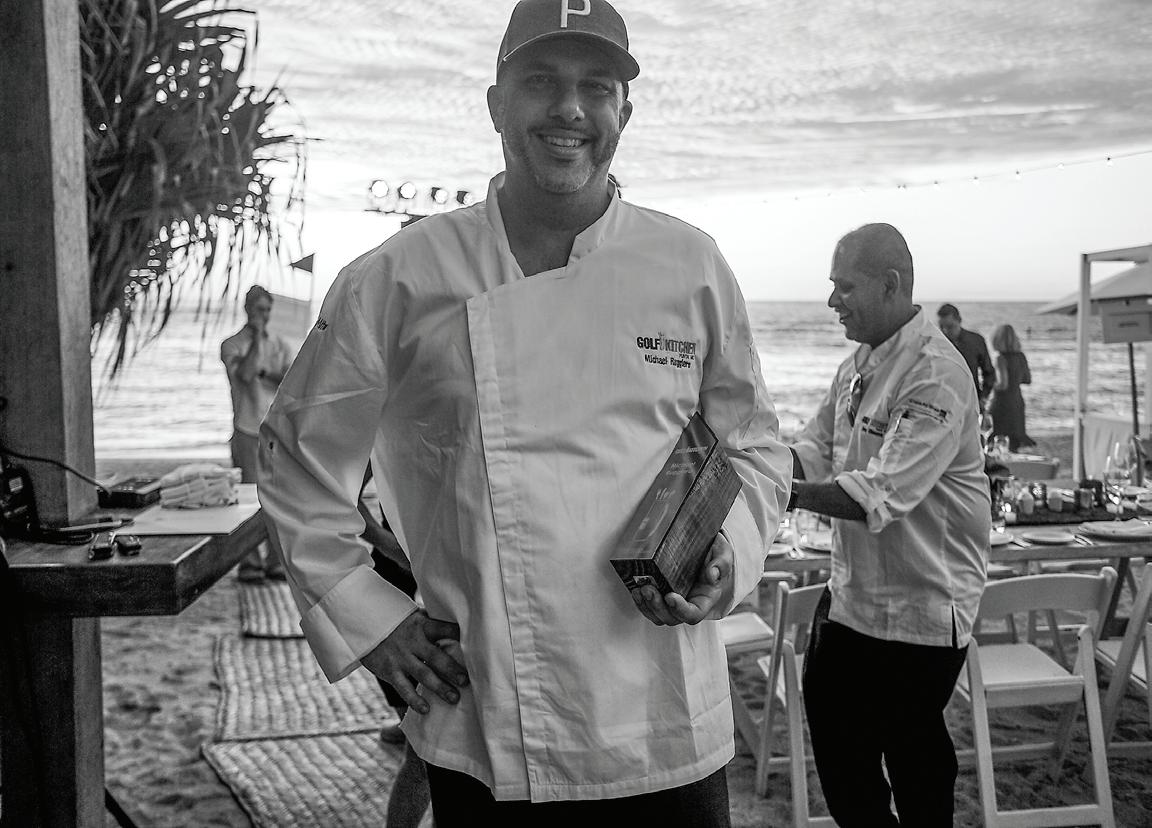

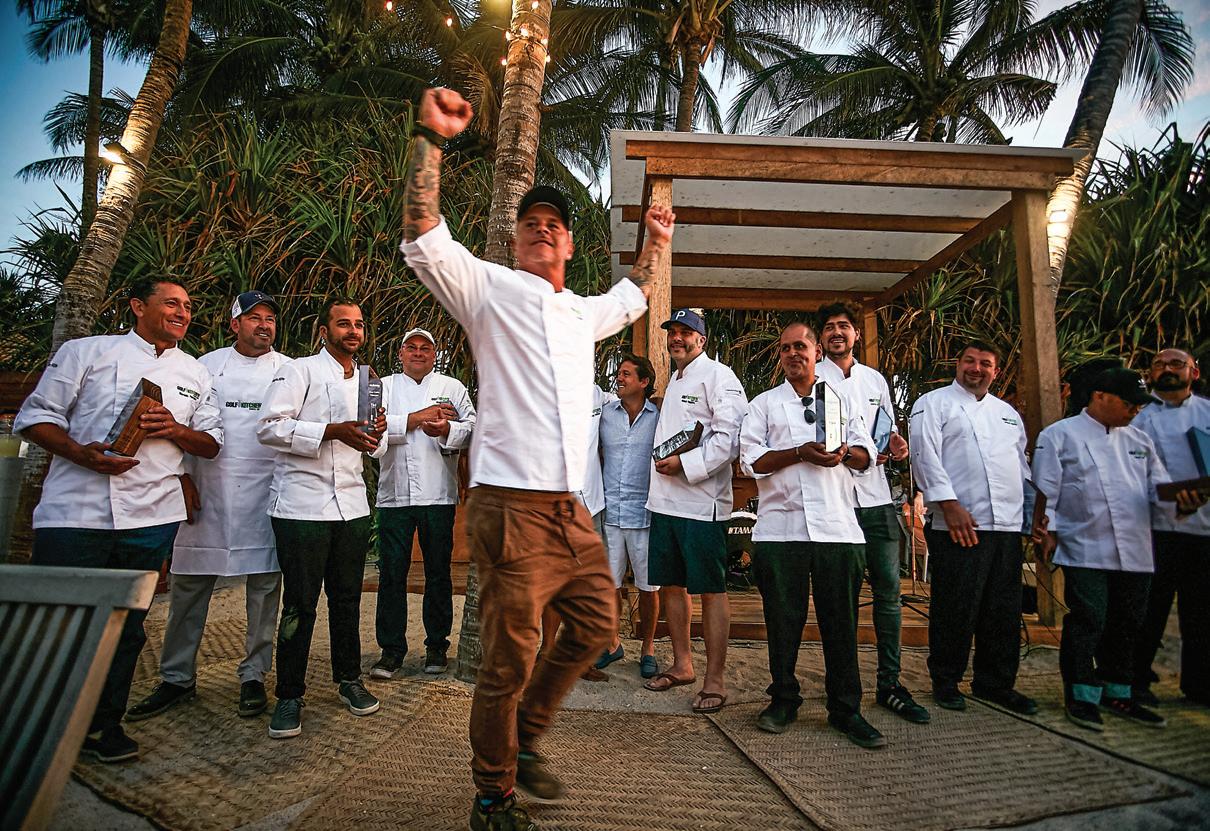
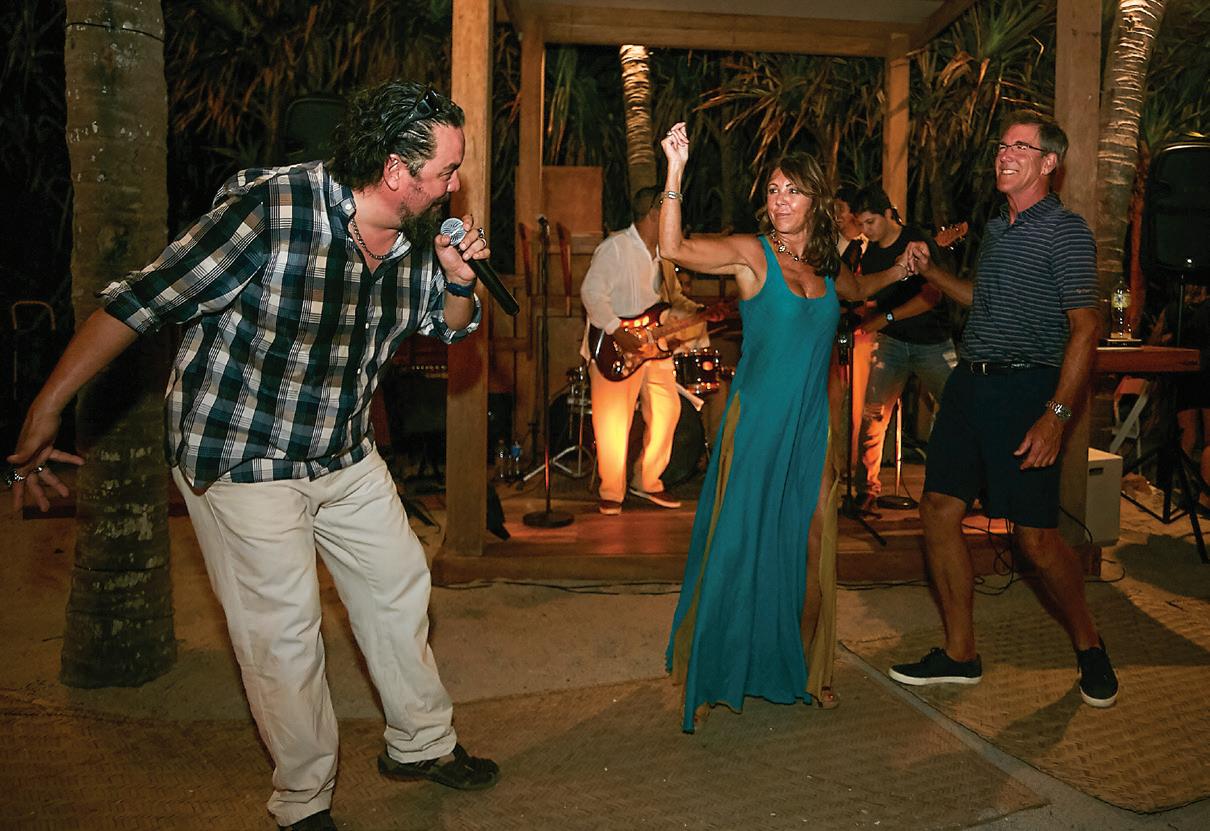
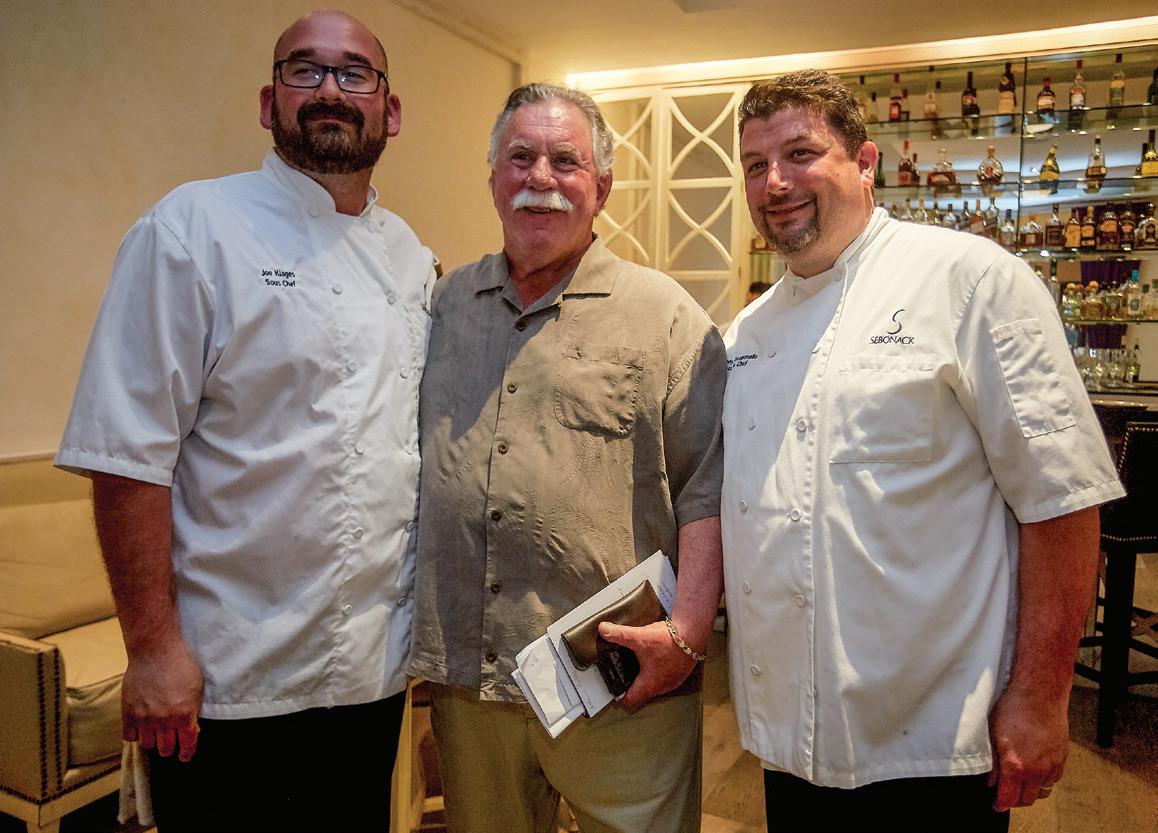
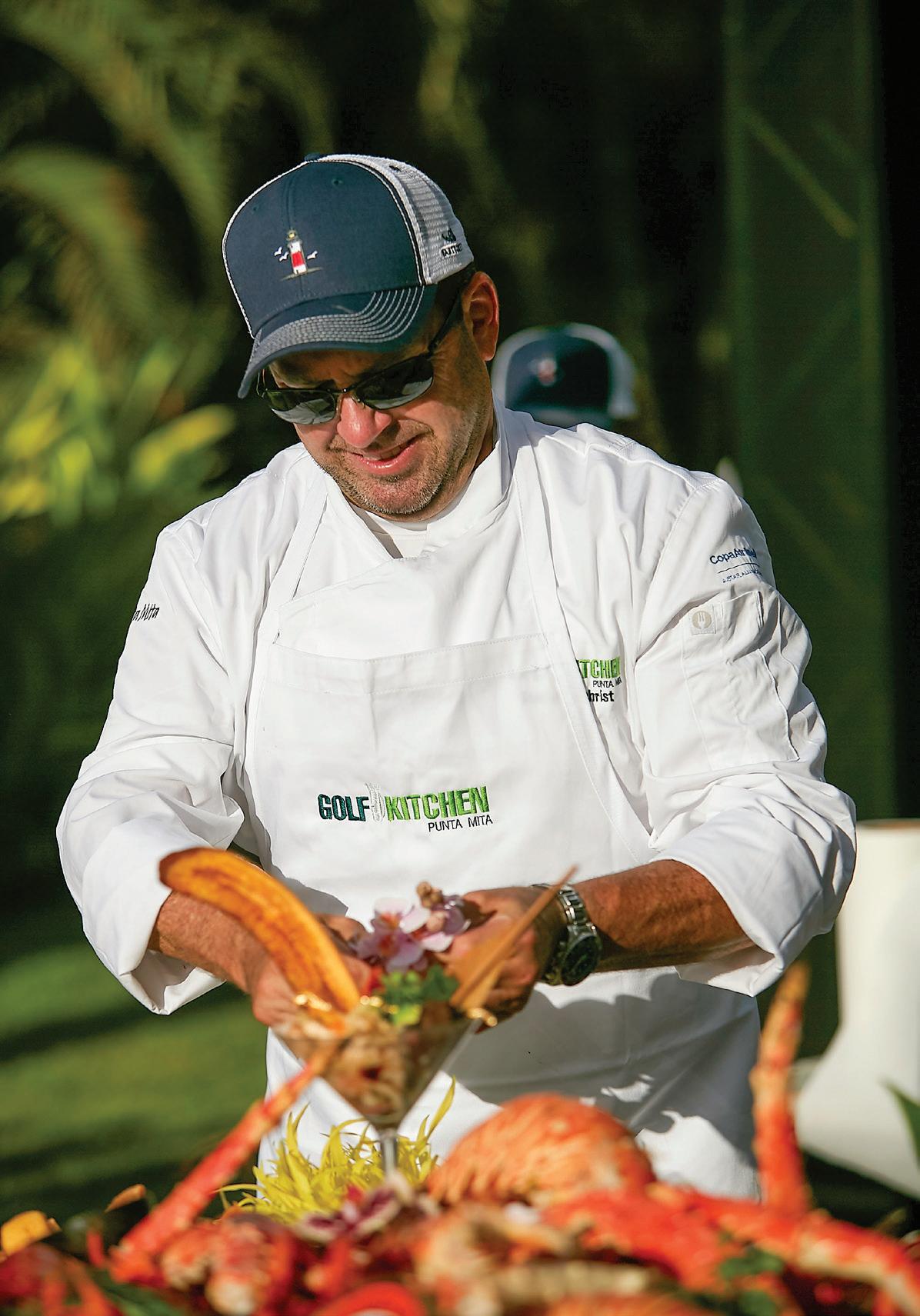 Chefs celebrate at the opening dinner.
Nancy and Clarke Connor enjoy a dance with the Punta Mita band.
Chef Damian Gilchrist.
Chefs pose for photographers at the opening dinner. Chef Michael Ruggiero.
(Left to right) Chef Joseph Klages, Bill Nestor and Chef Anthony Giacoponello.
(Left to right) Chef Anthony Giacoponello, Diana DeLucia and Chef Doug Blair.
Chefs celebrate at the opening dinner.
Nancy and Clarke Connor enjoy a dance with the Punta Mita band.
Chef Damian Gilchrist.
Chefs pose for photographers at the opening dinner. Chef Michael Ruggiero.
(Left to right) Chef Joseph Klages, Bill Nestor and Chef Anthony Giacoponello.
(Left to right) Chef Anthony Giacoponello, Diana DeLucia and Chef Doug Blair.


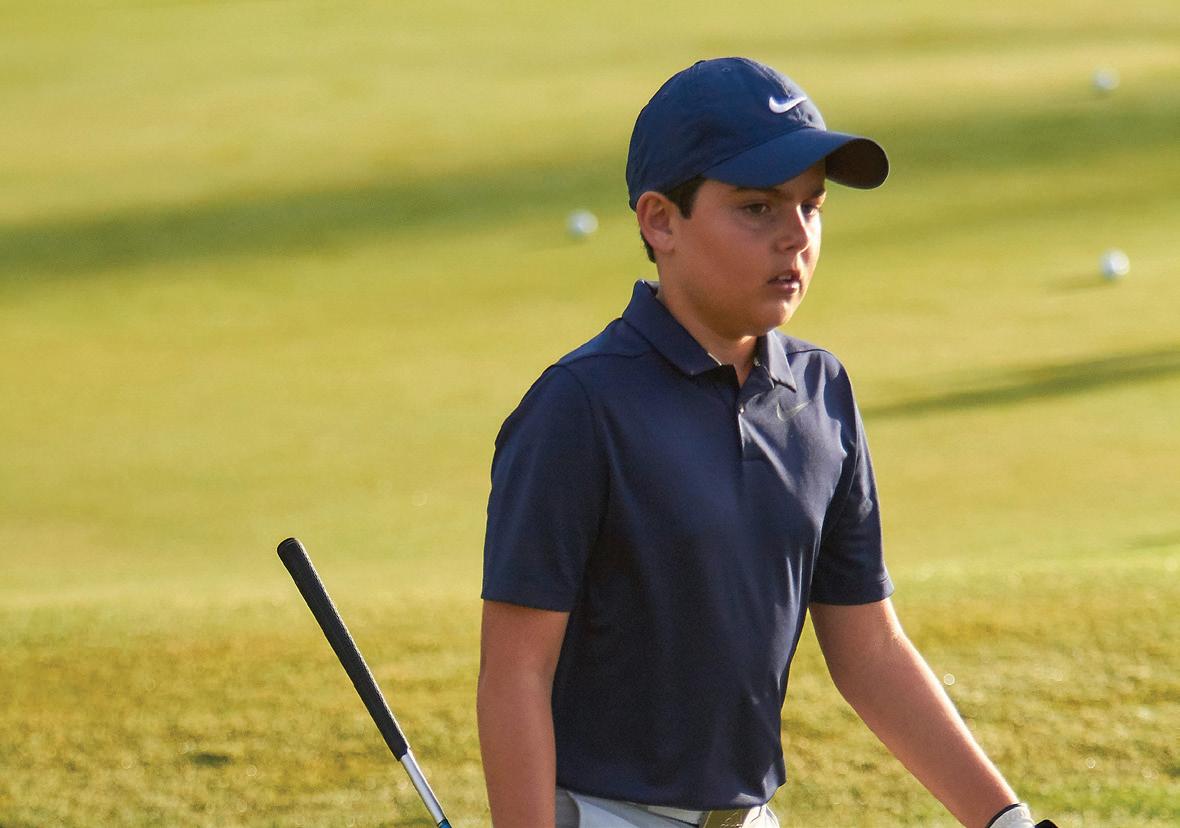



 (Left to right) Bill Nestor with Chef Marcelo Pereyra.
Donna Smith on the tee box at The Tale of the Whale.
Residents Dermott and Martina O’Flanagan, 2018 defending champions.
John T. McIntyre, Director of Golf at Punta Mita.
Ricardo Trueba Jnr. eleven year old winner of The Golf Kitchen Cup, 2019.
(Left to right) Chef Jorge Gonzalez and Chef Tony Villanueva take a selfie.
(Left to right) Bill Nestor with Chef Marcelo Pereyra.
Donna Smith on the tee box at The Tale of the Whale.
Residents Dermott and Martina O’Flanagan, 2018 defending champions.
John T. McIntyre, Director of Golf at Punta Mita.
Ricardo Trueba Jnr. eleven year old winner of The Golf Kitchen Cup, 2019.
(Left to right) Chef Jorge Gonzalez and Chef Tony Villanueva take a selfie.

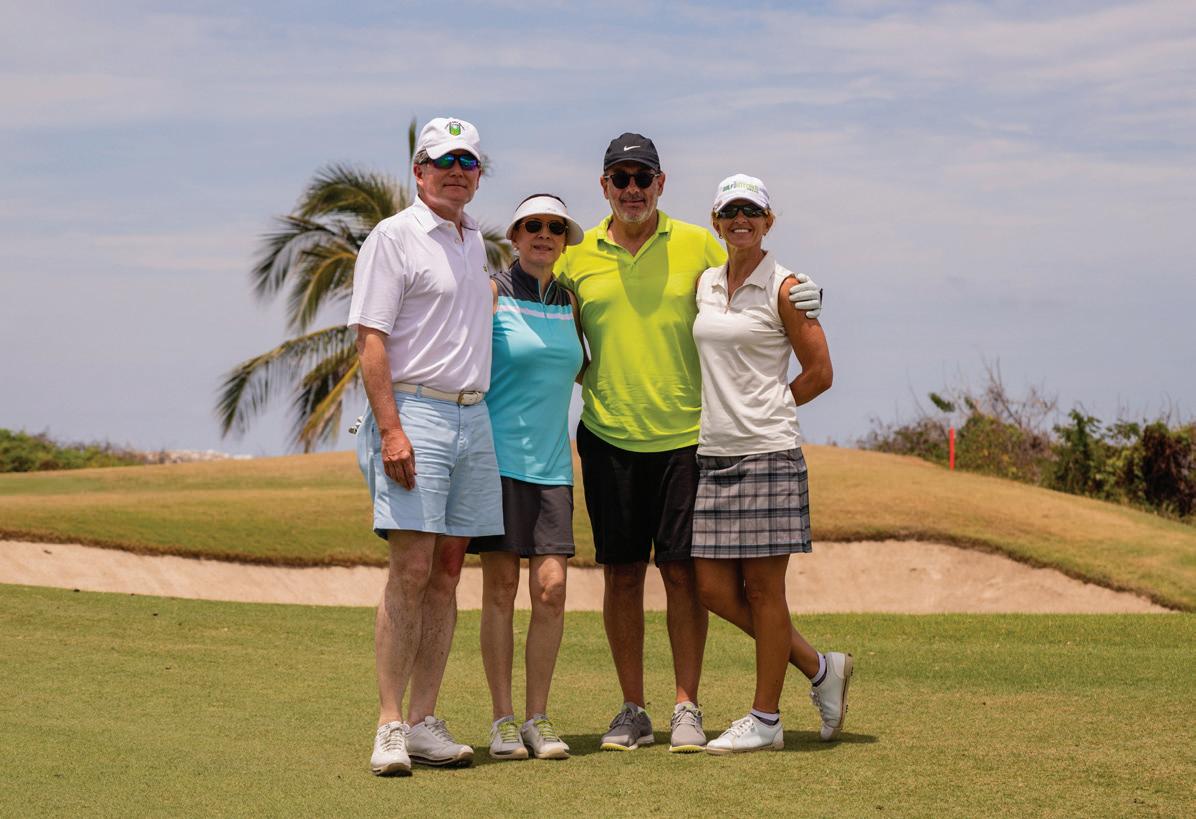




 (Left to right: Residents Nancy and Clare Connor and guest.
Members and guests pose for the cameras during play.
Nothing like a great bunker shot!
(Left to right) John T. McIntrye and Tom Stickney II, Director of Instruction at Punta Mita Golf.
Chef Blake Burgard and Chef Michael Ruggiero.
Young golfers enjoying the day.
Chef Jared Ashton.
(Left to right: Residents Nancy and Clare Connor and guest.
Members and guests pose for the cameras during play.
Nothing like a great bunker shot!
(Left to right) John T. McIntrye and Tom Stickney II, Director of Instruction at Punta Mita Golf.
Chef Blake Burgard and Chef Michael Ruggiero.
Young golfers enjoying the day.
Chef Jared Ashton.
The Royal Melbourne Golf Club Black Rock Australia


Anthony Dole Executive Chef
I am an Australian native and lived in Melbourne for 18 years, and it is the birthplace of my two daughters. We moved to the United States in 2002, and when I started my business Golf Kitchen in 2014, I had longed for the day that I would be welcomed behind the gates at The Royal Melbourne Golf Club. It has been an extraordinary experience getting to know Chef Anthony, he is talented and pleasantly humble for someone with such a substantial culinary background. I hope you enjoy his story and recipes. ~
Diana DeLucia
GK: Tell us about your life before The Royal Melbourne Golf Club.
I was born in Sri Lanka and migrated to Australia in the 1980s when I was 11. Although my parents wanted me to be very successful, they never pressured me and were supportive of what career path I chose. Food was a big part of my life due to my family’s multiple cultures, and it was always exciting at the family dinner table.
I finished high school, with excellent grades, and while I could have gone to any University I wanted, I felt it wasn’t for me. During my senior years at high school, I had started working at the MCG (Melbourne Cricket Ground) as a runner taking care of the Corporate Boxes in the southern stand. I really enjoyed working with the hospitality team and the interesting guests that would come to experience the sporting events. The food that I helped prepare was a big new exciting world for me, very different from what I knew. It was fascinating to observe how the chefs turned everyday food into delicious,
food into delicious, flamboyant, eye and palate-pleasing creations. I became very good at my job. The Executive Chef, Peter, was delighted with my work ethic and asked me if I would be interested in an apprenticeship. When I could not decide, he insisted I go to the interview regardless. To my surprise, the recruiters at Spotless Catering rejected me and told me bluntly that I wasn’t suited to be a chef. That was a bad week at the MCG, and everyone knew it! Seeing that I was upset, Peter asked me what happened. “I didn’t get the job.” “No worries,” he said, “would you like to go and help out the chef at the Art Center, he is looking for someone to work at the Christmas functions?” I said, “Ok, why not.”
Arriving at the Art Center for my first shift, the Chef David yelled at me, “what are you doing here?” – That was an unexpected welcome! Alongside the kitchen brigade, I worked endless hours over three days, and when all was finished, I asked if I was getting paid. Chef David said, “we will see you next month.” Confused, I asked, “what do you mean?” With a winning smile, he answered,” you are starting your apprenticeship.” Astonished, I went back home to tell my parents, who were delighted for me. My dad encouraged me to give it a go, as I could always enroll in Uni afterward if it didn’t work out. That is where my culinary career began.
GK: How long did you stay at the Art Center?
I spend the first year of my apprenticeship working in a restaurant called Treble Clef, then moved on to the Caulfield Racecourse I loved
Golf Kitchen Magazine 88
INTERVIEW
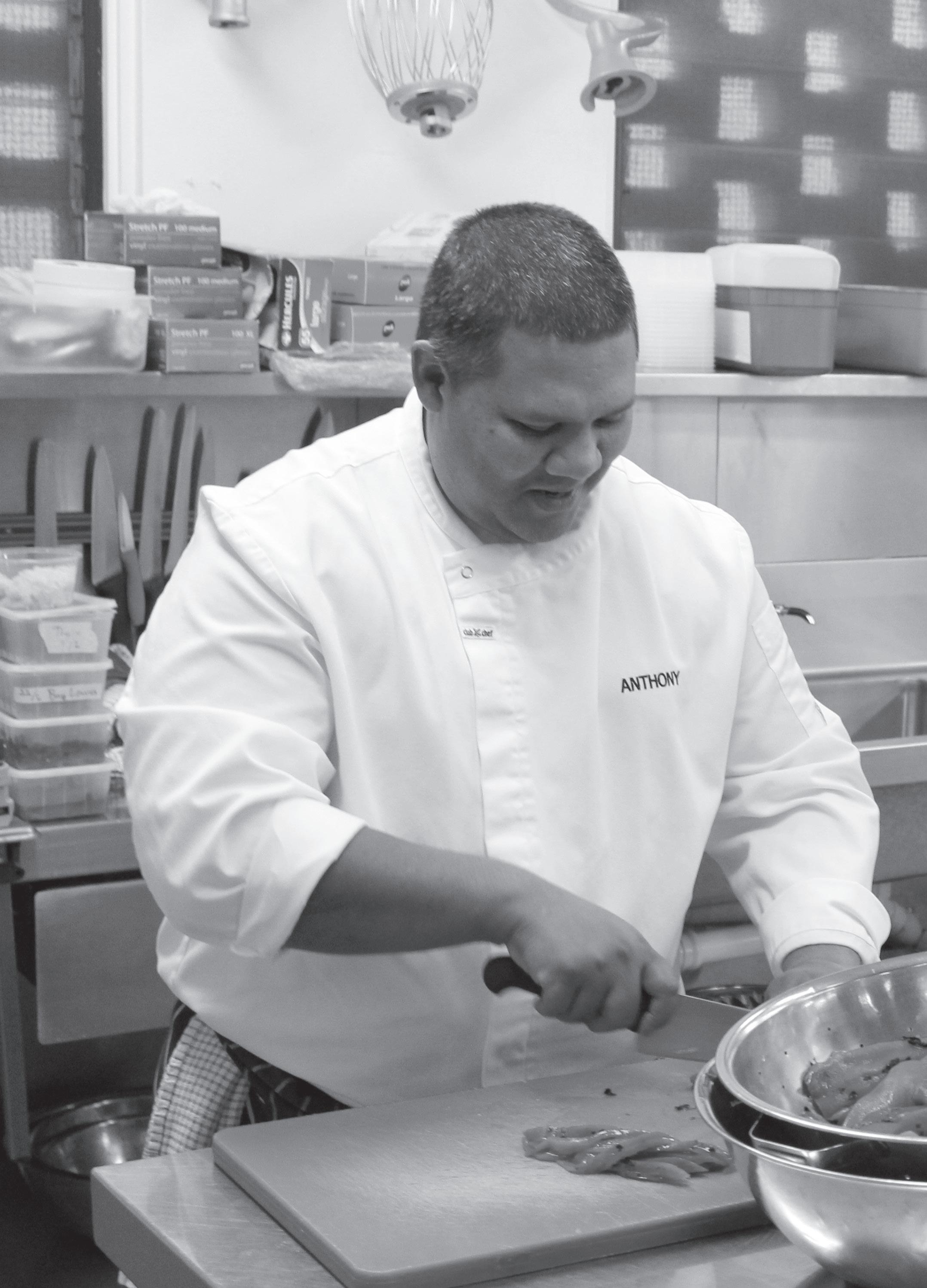
 Looking back at the clubhouse from 18 East green. Image by Gary Lisbon.
Looking back at the clubhouse from 18 East green. Image by Gary Lisbon.
the excitement of working at the racecourse. The head chef, Odi, remembered me from my first days back at the MCG, and he took me under his wing. The kitchen was huge, and we were doing substantial upmarket events for the racing. While I was at Caulfield, Spotless Catering got the contract for the Formula One at Albert Park, and we split the catering between the two venues. When Formula One was on for the week, we would have to cater the food, and it would all be delivered to the site. I stayed here for a year, and then Spotlight transferred me to do my third and final year of the apprenticeship at Leonda by the Yarra, an upmarket function venue specializing in weddings. After a while, I wasn’t sure if catering for functions is what I wanted to do. Airing my growing frustration to my friend, Chef Louis he asked,” what are you doing? This is a function room, you are so talented, and you need to go out into the world and experience different food from different cultures.” I asked him, “how do I do this? “He goes, “you should go into a big hotel chain, because that way, you can travel around a lot and network.”
After I finished my third year, I resigned and took a position at the Carlton Crest Hotel in Albert Park.
GK: Tell us about your time there.
Oh, dear, it was terrible. The Chef was this crazy Austrian guy named Alex. He put me through the mill, I couldn’t do anything right. The German sous chef, Dirk, was more friendly. I told him, “I can’t take this type of treatment, I want to quit.” Dirk said he was leaving soon and going back to work in Germany, he asked me if I wanted to come and work with him. So, three months later, I was on my way to Germany to work in a 900-year-old castle for Chef Alex, who had earned himself two Michelin stars. Everything was in German, but lucky for me most German people learn English at school and could understand me. On my first day, they put me in the Larder section, and I remember I was making a salad, and I had one hand on the bench, and I was making the salad with the other. Alex came over screaming at me, “Why are you using one hand! You have two hands, use them!” To this day, I tell my staff that they are given two hands for a reason.
I learned a lot from Chef Alex, different techniques, how to cook game such as venison and wild boar, goose, and seasonal cooking. He changed the menu daily, and everything had to be perfect. I did two seasons there, and I loved it. I had met my girlfriend (and later wife) Silke in Germany, and we decided to move to London for work. I knew a lot of colleagues and friends from Melbourne who worked there, and my first position was at the Washington Hotel in Mayfair. The Chef Russell was incredible and had worked at many Michelin starred establishments. The hotel had been purchased by an affluent Indian gentleman who wanted to make a lot of changes. I stayed there for almost two years and then moved to the Rydges Hotel, which was near Kensington Palace. My friend Chris was the Executive Chef,, and he asked me if I wanted to help him with the opening of the hotel. I stayed a year and then went to the Mayfair InterContinental This was a challenging position, I was working under Chef Michael,
who had trained under Paul Bocuse. I started off as a Chef de Partie and was later promoted to Sous Chef. The year after, the hotel was purchased by the Radisson Group, and they began to downsize. I took the opportunity to move on to my first Head Chef position at the Novotel at Tower Bridge, part of the InterContinental group. I also got married while I was there, and it was at this time that my wife and I decided it was time to settle down, and we made plans to move to Australia.
GK: Did you have a position in advance?
No, my wife had been working at Gordon Ramsay’s at Claridge’s, and she was tired of the long hours. We both needed a break and decided to take some much-needed time off in
The Royal Melbourne Golf Club 91
“
Food was a big part of my life due to my family’s multiple cultures, and it was always exciting at the family dinner table.”
Australia. She fell in love with the country, my parents, and my family and was happy to move here permanently with me.
My first position after my return to Melbourne was at the Como Hotel in South Yarra. I had to take a step down a level, but then I met Chef Marcus from Crown Casino, and he offered me a position at Number 8 Restaurant and Wine Bar in Southbank, which is now the Fat Duck by Heston Blumenthal. I stayed there for two years. During the last few months, Marcus came to me and said: “there is a gentleman that would like to talk to you.” He was older and quite underdressed (not really adhering to the restaurant’s dress code). I asked him, “Is everything ok with
the food?” and he answered, “I love coming here, I love what you are doing here. Would you like to come and work for me?” He told me that he was opening several restaurants under the brand Blue Fire Group and needed several Executive Chefs. I took the position and found myself jumping from restaurant to restaurant, helping with openings. This turned out rather stressful, long hours, and still not what I wanted, I longed to settle down and have more job security.
GK: When did you transition to the Golf

Golf Kitchen Magazine 92
“I want the members and guests to be relaxed, the Golf is stressful enough out there, so if they come in, with a bad mood and I can make them happy with a nice meal, whether it’s a sandwich or a fivecourse meal, I can leave at the end of the day feeling satisfied.”

The Royal Melbourne Golf Club 93

back
18
Looking
over
West. Image by Gary Lisbon.
I left Blue Fire when I was offered a position at the Yarra Yarra Golf Club in Bentleigh, East Victoria. They had just renovated the clubhouse and wanted to change the culinary landscape. They wanted to move away from traditional food to more modern fare, plus a lot of functions and weddings, this is the direction they wanted to go. I don’t think I was ready for Golf at that time and after a short period at the club, I went back to the Blue Fire Group. They were opening 17 more restaurants and sent me to Brisbane to move dining/entertainment cruise boats there. I was not happy this time, and when I had a disagreement with the owner, I walked away.
I planned to take six months off to be with my family – we were now proud parents of twins!
But one day out of the blue, a well-known Chef called me, and said, “I am opening Eureka Towers, and I am looking for a Chef, would you be interested?” I agreed, and it was a fantastic experience being on the 89th floor! The hours, however, were very long, and it was taking a toll on my family, I knew had to change my way of life.
I took a job at the Royal Yacht Club of Victoria in Williamstown, and they were doing a significant renovation of the clubhouse. I wasn’t happy there either as I had to work two jobs to support my family. My second job was at Fenix for Gary Mehagan and his Chef Dan, whom I had worked with in Europe. He told me that The Royal Melbourne Golf Club was looking for a new Executive Chef.
GK: What year was that?
It was 2011. I went home to tell my wife about the position. She reminded me that I was getting older and needed to find a secure job and settle down. So, I sent in my resume and didn’t hear back for quite a few weeks. Then, Andrea Watson, the Assistant General Manager called: would I like to come in for an interview? After the meeting, I was sent to CEO Paul Rak’s office. Looking at him, I said,” I have seen you somewhere before, I just can’t think of where?” He immediately responded, “you are Charles’ nephew.” I was astonished! When I was 12 years old, my Uncle Charles used to be a cleaner at Royal Melbourne, and I would sometimes come to help him out and earn some extra cash. Mr. Rak remembered me from when I was cleaning
the locker rooms: it was quite an emotional experience.
After the interview, Andrea said it will take a few weeks before she’ll get back to me. I thought ok, and I got into my car to drive home. Not even five minutes later, she calls me back and says, “do you want the job?” I said, “Yes!” That was late 2011, and I have been here ever since.
GK: Tell us about your team.
It’s a fantastic place to work, I have a great team, and a lot of support from the management and I finally found my grounding. I am working for a professional organization with all the help I could wish for, and I feel like I have a second home. I do spend a lot of time here, but I really enjoy every day.
How did you find the transition initially?
Coming from a restaurant background where it is very hectic and last minute, I found that I am more organized and calmer: there is no more screaming and shouting. People are not in a rush here, and they prefer things done correctly. I can access great produce that I usually couldn’t obtain elsewhere. I get to cook what I enjoy and try new creations for our members. I like a lot of comfort food but healthy and fresh. I want the members and guests to be relaxed, the Golf is stressful enough out there, so if they come in, with a bad mood and I can make them happy with a nice meal, whether it’s a sandwich or a five-course meal, I can leave at the end of the day feeling satisfied.
GK: When you started here, did you bring your own team?
The Head Chef had left, and the Women’s Australian Open had just finished. It was late October and the busiest time of the year with major events coming up. A week later, the sous chef left also, but luckily, I had quite a lot of connections, and I started to build my team.
GK: Tell us about your food style at Royal Melbourne
I am classically French-trained, and I have a strong Asian influence as well. I keep things simple but with a twist. I enjoy taking old favorites and changing them around a bit.
The Royal Melbourne Golf Club 95
GK: Do the members have an influence on the menu?
They do, and when I’m out in the clubhouse, they always let me know what they like. We have a lot of events here, which is good. I try a lot of things out, and the menu changes often. I enjoy coming up with new ideas, and so does my team. I love it when the members give their input, and I get to know what their palate is like. At Royal Melbourne, guests like to have lighter and healthier options.
GK: How has the menu changed from 2011 to now?
When I first started, there was a lot of deep-fried food, dense food, now it is much lighter and healthier, we have more salads and steamed items. We have a lot of older members, and they like smaller portion sizes, which is good for us. With smaller portions, we can have higher quality ingredients and be more creative.
GK: Tell us about the Presidents Cup?
We started to prepare for the Presidents Cup in 2017!
We want to highlight Australian and especially Victorian fare. I want the guests to experience what the members experience, and we have developed menus to showcase the flavors of the Australian Summer.
There will be two sections in the clubhouse, downstairs for the Members and their guests’ and upstairs for Presidents Cup Commissionaires Hospitality guests. We have been running the Sandringham Golf Course across the road and will be utilizing that area for parking. Eventually, that will become the home of Golf Australia and Golf Victoria and the home of Junior Golf Australia. Everyone at Royal Melbourne is excited to be a part of this incredible event.
GK: Tell us about your relationship with Mr. Rak? I know it was a challenging time for Royal Melbourne and Golf globally when he passed. How did he influence your time at Royal Melbourne?
He was a straightforward guy and very kind. He knew everyone at Royal Melbourne by name
knew everyone at Royal Melbourne by name right down to the dishwasher. He knew my kids’ names and kept up with what they were doing with their schooling and free time. He always found the time to get to know the staff and genuinely wanted to know about their lives and dreams. He was always the first person here, even when I thought I was here first, he was still here before me. One time I got in before five am. and he was already here, I asked, “what are you doing here so early?” He answered, “waiting for you.” Then he made us both a coffee, and he sat in the kitchen to hear about my days’ plans. It didn’t matter how bad my day was as he always supported me, and that made me feel confident.
GK: What was his influence over the menu?
He allowed me to create the menu’s, but he did not like mushrooms at all. He would have lunch with the staff every day and enjoyed the family and club atmosphere. He could eat at any restaurant in the world, but Royal Melbourne was home to him, and we were all his family. He is sorely missed.
GK: Anything else you care to share with us?
I am at the club for many hours, and without the love and encouragement of my wife, Silka and my children, and the support of my parents, sister and extended family, it would not be possible.
I would also like to acknowledge and thank all the team at The Royal Melbourne Golf Club, friends and chefs who have worked with me through the years. It’s been an incredible journey so far, and I look forward to more culinary adventures to come.
Thank you.
Golf Kitchen Magazine 96

The Royal Melbourne Golf Club 97
Clubhouse Foyer and guest book. Image by Gary Lisbon.
WESTERN AUSTRALIAN SCAMPI AND KING TIGER PRAWNS with Salad of Citrus, Wild Leaves, and Pomegranate Dressing
Yields 4
Ingredients
Shrimp and Scampi
• 12 Western Australia Scampi Tails
• 12 Tiger Prawn Cutlets
• Olive Oil
• 1 knob of Butter
• Salt and Pepper (to taste)
Wild Leaves
• 20 Watercress
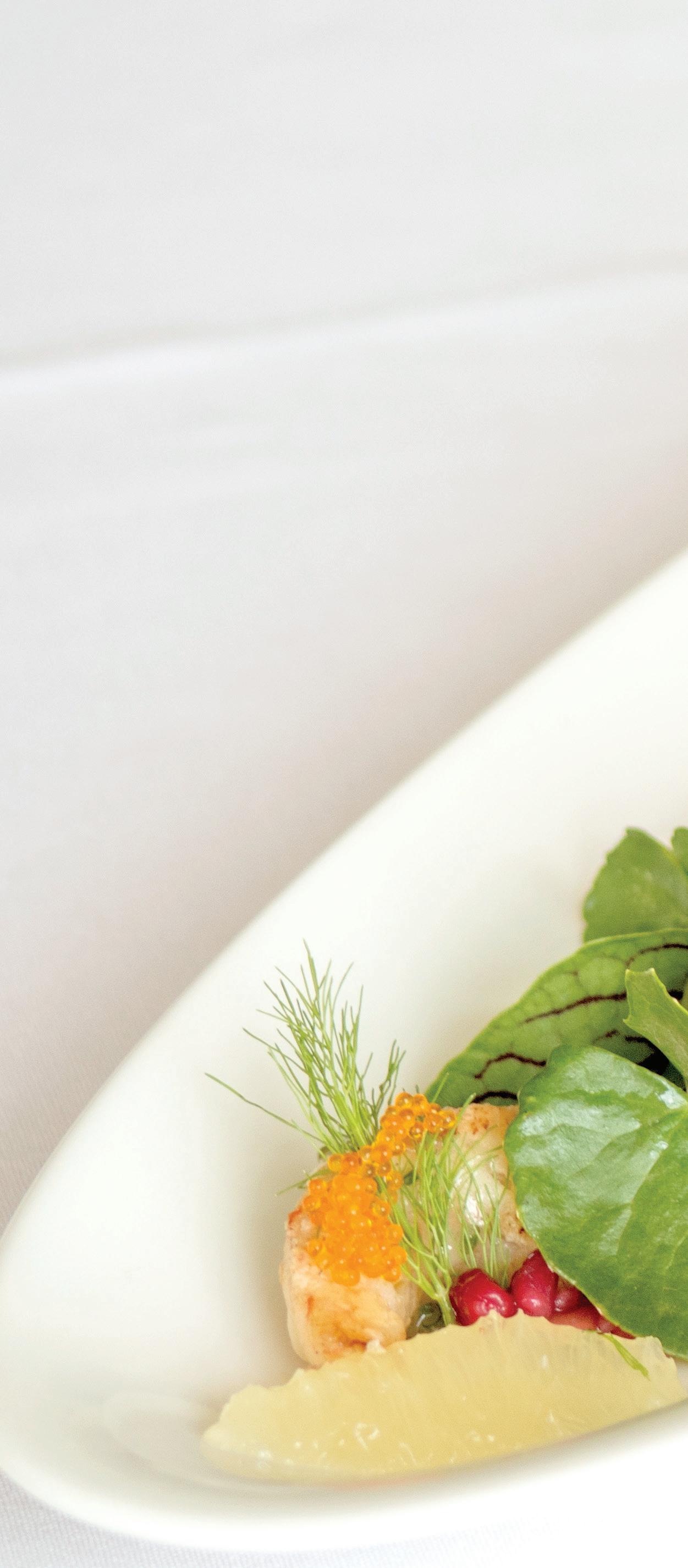
• 20 Rocket Leaves
• 20 Sorrel Leaves
• Olive Oil
• Salt
Citrus
• 1 Grapefruit (slice into segments)
• 1 Red Grapefruit (slice into segments)
• 1 Lime (slice into segments)
• 1 Orange (slice into segments)
• 1 Lemons (slice into segments)
• 1/2 teaspoon Dill (finely chopped)
• Olive Oil
RECIPE
Golf Kitchen Magazine 98
BY ANTHONY DOLE

The Royal Melbourne Golf Club 9999

Golf Kitchen Magazine 100
Pomegranate Dressing
• 6 Tablespoons Olive Oil

• 2 Tablespoons White Wine Vinegar
• 2 Tablespoons Pomegranate Seeds
• 1 Tablespoon Lemon Juice (freshly squeezed)
• 1 teaspoon Tobiko Caviar
• 1 teaspoon Chives (finely chopped)
Preparation
Shrimp and Scampi
In a hot frying pan, sauté the scampi and prawns with olive oil caramelizing them well on all sides, add a knob of butter and baste the seafood well. Season to taste.
Wild Leaves
In a large salad bowl, dress the wild leaves with olive oil and salt then set aside.
Citrus
In a sauté pan add all of the citrus fruit then add the olive oil and chopped dill. Warm over low heat. Set aside.
Pomegranate Dressing
In a small mixing bowl combine the olive oil, vinegar, and lemon into an emulsion set aside. Add the caviar, pomegranate, and chives just before serving.
Assembly
Arrange the shrimp and scampi and citrus segments on the plate, as shown in the image. Spoon the citrus on the flesh of the shrimp and scampi.
Arrange the wild salad leaves and drizzle the pomegranate dressing.
Garnish the scampi with a half a teaspoon of Tobiko caviar.
Serve immediatly.
Wine Match
Oakridge Pinot Grigio, Yarra Valley VICTORIA.
The Royal Melbourne Golf Club 101
Captains of the Club Honor Board.
Image by Gary Lisbon.
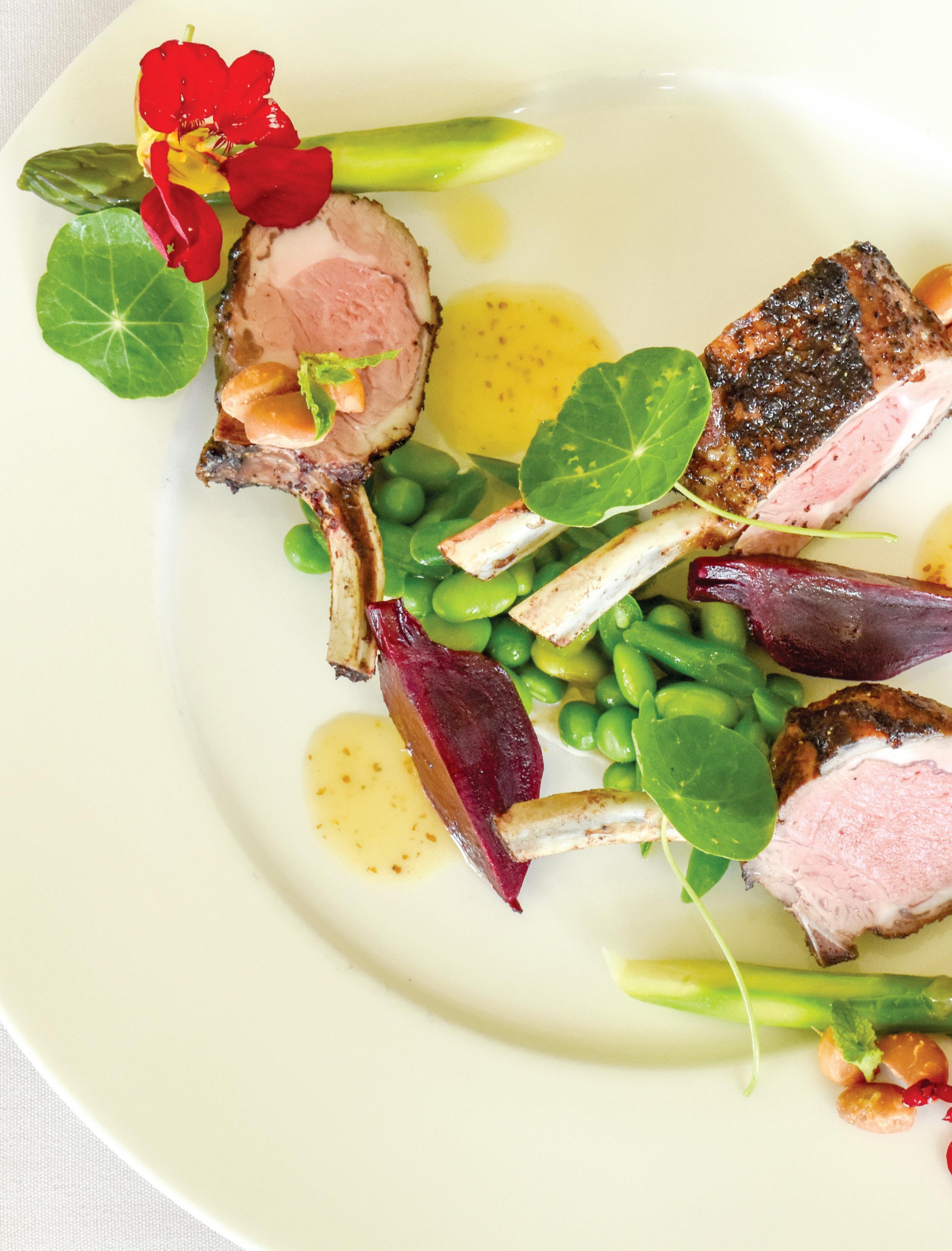
RECIPE BY ANTHONY DOLE
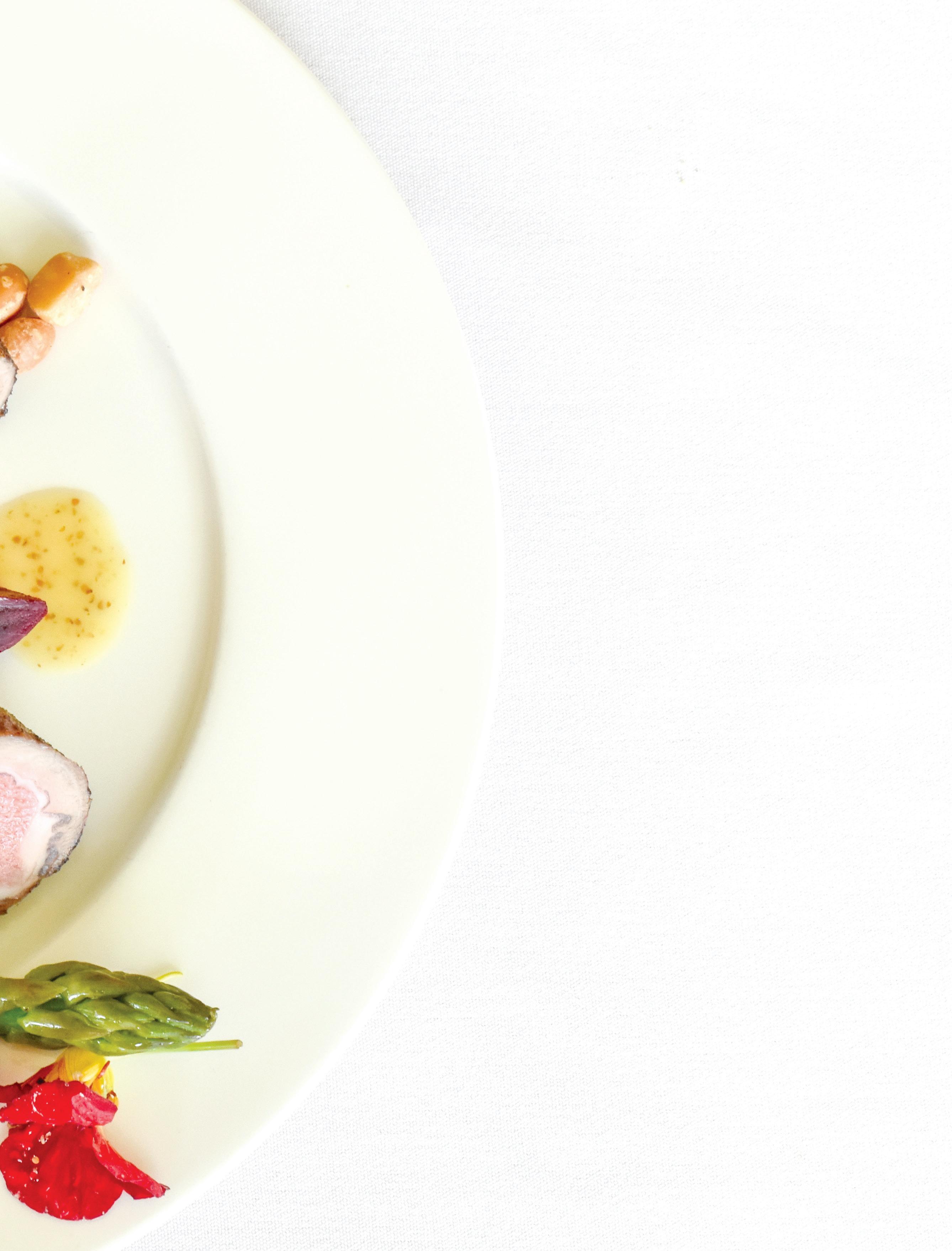
SUMAC SPICED
Mt. LEURA LAMB with Three Bean Salsa, Baby Beets, and Manuka Honey Mustard Dressing
Yields 4
Ingredients
Sumac Spiced Mt Leura Lamb Racks
• 4 four point Lamb Racks
• 40 grams Sumac Spice
• 100 grams Three Bean Salsa
• 4 - 8 Baby Tomatoes
• 80 milliliters Manuka Honey Mustard Dressing
Bean Salsa
• 50 grams Broad Beans
• 50 grams Peas (podded)
• 50 grams Green Beans
• 8 Spears Asparagus
• Chopped Parsley
Manuka Honey Mustard Dressing
• 2 Tablespoons White Wine Vinegar
• 1 Tablespoon Lemon Juice (freshly squeezed)
• 1 Tablespoon Seeded Mustard
• 2 Tablespoons Manuka Honey
• 1/2 teaspoon Sea Salt
Roasted Baby Beetroot
• 8 -12 Baby Beets
Garnish Micro Herbs and Flowers
The Royal Melbourne Golf Club 103
Preparation
Sumac Spiced Mt Leura Lamb Racks
Season the lamb racks well with sumac and seal in a frying pan on all side until caramelized.
Place in the oven for 7-9 min at 180 °C, remove from oven and rest for 6 mins.
Bean Salsa
Mix all of the ingredients in a mixing bowl, set aside.
Manuka Honey Mustard Dressing
Combine the vinegar, lemon juice, mustard, salt, and honey in a small ceramic bowl. Whisk until well combined.
Add the olive oil to the vinegar mixture in a slow, steady stream, constantly whisking until dressing thickens slightly.
Add the chopped macadamia nuts just before service.
Roasted Baby Beetroot
Place beetroots on a rock salt cooking block and bake in the oven at 180 °C until cooked.
Assembly
Place the bean salsa on a serving plate and portion lamb rack into cutlets and place around the plate (see image) Arrange the beets and tomatoes around the plate. Drizzle over with the mustard dressing and garnish with the micro-herbs and flowers.
Wine Match
Josef Chromy Pinot Noir, Launceston Tasmania.

Golf Kitchen Magazine 104
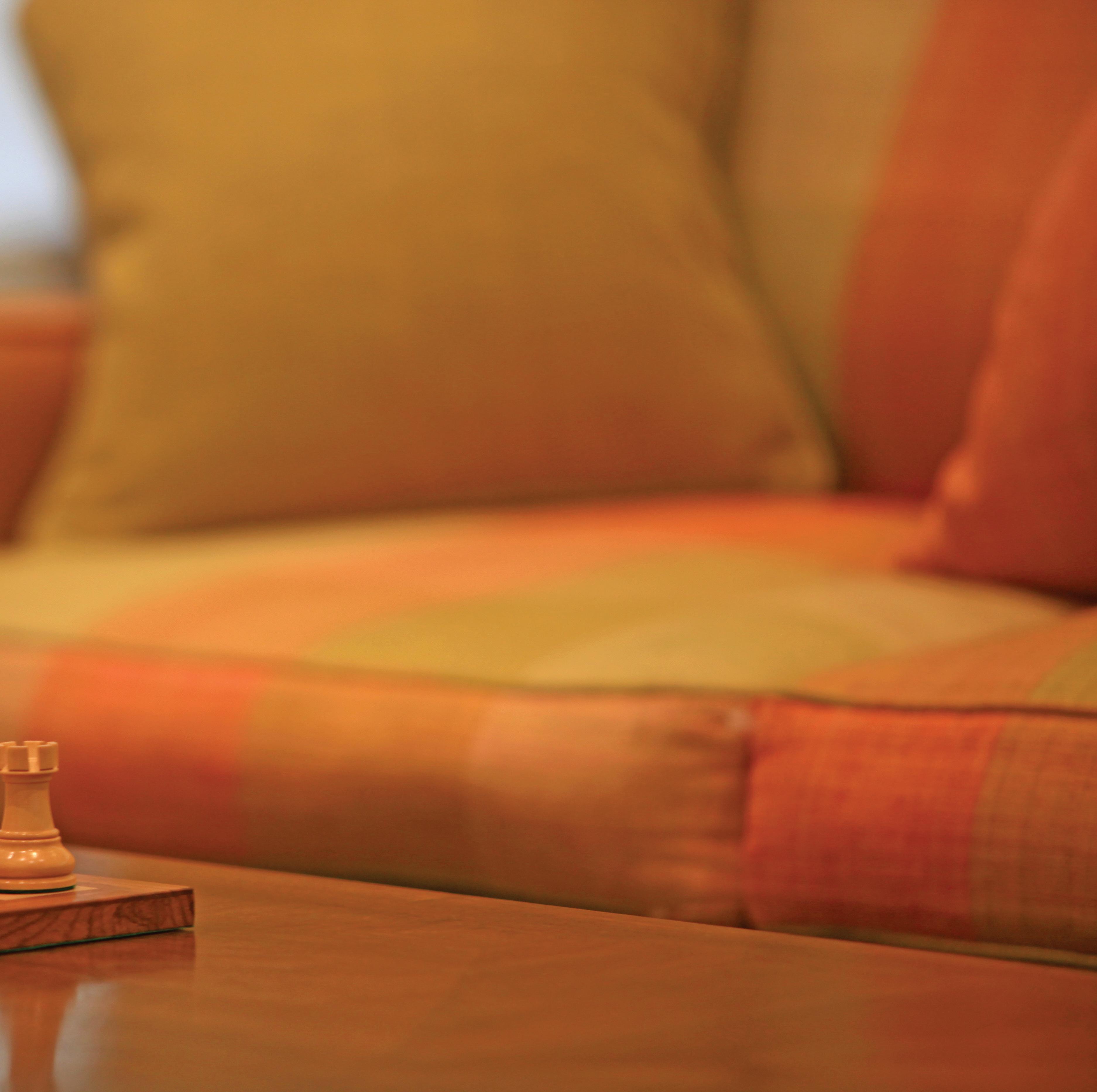
The Royal Melbourne Golf Club 105
MacKenzie Room chess board. Image by Gary Lisbon.
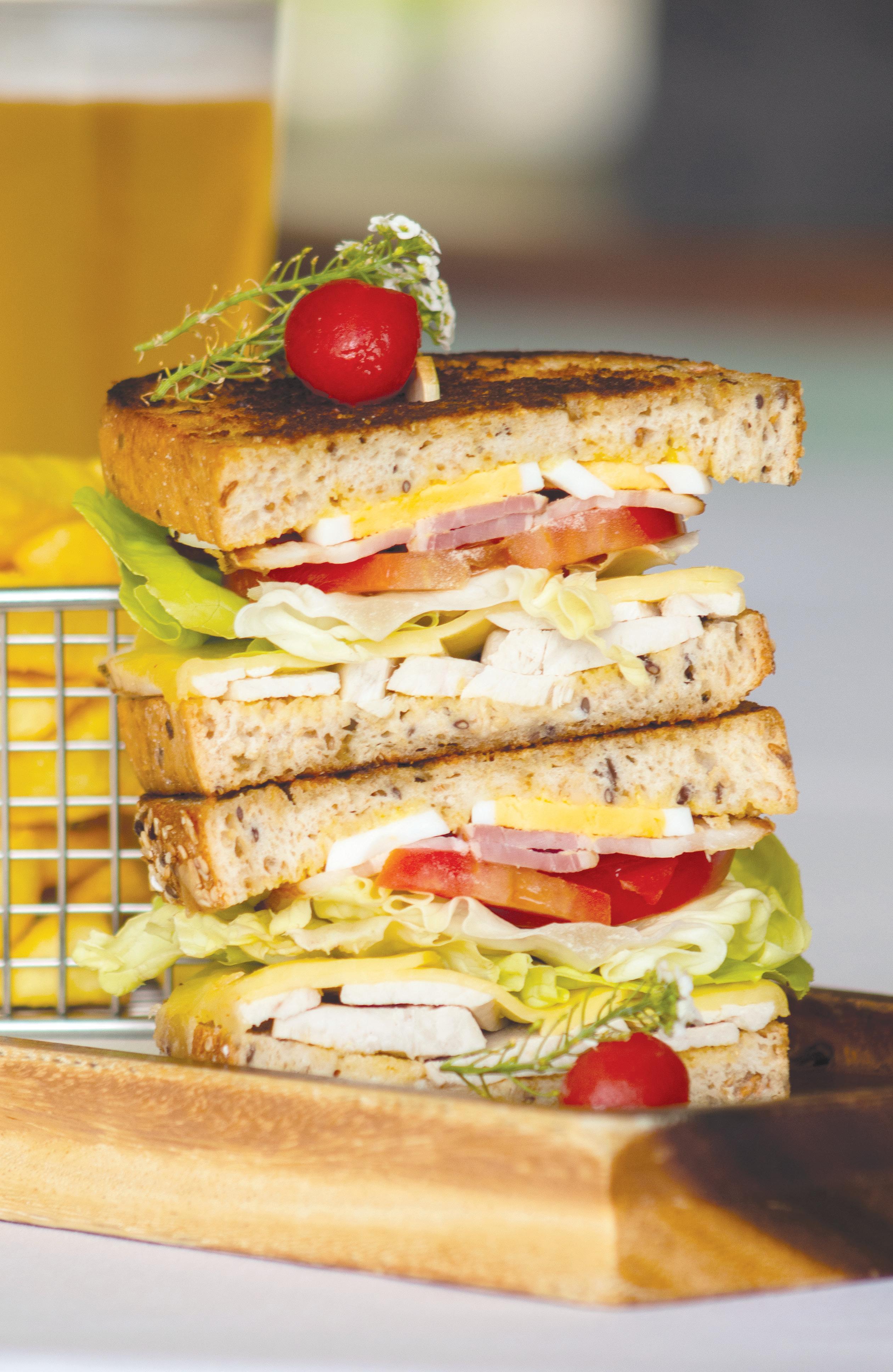 RECIPE BY ANTHONY DOLE
RECIPE BY ANTHONY DOLE
ROYAL MELBOURNE CLUB SANDWICH
Yields 4
Ingredients
• 8 slices Cereal Grain Bread
• 16 rashers Streaky Bacon (cooked)
• 200 grams Chicken (steamed or poached)
• 4 Eggs (soft boiled – sliced)
• 8 slices Tasty Cheddar Cheese
• 120 millilitres Mayonnaise
• 16 slices Tomato
• 80 grams Mixed Salad Leaves
• 600 grams hand cut chips
• Tomato sauce
• Mayonnaise
Preparation
Toast the bread and grill the bacon Place bread on chopping board. Add the mayonnaise, lettuce, egg, tomato, chicken and cheese on top of each other in a layered formation. Place the other piece of toast on top, cut in half.
Assembly
Place one half of the sandwich on top of each other & hold together with a skewer
Serve with homemade chips and tomato sauce.
Wine Match
Royal Melbourne Chardonnay, Regional Victoria or Peroni Draught Beer.
The Royal Melbourne Golf Club 107

 An aerial view of 2 East. Image by Gary Lisbon.
An aerial view of 2 East. Image by Gary Lisbon.
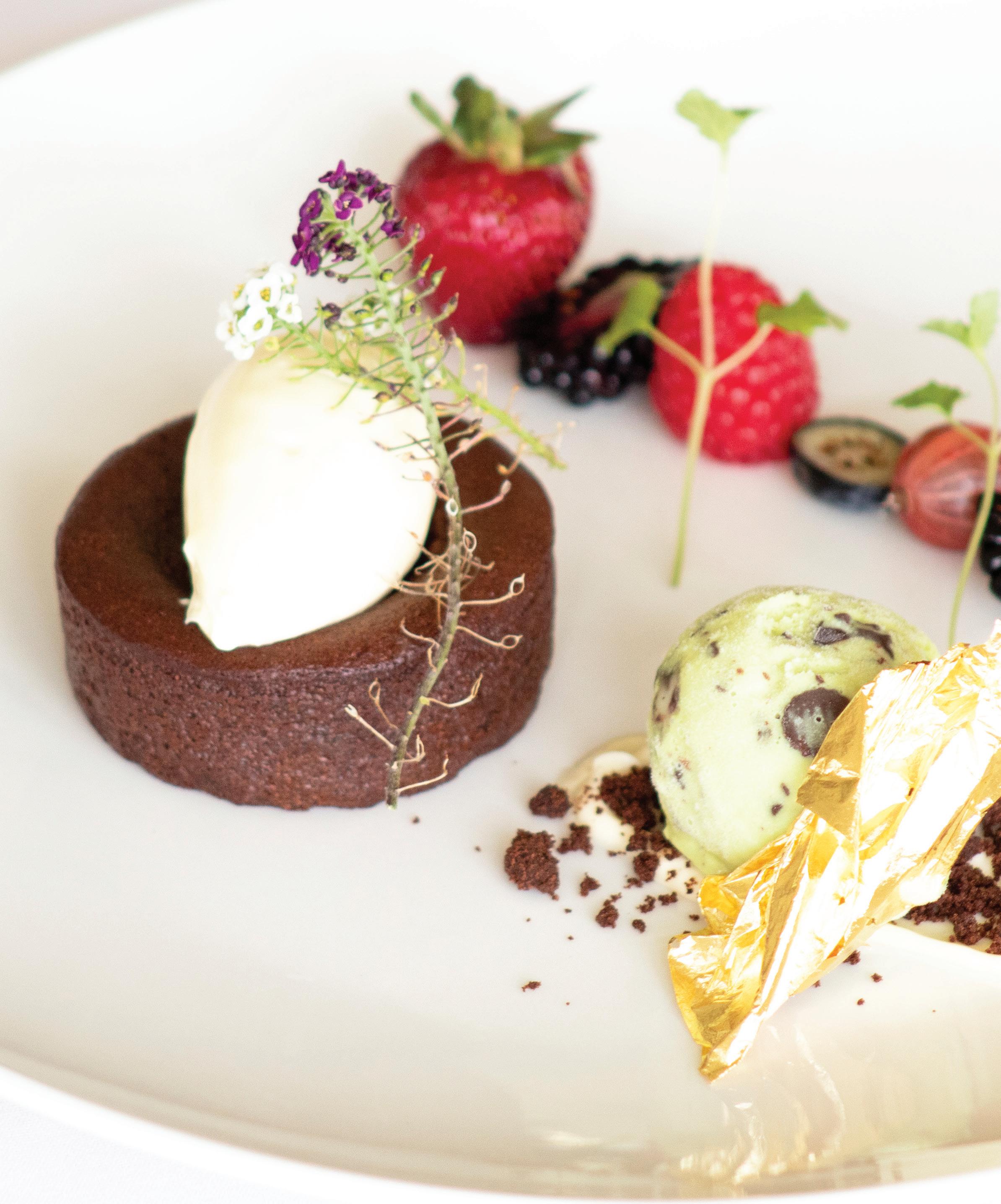
Golf Kitchen Magazine 110
RECIPE BY ANTHONY DOLE
SOFT CENTERED VALRHONA DARK CHOCOLATE PUDDING with Crème Fraiche and, Seasonal Summer Fruits

Serves 4
Ingredients
Chocolate Pudding
• 250 grams Butter
• 250 grams Valrhona Dark Chocolate
• 5 Whole Eggs
• 5 Egg yolks
• 125 grams Sugar
• 75 grams Flour
• Silicon Paper
Garnish
• 4 scoops Pistachio Nut Ice Cream
• 200 grams Cream Fraiche
• Icing Sugar
• Seasonal Summer Fruits and Berries
• Micro Herbs and Flowers
• Edible Golf Leaf Sheet
Preparation
In a saucepan over medium heat, melt the butter with the chocolate. In a mixing bowl, combine the whole eggs, yolks, and sugar to form a sabayon and add the flour and mix well.
In the mixing bowl combine both mixtures and reserve in the fridge for 20 minutes.
When ready, fold a mold with silicon paper and fill it with the chocolate mix. Place the chocolate pudding in the oven for 9 minutes at 180º.
The Royal Melbourne Golf Club 111
Assembly
Place the chocolate puddinlyg onto a serving plate a gently take off the silicon paper.
Finish with the pistachio nut ice cream and cream Fraiche. Garnish with the seasonal summer fruits and berries, then sprinkle with icing sugar.
Wine Match
La Gioiosa Prosecco, Treviso Italy.

Golf Kitchen Magazine 112

Club 113
Bunkering on 18 East. Image by Gary Lisbon. The
Royal Melbourne Golf
WHAT’S COOKING AT THE ANN LIGUORI FOUNDATION CHARITY GOLF CLASSIC?
Chocolate Tart with Raspberry Caramel, Dark Chocolate Ganache, Anise Hyssop Cream.
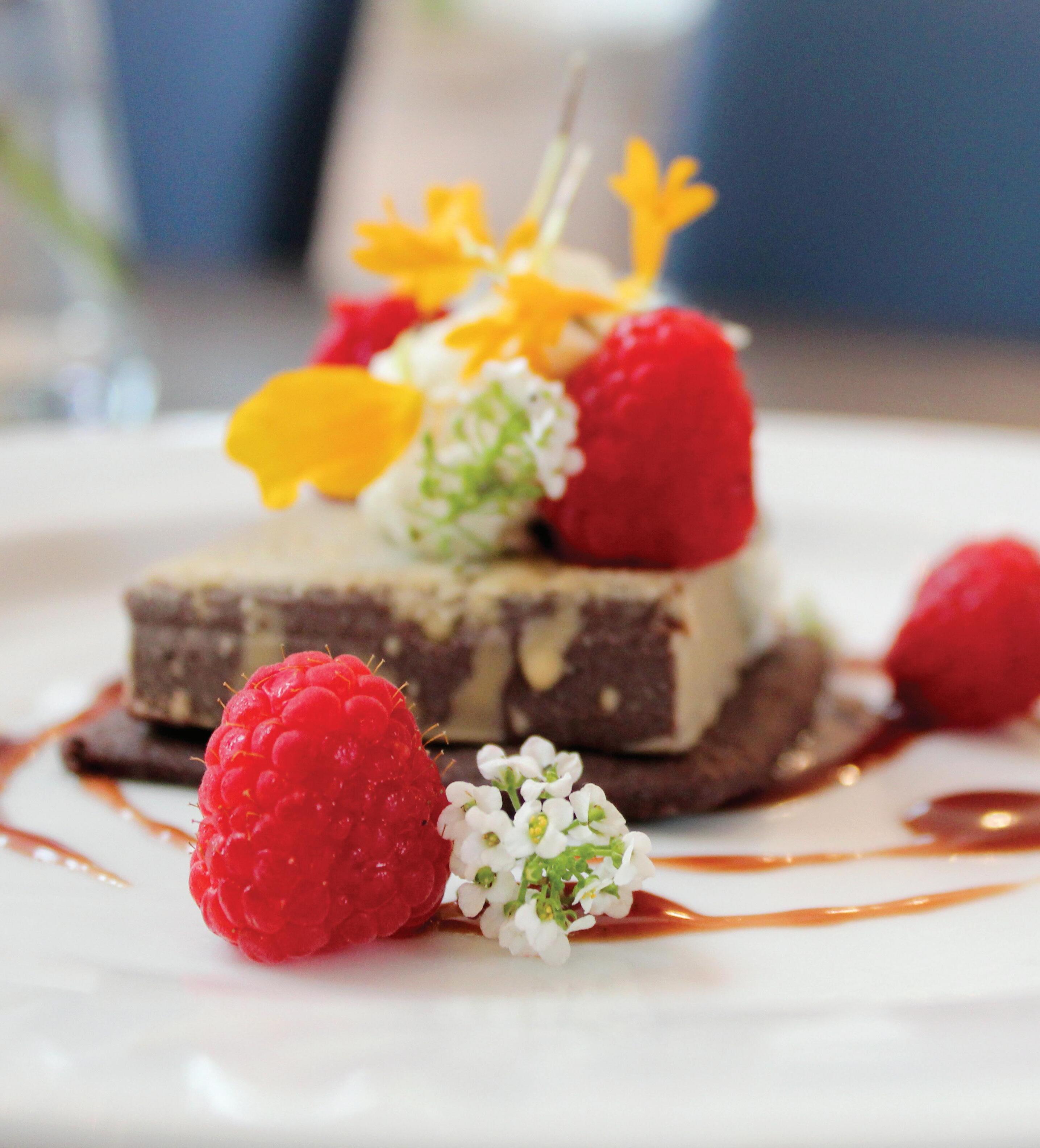
Golf Kitchen Magazine
114
The Ann Liguori Charity Foundation Golf Classic took place on June 19th and 20th in Westhampton Beach, New York. I was attending the 21-year-old charity event for the first time and I was pleasantly surprised that the dynamic sportscaster had included a strong culinary component.
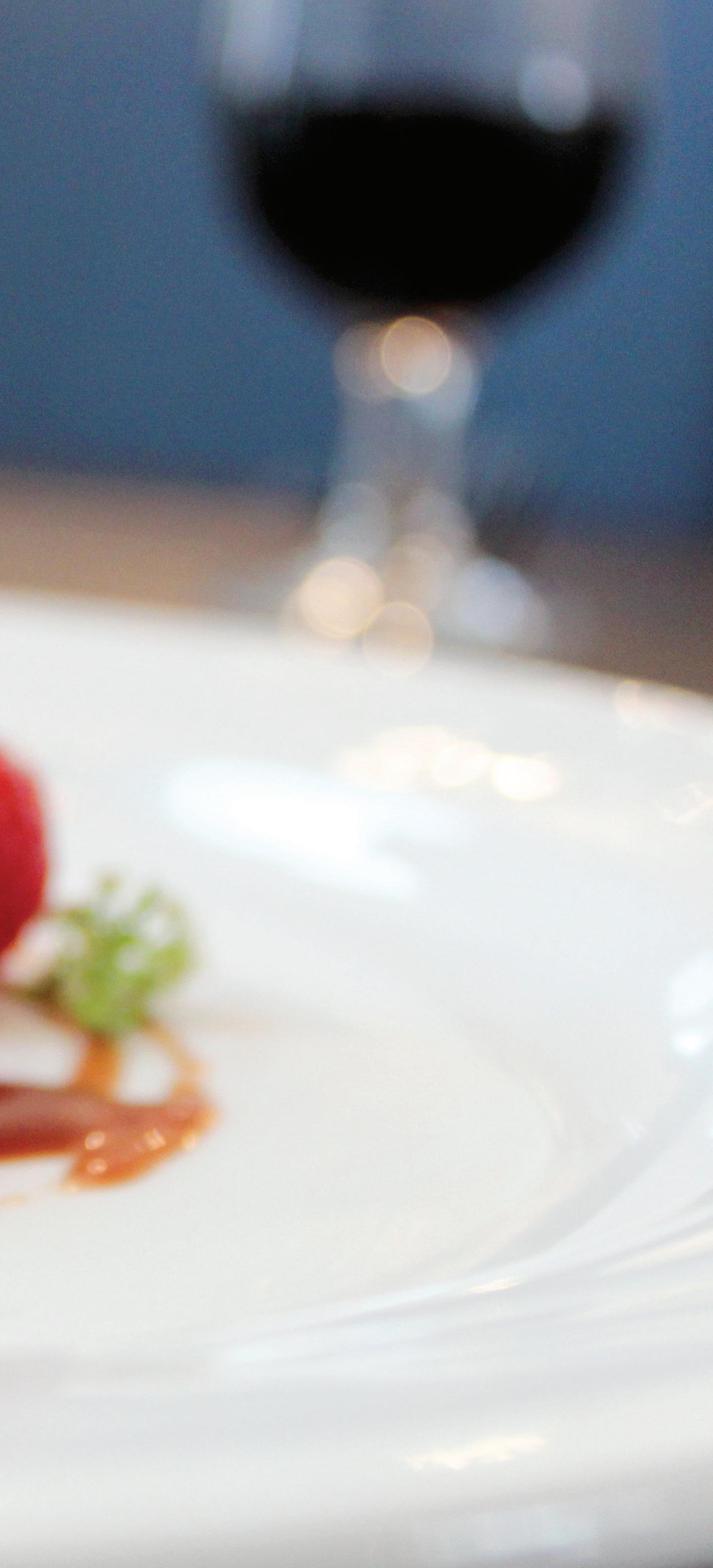
On the eve of the tournament, a private dinner event took place at the home of Tom and Colleen Corcoran Matthew Wiseman of Motor City Seafood Company in Michigan and, Executive Chef Joe VanWagner of Detroit put together a delightful summer menu for the guests that had traveled from as far as Mississippi. Menu: Long Island Creek Bin 34 Oysters; Seabream Tartare with Ruhkig Farms and Garden Elderflower Compressed Cucumber, Annie Hakim’s Featherston Garden Shiso Mousse; Crab Cakes with first of the season Michigan Corn, Featherston Garden Micro Flowers; Surf and Turf with Grand Rapids Prime Beef Tenderloin Filet, Barbeque
Shrimp, Handmade Lobster Ravioli, Braised Greens, Shrimp Bouillion and Chocolate Tart with Raspberry Caramel, Dark Chocolate Ganache, Anise Hyssop Cream. Jim Halpin supplied the wines.
“It’s my second year creating the menu for Ann’s event. It’s always exciting as I am used to cooking in a smaller space and it’s nice to work from this incredible home for a good cause and some great people.” said VanWagner.”
 Volunteer, Ron Goerke
Volunteer, Ron Goerke
Musician Daniel Liguori entertained guests by the fireplace with his guitar and vocals. The evening ended with speeches and gift presentations to the generous sponsors.
On June 20th, the Ann Liguori Foundation Charity Golf Classic took place at the exclusive Westhampton Country Club in Westhampton Beach. The day began with a 10 am registration, brunch, and a 12.30 pm shotgun start. The weather was dodgy, and thick fog made play challenging, but the rain stayed away for the majority of the afternoon.
The winners were Low Gross, Kenneth Whitney, John Eager, Mark Kenyon, Anthony Casalino and LowNet winners Walt Wasnieski, Shawn Lynch, Russ Marnell and Joe Ventimiglia.
A cocktail party and a three-course awards dinner followed with a menu created by Tim Trill, the Executive Chef at Westhampton Country Club. East Long Island Salmon, with Beets and Walnuts, followed by a Beef Filet and Roasted Swordfish with a Basil Crust. Dessert was a selection of Mini Pastries and Eclairs.

Dinner was followed by a signature live and silent auction presented by Grandstand Sports and raised a whopping $70 000 for the worthy cause.
Awards were presented to: Sports Legend Honoree Lesley Visser, the Pro Football Hall of Fame and the first woman assigned to a Super Bowl Sideline, the only sportscaster, male or female to have worked on the Network broadcast of The Final Four, The Super Bowl, The World Series, The NBA finals, The Triple Crown, The Olympics, The USA Open and the World Figure Skating Championship.
Business Honoree Robert Bicocchi, Senior Property Manager with CBRE, providing leadership for a team of Property Management professionals in New York City, which include large admin. Properties, Corporate Headquarters, Data Center, and Trading Floor locations totaling 2.8 million square feet for the Bank of America account.
Music Honoree Steve Azar, hit songwriter with three chart-topping #1 music videos, ‘I Don’t Have to Be Me ‘til Monday,’ one of the top 5 most-played country songs since the year 2000; recording artist, talk show host, music producer, philanthropist and golfer; Music and Culture Ambassador of Mississippi; Host, ‘In a Mississippi Minute with Steve Azar, ‘ latest release: Steve Azar and the Kingsman.
“We did this tournament for ten years, and we are pleased to have it return to Westhampton. We love working with Ann, who points us in the direction of what she wants but then lets us go for it. Tonight I am showcasing the local farms in East Long Island.” stated Trill.
Seabream Tartare with Ruhkig Farms and Garden Elderflower Compressed Cucumber, Annie Hakim’s Featherston Garden Shiso Mousse.


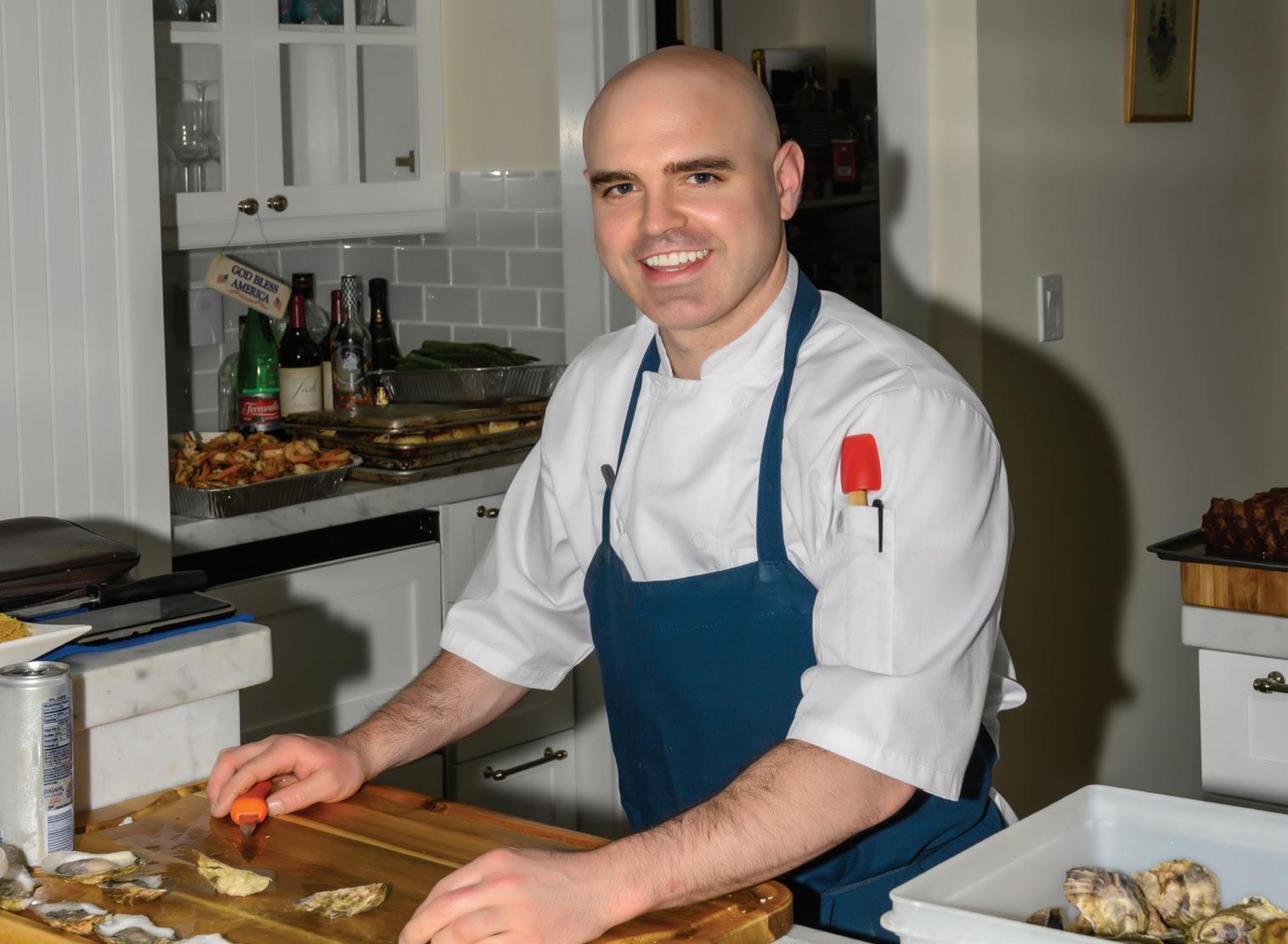
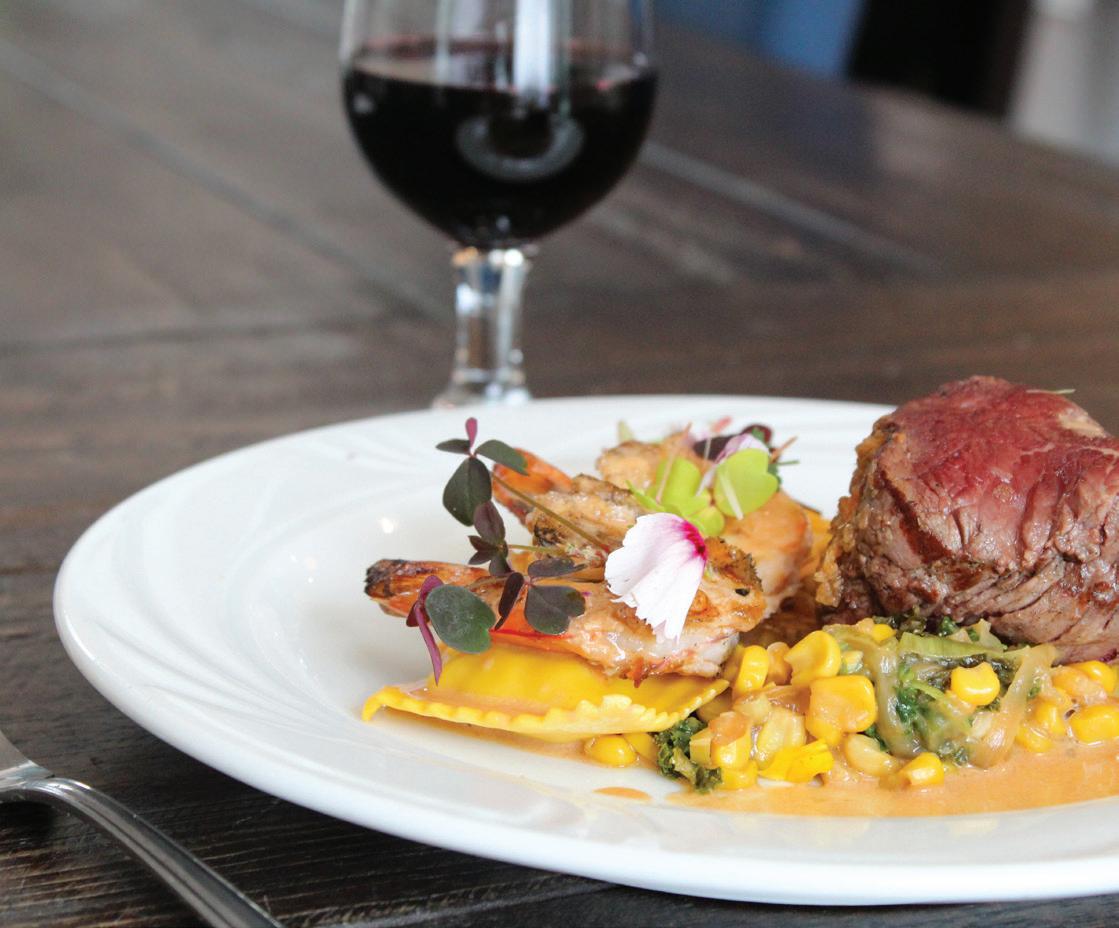
 Crab Cakes with first of the season Michigan Corn, Featherston Garden Micro Flowers.
Chef Joe VanWagner.
Prime Beef Tenderloin Filet, Barbeque Shrimp, Handmade Lobster Ravioli, Braised Greens, Shrimp
(Left to right) Hosts Scott Vallary, Ann Liguori, Coleen and Tom Corcoran.
Host Ann Liguori.
Crab Cakes with first of the season Michigan Corn, Featherston Garden Micro Flowers.
Chef Joe VanWagner.
Prime Beef Tenderloin Filet, Barbeque Shrimp, Handmade Lobster Ravioli, Braised Greens, Shrimp
(Left to right) Hosts Scott Vallary, Ann Liguori, Coleen and Tom Corcoran.
Host Ann Liguori.
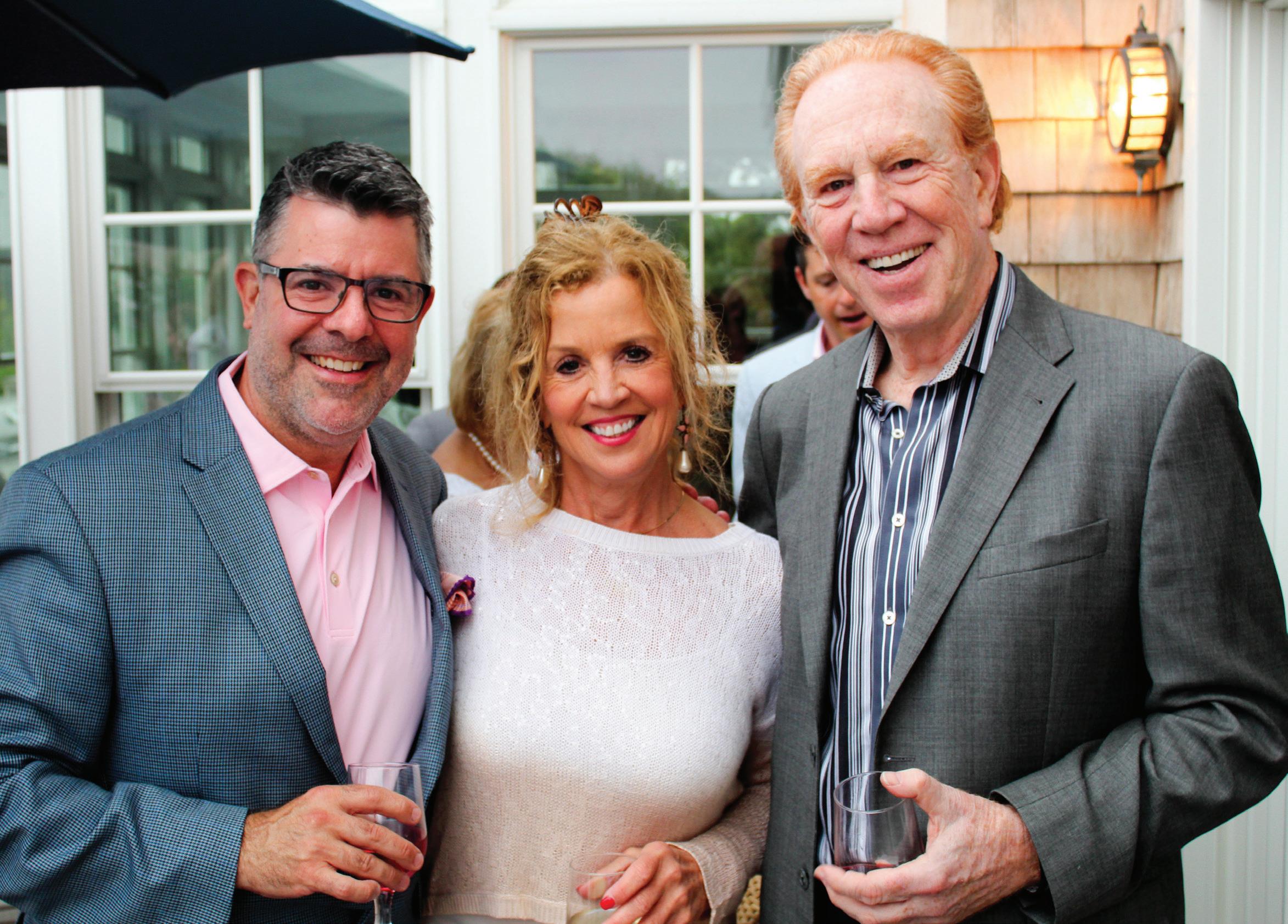
 (Left to right) Steve Skidgel, Jean Skidgel, Host Ann Liguori, Scott Vallary and Dan Liguori.
(Left to right) Michael Fiedler,Jane Hansen and Alan Kalter.
(Left to right) Steve Skidgel, Jean Skidgel, Host Ann Liguori, Scott Vallary and Dan Liguori.
(Left to right) Michael Fiedler,Jane Hansen and Alan Kalter.

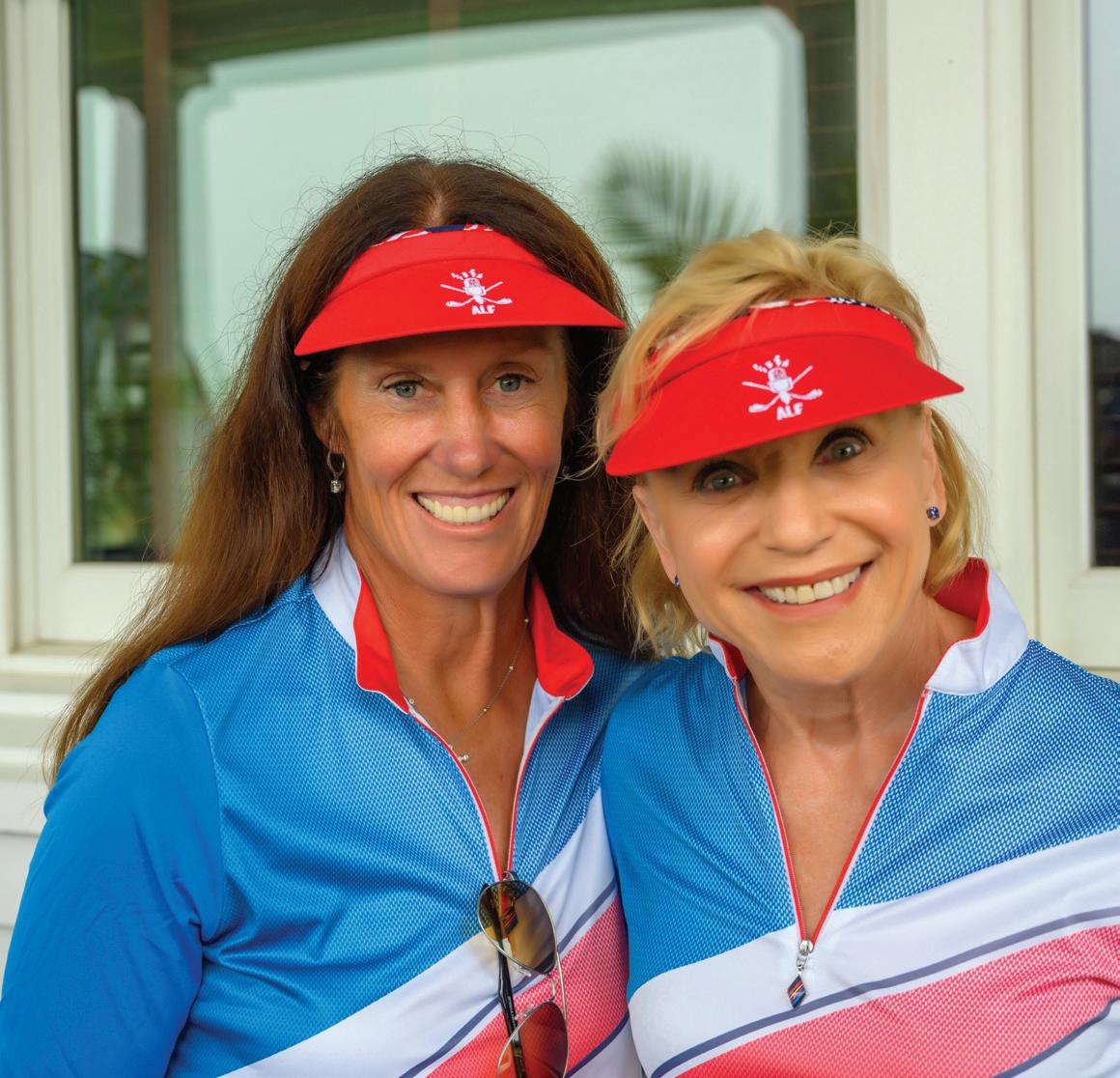



 Gianna Rojas, one-armed golfer.
Volunteers, Coleen Corcoran and Pat Vallary.
Marty Hackel, Mr. Style formerly of Golf Digest.
(Left to right) Jean Skidgel, Tournament Coordinator, Kelly Burke-McMillin, Diane Lenowicz, Diane Schimmer, Coleen Corcoran, Elsie Boskamp, Lexi Plummer, on table - Ann Liguori.
Nicholas Feaser, PeakVision and Sean Edwards. Every golfer got fitted for a pair of PeakVision Sunglasses.
Kelly Burke-McMillin, committee member.
Gianna Rojas, one-armed golfer.
Volunteers, Coleen Corcoran and Pat Vallary.
Marty Hackel, Mr. Style formerly of Golf Digest.
(Left to right) Jean Skidgel, Tournament Coordinator, Kelly Burke-McMillin, Diane Lenowicz, Diane Schimmer, Coleen Corcoran, Elsie Boskamp, Lexi Plummer, on table - Ann Liguori.
Nicholas Feaser, PeakVision and Sean Edwards. Every golfer got fitted for a pair of PeakVision Sunglasses.
Kelly Burke-McMillin, committee member.
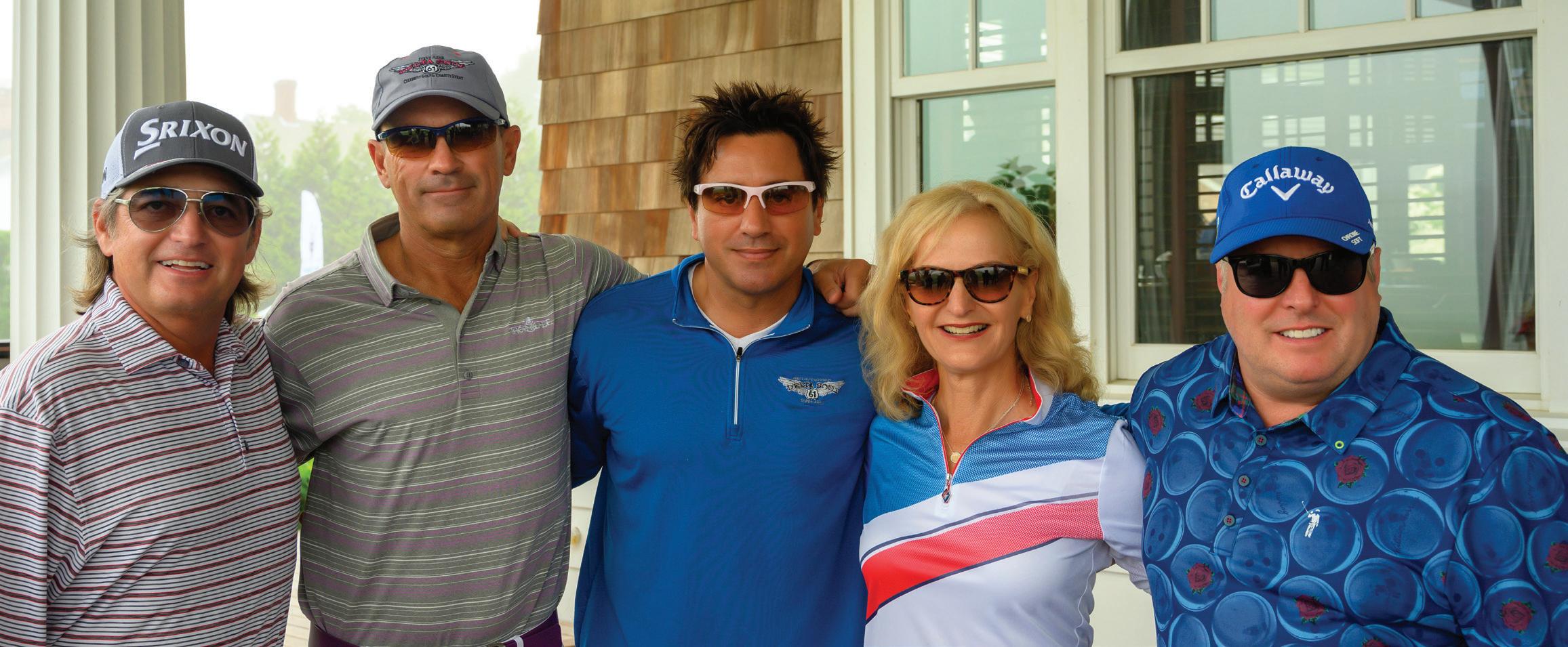
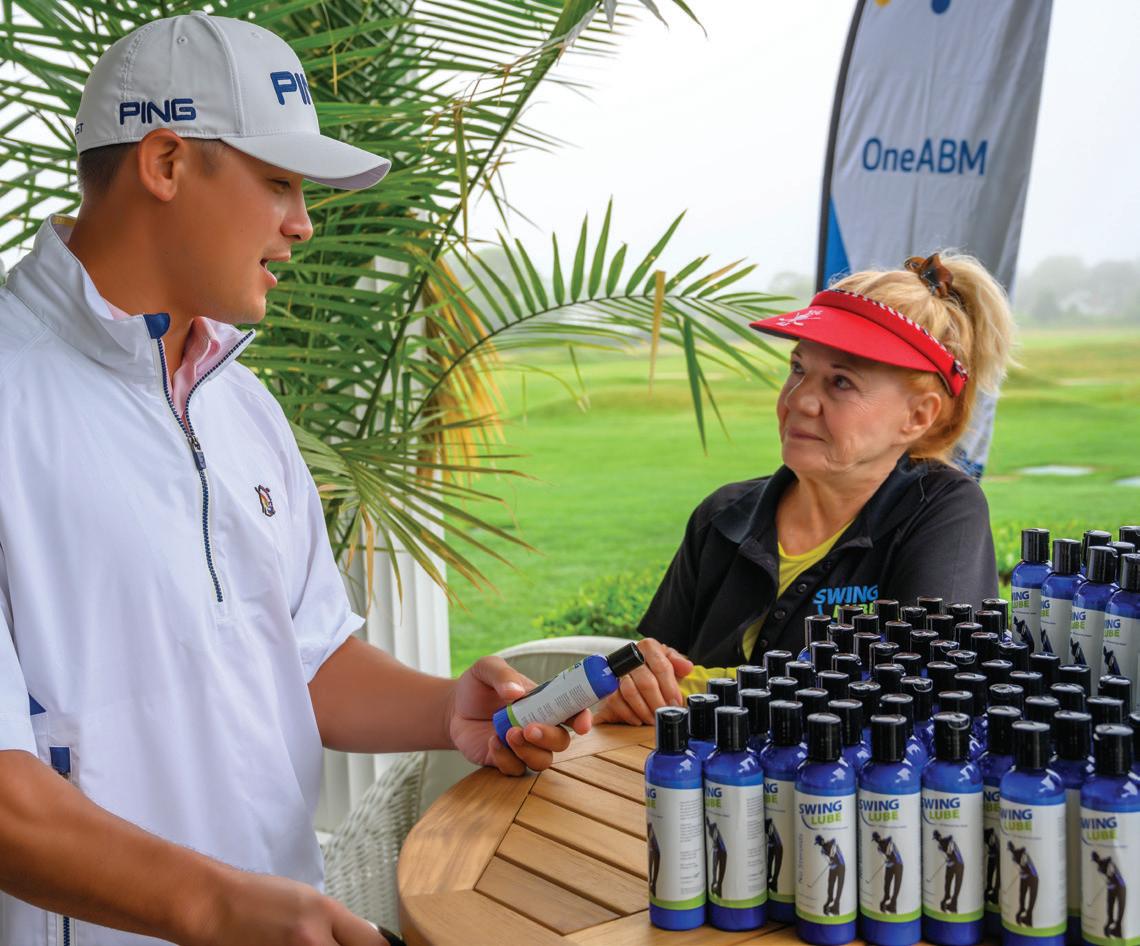

 Former Yankees catcher Rick Cerone & Scott Vallary, committee member.
Steve Woodward, winner, closest to the pin.
Dani Ezelle and Phyllis Burzee, Swing Lube.
(Left to right) Kenwood Gaines, Tommy Foster, sponsor, Steve Azar, Music Honoree, Ann Liguori, Host, Gary Valentine, actor/comedian.
Former Yankees catcher Rick Cerone & Scott Vallary, committee member.
Steve Woodward, winner, closest to the pin.
Dani Ezelle and Phyllis Burzee, Swing Lube.
(Left to right) Kenwood Gaines, Tommy Foster, sponsor, Steve Azar, Music Honoree, Ann Liguori, Host, Gary Valentine, actor/comedian.

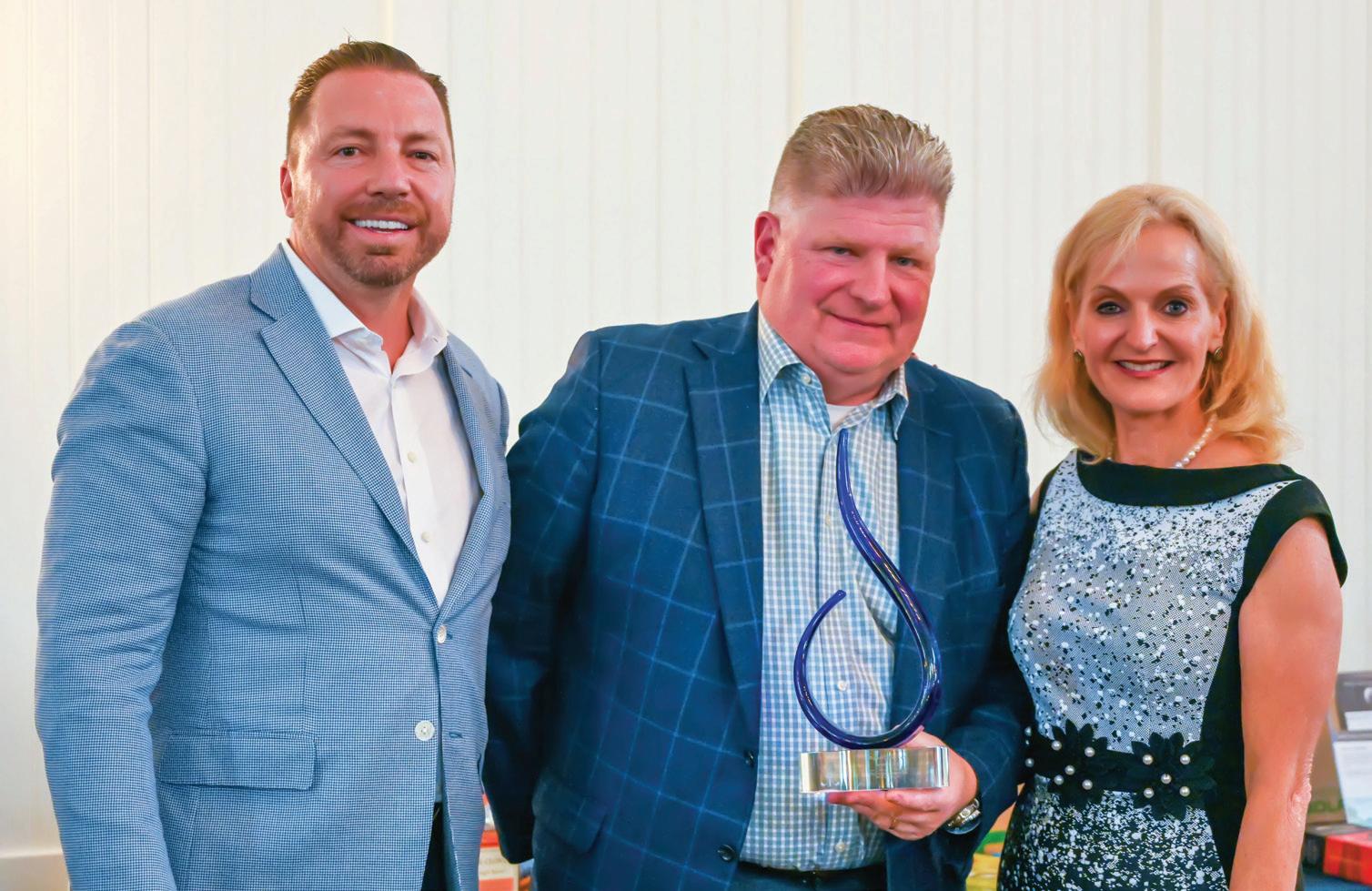
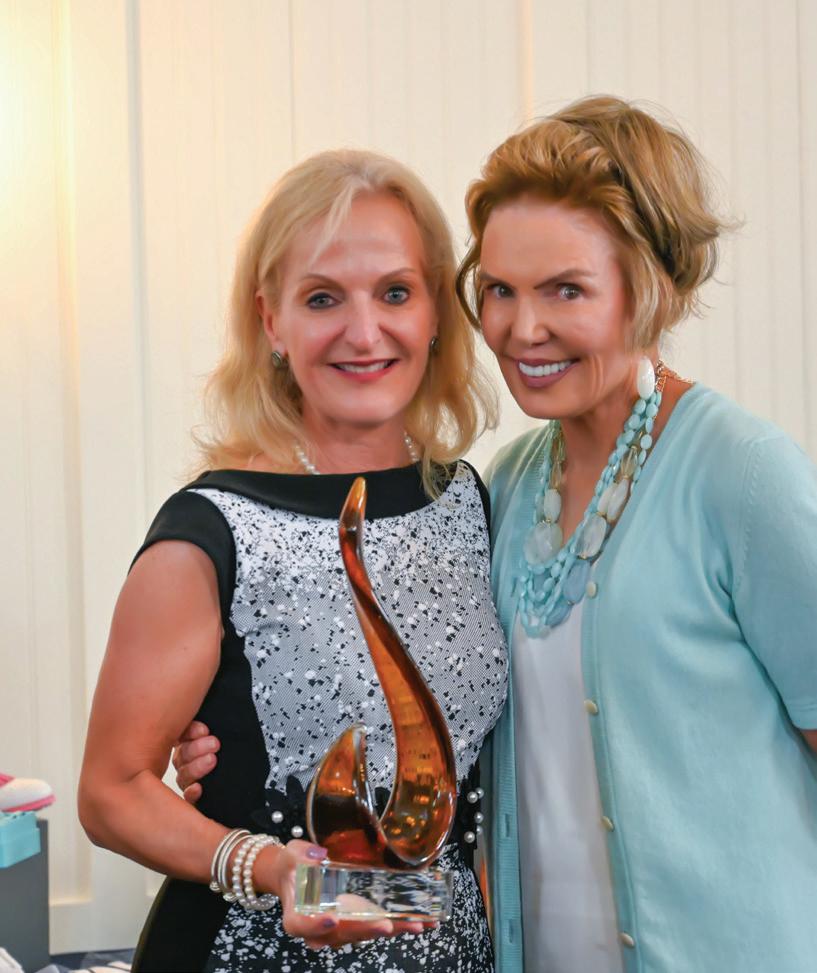

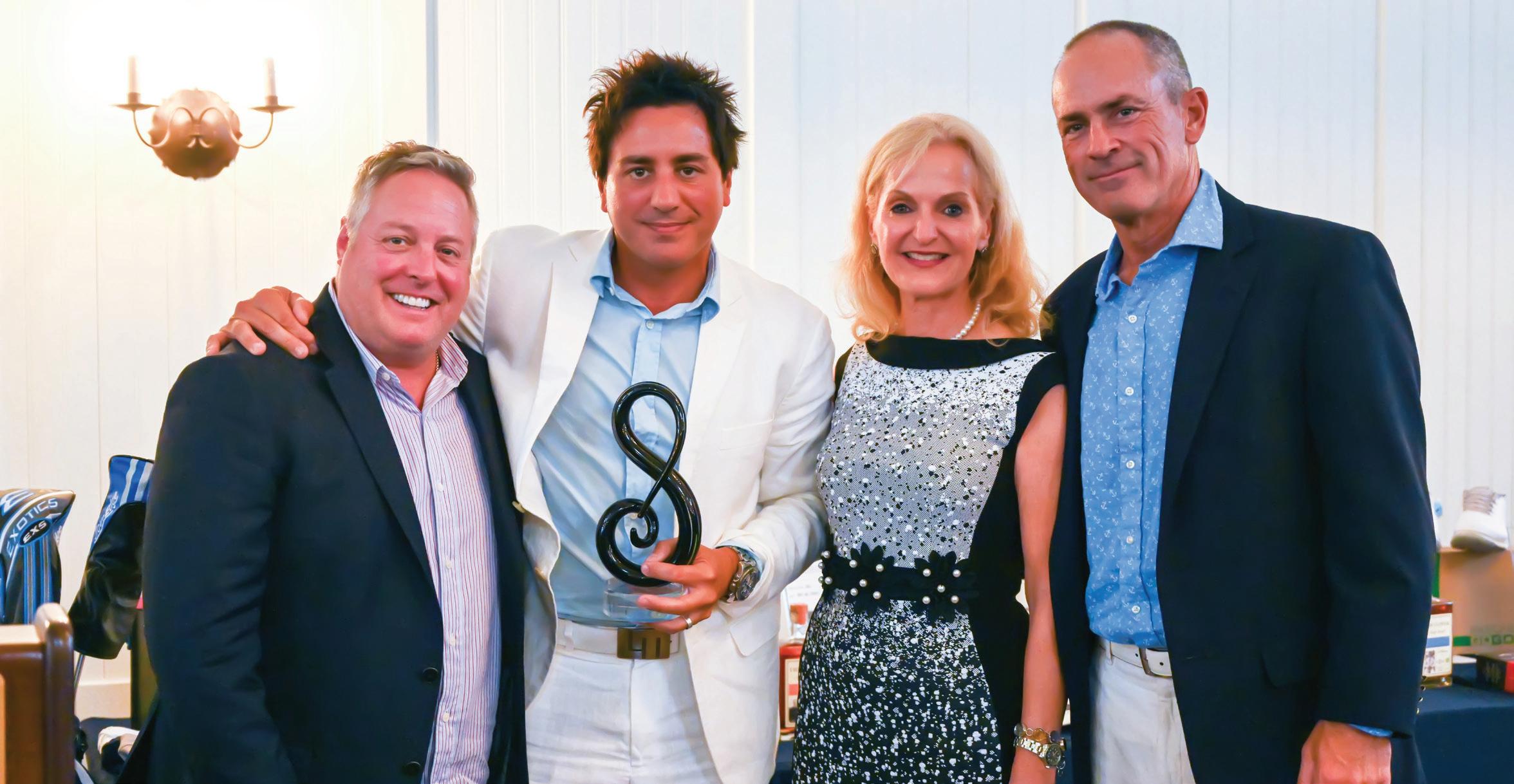 East Long Island Salmon, with Beets and Walnuts.
Beef Filet and Roasted Swordfish with a Basil Crust.
(Left to right) Gary Valentine, actor/comedian, Steve Azar, Music Honoree, Ann Liguori, Host, and Tom Foster, Sponsor.
(Left to right) Jim Halpin, Board Member, Business Honoree Robert Bicocchi, Senior Property Manager with CBRE and Ann
Ann Liguori & Lesley Visser, Sports Legend
East Long Island Salmon, with Beets and Walnuts.
Beef Filet and Roasted Swordfish with a Basil Crust.
(Left to right) Gary Valentine, actor/comedian, Steve Azar, Music Honoree, Ann Liguori, Host, and Tom Foster, Sponsor.
(Left to right) Jim Halpin, Board Member, Business Honoree Robert Bicocchi, Senior Property Manager with CBRE and Ann
Ann Liguori & Lesley Visser, Sports Legend


® #WEARYOURTRAVELS EXPERIENTIAL JEWELRY ® HANDMADE WITH SAND & NATURAL ELEMENTS FROM AROUND THE WORLD. Discover The Hamptons Rope Collection, a creative collaboration between Ann Liguori & Dune Jewelry
Clubhouse Cocktails
THE WESTHAMPTON
Ingredients
• 1.5 ounces Stoli-Orange Vodka
• 1 ounce Pomegranate Juice (substituteCranberry)
• Splash of Nelli & Joe’s Key West Lime Juice
• Club Soda
• Lime Twist
Preparation
Shake the vodka and lime juice in a shaker glass with ice.
Fill a rocks glass with ice and pour in the pomegranate juice.
Gently pour the vodka and lime juice over the ice to create a layered look.

Top with a splash of club soda.
Garnish with the lime twist.
Note: It’s a simple drink, but a fan favorite.
Golf Kitchen Magazine
124
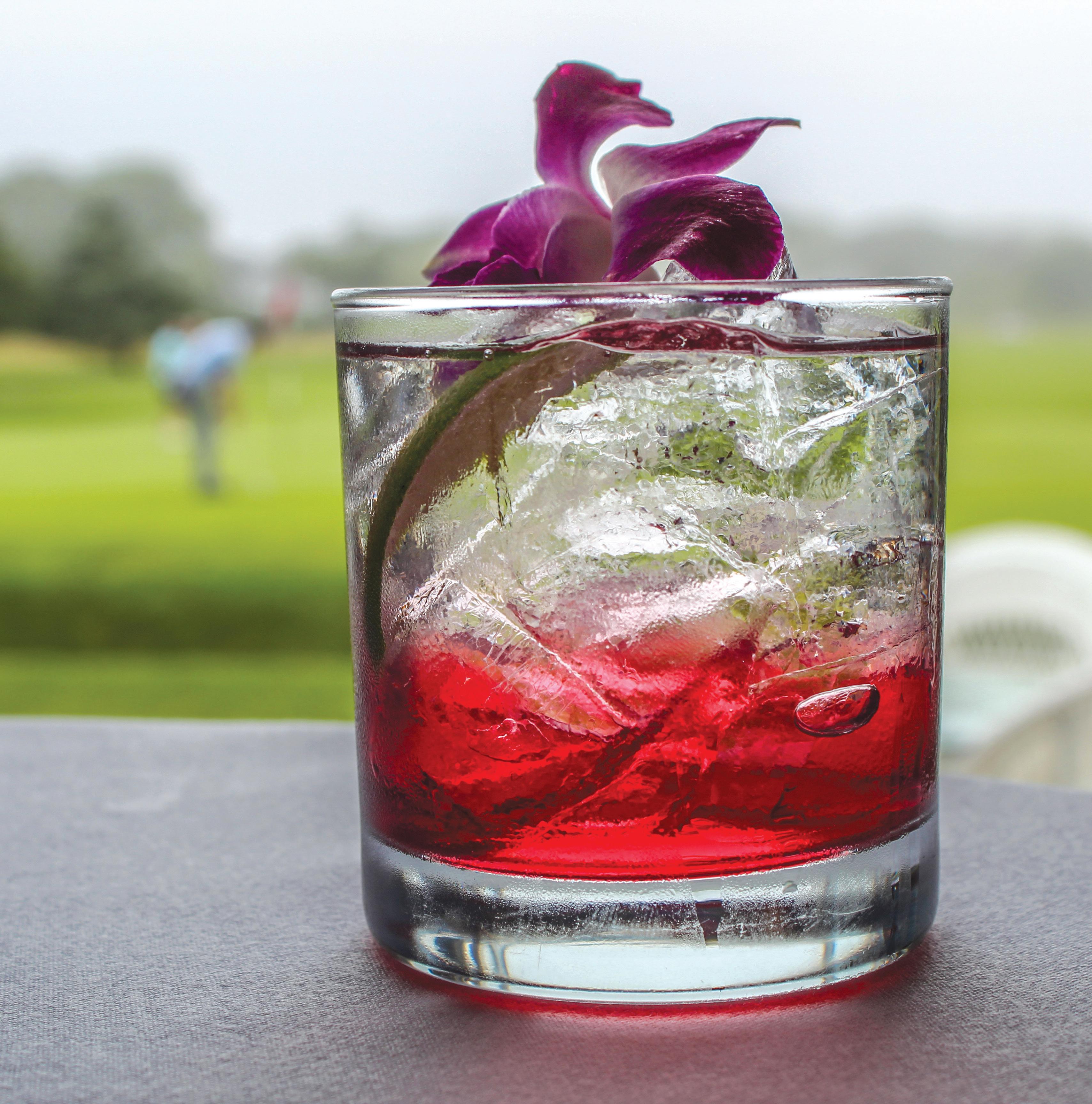

THE GREENBRIER MINT JULEP
Ingredients
Serves 1.
Mint Julep
• 4-5 Mint Leaves
• 1½ oz. Simple Syrup (or 3 sugar cubes)
• 2 oz. Maker’s Mark Bourbon
• 1 cup Ice (crushed)
• 1 sprig Mint
Preparation
In a traditional Mint Julep silver cup or rocks glass, gently muddle 4-5 fresh mint leaves with simple syrup (or 3 sugar cubes) just until the leaves are slightly bruised.
Add the Maker’s Mark Bourbon and stir.
Assembly
Fill the silver cup or rocks glass with crushed ice overflowing the top of the cup.
Garnish with a fresh mint sprig and serve with a straw. (Amount of sugar can be adjusted according to desired sweetness.)
MAGAZINE
Clubhouse Cocktails 127
THE FIFTH ELEMENT OF TASTE: UMAMI
 by Natalia F. Cabrera Founder and CEO Khayyan Specialty Foods
by Natalia F. Cabrera Founder and CEO Khayyan Specialty Foods
Imagine a taste that when played in balance with salty, sweet, sour, and bitter, work harmoniously to bring the height of flavor and pleasure out of a dish. The fifth element of taste has created a breakthrough for chefs, food manufacturers and health professionals alike: umami. While still a relatively new discovery in the new culinary world, its usage in numerous cuisines, notably through the use of sea vegetables such as sea spaghetti (Himanthalia Elongata) and phytoplankton (Nannochloropsis Gaditana), highlight why umami translates to: “deliciousness”.


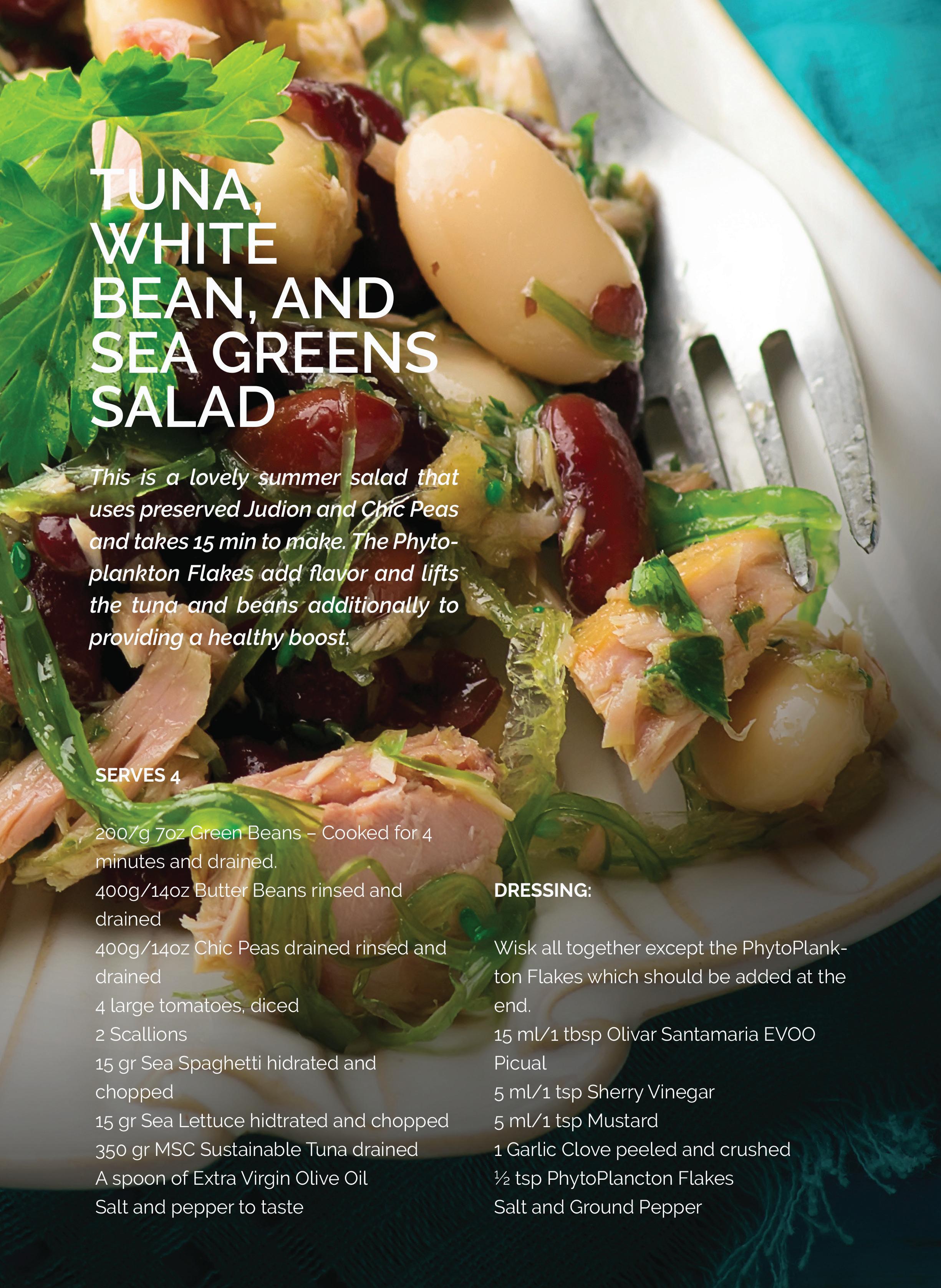
From the Atlantic Ocean off the Galician Coast, Sea Spaghetti and Sea Lettuce are a versatile sea vegetable with robust texture and medium density. Hand harvested in its natural environment, dehydrated at low temperatures, cut and packed to retain all of its nutritional values.
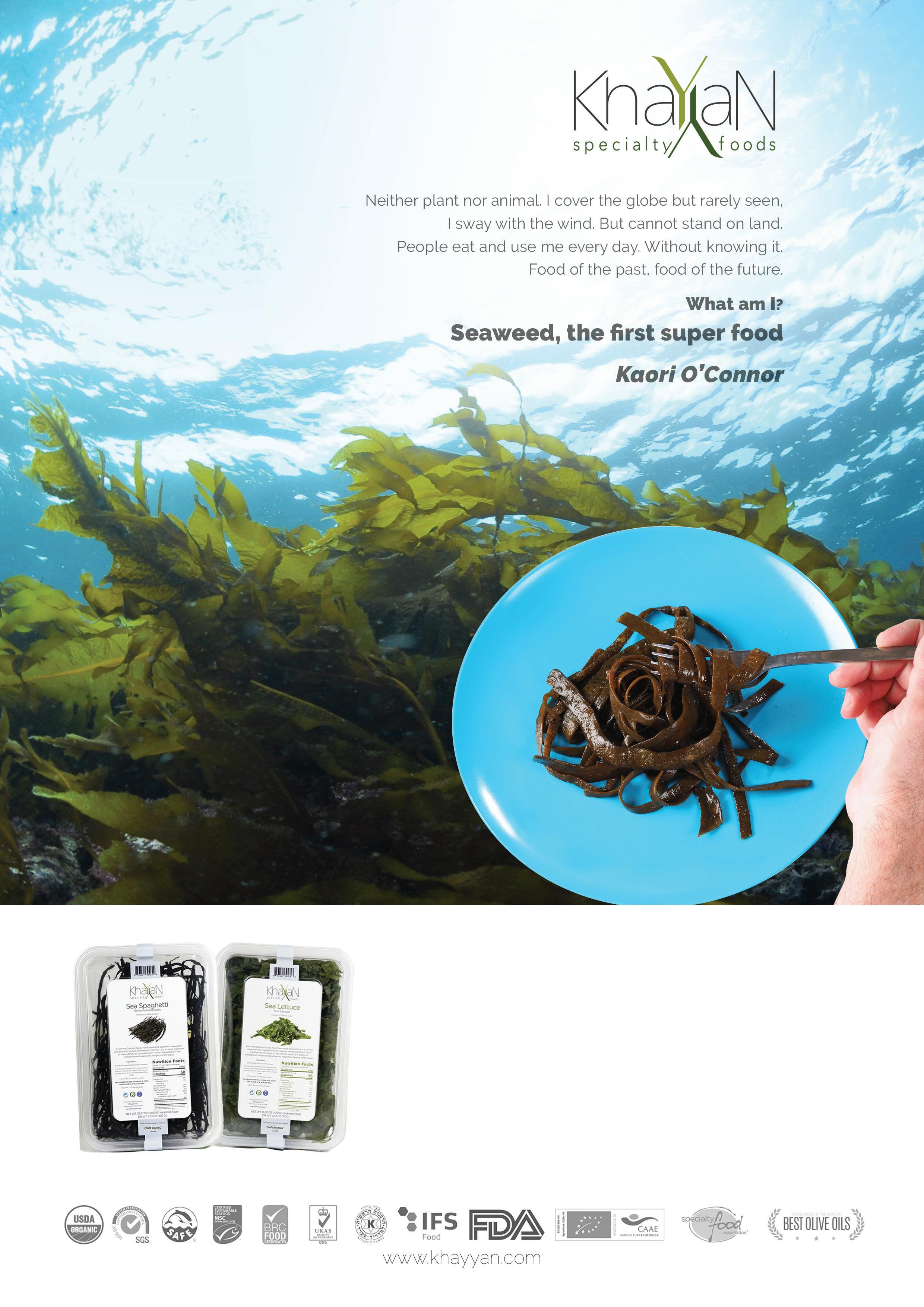
SIMPLY UMAMI
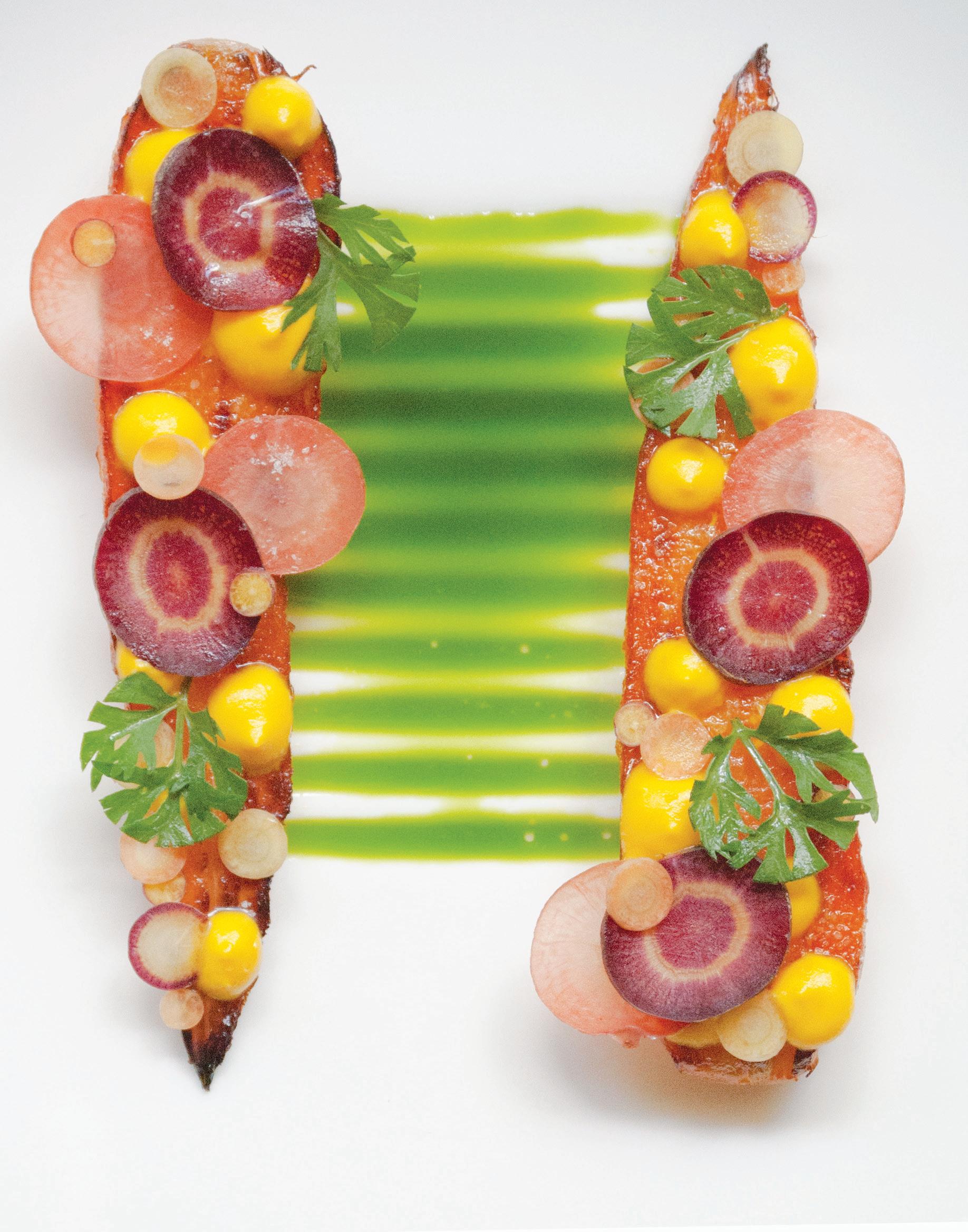
INFO@GOLFKITCHEN.COM
GOLF KITCHEN PHOTOGRAPHY











































 Photographer at the Ann Liguori Foundation Charity Golf Classic.
Photographer at the Ann Liguori Foundation Charity Golf Classic.




 Back view of the clubhouse from the 18th hole with a Blue Heron at sunrise.
Image by Stephanie Starr
Back view of the clubhouse from the 18th hole with a Blue Heron at sunrise.
Image by Stephanie Starr




 Left to right: Head Chef Harrison Runyon, Head Chef Michael Mueller CEC and Director of Culinary Operations, Scott Haegele.
Left to right: Head Chef Harrison Runyon, Head Chef Michael Mueller CEC and Director of Culinary Operations, Scott Haegele.










 The outdoor bar area of the Restaurant at Sixteen Hundred overlooking the 18th hole at the Cypress Course.
Image by Stephanie Starr
The outdoor bar area of the Restaurant at Sixteen Hundred overlooking the 18th hole at the Cypress Course.
Image by Stephanie Starr
 RECIPE BY SCOTT HAEGELE
RECIPE BY SCOTT HAEGELE

 A frame from one of the Sebonack bee colonies.
Image by Diana DeLucia
A frame from one of the Sebonack bee colonies.
Image by Diana DeLucia

 One of the first jars of Sebonack honey in 2014.
Image by Diana DeLucia
One of the first jars of Sebonack honey in 2014.
Image by Diana DeLucia
 John Carson inspects a frame from one of the Sebonack hives.
Image by Michael J. Fiedler
John Carson inspects a frame from one of the Sebonack hives.
Image by Michael J. Fiedler



 Honey bees returning to the hive.
Honey bees returning to the hive.

 The Sebonack clubhouse.
The Sebonack clubhouse.



 The stunning GlenArbor Clubhouse.
The stunning GlenArbor Clubhouse.





 The floationg green at GlenArbor Golf Club.
The floationg green at GlenArbor Golf Club.







 RECIPE BY MICHAEL RUGGIERO
RECIPE BY MICHAEL RUGGIERO

 BY BILL NESTOR
BY BILL NESTOR



 Director of Golf, John T. McIntyre gives well earned praise for grounds staff before the Golf Kitchen Cup begins.
Chef Marcelo Pereyra, Coronel Pringles Restaurant Owner, Argentina, (left) is bested by Chef Jose Carles Fabregas, Chef/ Owner of Downtown Boqueron, Puerto Rico.
Director of Golf, John T. McIntyre gives well earned praise for grounds staff before the Golf Kitchen Cup begins.
Chef Marcelo Pereyra, Coronel Pringles Restaurant Owner, Argentina, (left) is bested by Chef Jose Carles Fabregas, Chef/ Owner of Downtown Boqueron, Puerto Rico.






 The winners of the 2019 Golf Kitchen Cup at Punta Mita, (left to right) Ricardo Trueba, Mario Alonso, Ricardo Trueba Jnr. and Jansoulet Alonso.
Chef Yasuo Asai.
Chef Bertha Alicia Barajas.
The winners of the 2019 Golf Kitchen Cup at Punta Mita, (left to right) Ricardo Trueba, Mario Alonso, Ricardo Trueba Jnr. and Jansoulet Alonso.
Chef Yasuo Asai.
Chef Bertha Alicia Barajas.









 (Left to right) Rana Que and Chef Gaston Yelicich at Sufi.
Guests enjoy the dinner at Sufi.
Chef Blake Burgard.
Ricardo Trueba Jnr. winner of The Golf Kitchen Cup, 2019.
Chef Pato Persico and Diana DeLucia.
Left to right: Chef Ricki Motto, Chef Marcelo Pereyra and Andrea Perez, Nicolas Kovalenko, Delfina Pereyra, Chef Yasuo Asai, Chef Jose Carles, Magda Toro and Chef Pato Persico at Sufi.
(Left to right) Rana Que and Chef Gaston Yelicich at Sufi.
Guests enjoy the dinner at Sufi.
Chef Blake Burgard.
Ricardo Trueba Jnr. winner of The Golf Kitchen Cup, 2019.
Chef Pato Persico and Diana DeLucia.
Left to right: Chef Ricki Motto, Chef Marcelo Pereyra and Andrea Perez, Nicolas Kovalenko, Delfina Pereyra, Chef Yasuo Asai, Chef Jose Carles, Magda Toro and Chef Pato Persico at Sufi.





 Chef Marcelo Pereyra and Chef Lalo Palazulez at Kupuri Beach Club.
Chef Lalo Palazuelez. Amy Everett and Chef Erin Royer
Chef TonyVillanueva and Evelyn Villanueva.
Chef Ricki Motta and Nicolas Kovalenko.
Magda Toro enjoys the luncheon on day two of The Golf Kitchen Cup.
Chef Marcelo Pereyra and Chef Lalo Palazulez at Kupuri Beach Club.
Chef Lalo Palazuelez. Amy Everett and Chef Erin Royer
Chef TonyVillanueva and Evelyn Villanueva.
Chef Ricki Motta and Nicolas Kovalenko.
Magda Toro enjoys the luncheon on day two of The Golf Kitchen Cup.







 Chef Tony Villanueva.
Chef Yasuo Asai.
Chef Ivan Villanueva.
Chef Michael Ruggiero.
Chef Doug Blair. Joseph Klages.
Chef Gaston Yelicich.
Chef Marcelo Pereya.
Chef Tony Villanueva.
Chef Yasuo Asai.
Chef Ivan Villanueva.
Chef Michael Ruggiero.
Chef Doug Blair. Joseph Klages.
Chef Gaston Yelicich.
Chef Marcelo Pereya.






 Chefs celebrate at the opening dinner.
Nancy and Clarke Connor enjoy a dance with the Punta Mita band.
Chef Damian Gilchrist.
Chefs pose for photographers at the opening dinner. Chef Michael Ruggiero.
(Left to right) Chef Joseph Klages, Bill Nestor and Chef Anthony Giacoponello.
(Left to right) Chef Anthony Giacoponello, Diana DeLucia and Chef Doug Blair.
Chefs celebrate at the opening dinner.
Nancy and Clarke Connor enjoy a dance with the Punta Mita band.
Chef Damian Gilchrist.
Chefs pose for photographers at the opening dinner. Chef Michael Ruggiero.
(Left to right) Chef Joseph Klages, Bill Nestor and Chef Anthony Giacoponello.
(Left to right) Chef Anthony Giacoponello, Diana DeLucia and Chef Doug Blair.






 (Left to right) Bill Nestor with Chef Marcelo Pereyra.
Donna Smith on the tee box at The Tale of the Whale.
Residents Dermott and Martina O’Flanagan, 2018 defending champions.
John T. McIntyre, Director of Golf at Punta Mita.
Ricardo Trueba Jnr. eleven year old winner of The Golf Kitchen Cup, 2019.
(Left to right) Chef Jorge Gonzalez and Chef Tony Villanueva take a selfie.
(Left to right) Bill Nestor with Chef Marcelo Pereyra.
Donna Smith on the tee box at The Tale of the Whale.
Residents Dermott and Martina O’Flanagan, 2018 defending champions.
John T. McIntyre, Director of Golf at Punta Mita.
Ricardo Trueba Jnr. eleven year old winner of The Golf Kitchen Cup, 2019.
(Left to right) Chef Jorge Gonzalez and Chef Tony Villanueva take a selfie.






 (Left to right: Residents Nancy and Clare Connor and guest.
Members and guests pose for the cameras during play.
Nothing like a great bunker shot!
(Left to right) John T. McIntrye and Tom Stickney II, Director of Instruction at Punta Mita Golf.
Chef Blake Burgard and Chef Michael Ruggiero.
Young golfers enjoying the day.
Chef Jared Ashton.
(Left to right: Residents Nancy and Clare Connor and guest.
Members and guests pose for the cameras during play.
Nothing like a great bunker shot!
(Left to right) John T. McIntrye and Tom Stickney II, Director of Instruction at Punta Mita Golf.
Chef Blake Burgard and Chef Michael Ruggiero.
Young golfers enjoying the day.
Chef Jared Ashton.



 Looking back at the clubhouse from 18 East green. Image by Gary Lisbon.
Looking back at the clubhouse from 18 East green. Image by Gary Lisbon.












 RECIPE BY ANTHONY DOLE
RECIPE BY ANTHONY DOLE

 An aerial view of 2 East. Image by Gary Lisbon.
An aerial view of 2 East. Image by Gary Lisbon.






 Volunteer, Ron Goerke
Volunteer, Ron Goerke





 Crab Cakes with first of the season Michigan Corn, Featherston Garden Micro Flowers.
Chef Joe VanWagner.
Prime Beef Tenderloin Filet, Barbeque Shrimp, Handmade Lobster Ravioli, Braised Greens, Shrimp
(Left to right) Hosts Scott Vallary, Ann Liguori, Coleen and Tom Corcoran.
Host Ann Liguori.
Crab Cakes with first of the season Michigan Corn, Featherston Garden Micro Flowers.
Chef Joe VanWagner.
Prime Beef Tenderloin Filet, Barbeque Shrimp, Handmade Lobster Ravioli, Braised Greens, Shrimp
(Left to right) Hosts Scott Vallary, Ann Liguori, Coleen and Tom Corcoran.
Host Ann Liguori.

 (Left to right) Steve Skidgel, Jean Skidgel, Host Ann Liguori, Scott Vallary and Dan Liguori.
(Left to right) Michael Fiedler,Jane Hansen and Alan Kalter.
(Left to right) Steve Skidgel, Jean Skidgel, Host Ann Liguori, Scott Vallary and Dan Liguori.
(Left to right) Michael Fiedler,Jane Hansen and Alan Kalter.





 Gianna Rojas, one-armed golfer.
Volunteers, Coleen Corcoran and Pat Vallary.
Marty Hackel, Mr. Style formerly of Golf Digest.
(Left to right) Jean Skidgel, Tournament Coordinator, Kelly Burke-McMillin, Diane Lenowicz, Diane Schimmer, Coleen Corcoran, Elsie Boskamp, Lexi Plummer, on table - Ann Liguori.
Nicholas Feaser, PeakVision and Sean Edwards. Every golfer got fitted for a pair of PeakVision Sunglasses.
Kelly Burke-McMillin, committee member.
Gianna Rojas, one-armed golfer.
Volunteers, Coleen Corcoran and Pat Vallary.
Marty Hackel, Mr. Style formerly of Golf Digest.
(Left to right) Jean Skidgel, Tournament Coordinator, Kelly Burke-McMillin, Diane Lenowicz, Diane Schimmer, Coleen Corcoran, Elsie Boskamp, Lexi Plummer, on table - Ann Liguori.
Nicholas Feaser, PeakVision and Sean Edwards. Every golfer got fitted for a pair of PeakVision Sunglasses.
Kelly Burke-McMillin, committee member.



 Former Yankees catcher Rick Cerone & Scott Vallary, committee member.
Steve Woodward, winner, closest to the pin.
Dani Ezelle and Phyllis Burzee, Swing Lube.
(Left to right) Kenwood Gaines, Tommy Foster, sponsor, Steve Azar, Music Honoree, Ann Liguori, Host, Gary Valentine, actor/comedian.
Former Yankees catcher Rick Cerone & Scott Vallary, committee member.
Steve Woodward, winner, closest to the pin.
Dani Ezelle and Phyllis Burzee, Swing Lube.
(Left to right) Kenwood Gaines, Tommy Foster, sponsor, Steve Azar, Music Honoree, Ann Liguori, Host, Gary Valentine, actor/comedian.




 East Long Island Salmon, with Beets and Walnuts.
Beef Filet and Roasted Swordfish with a Basil Crust.
(Left to right) Gary Valentine, actor/comedian, Steve Azar, Music Honoree, Ann Liguori, Host, and Tom Foster, Sponsor.
(Left to right) Jim Halpin, Board Member, Business Honoree Robert Bicocchi, Senior Property Manager with CBRE and Ann
Ann Liguori & Lesley Visser, Sports Legend
East Long Island Salmon, with Beets and Walnuts.
Beef Filet and Roasted Swordfish with a Basil Crust.
(Left to right) Gary Valentine, actor/comedian, Steve Azar, Music Honoree, Ann Liguori, Host, and Tom Foster, Sponsor.
(Left to right) Jim Halpin, Board Member, Business Honoree Robert Bicocchi, Senior Property Manager with CBRE and Ann
Ann Liguori & Lesley Visser, Sports Legend



 by Natalia F. Cabrera Founder and CEO Khayyan Specialty Foods
by Natalia F. Cabrera Founder and CEO Khayyan Specialty Foods




